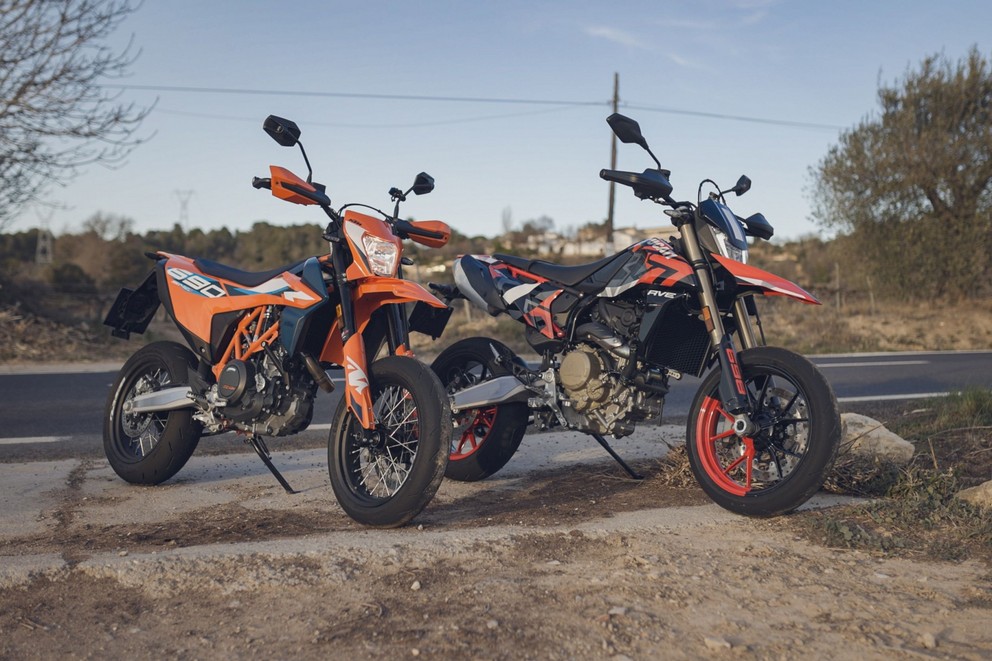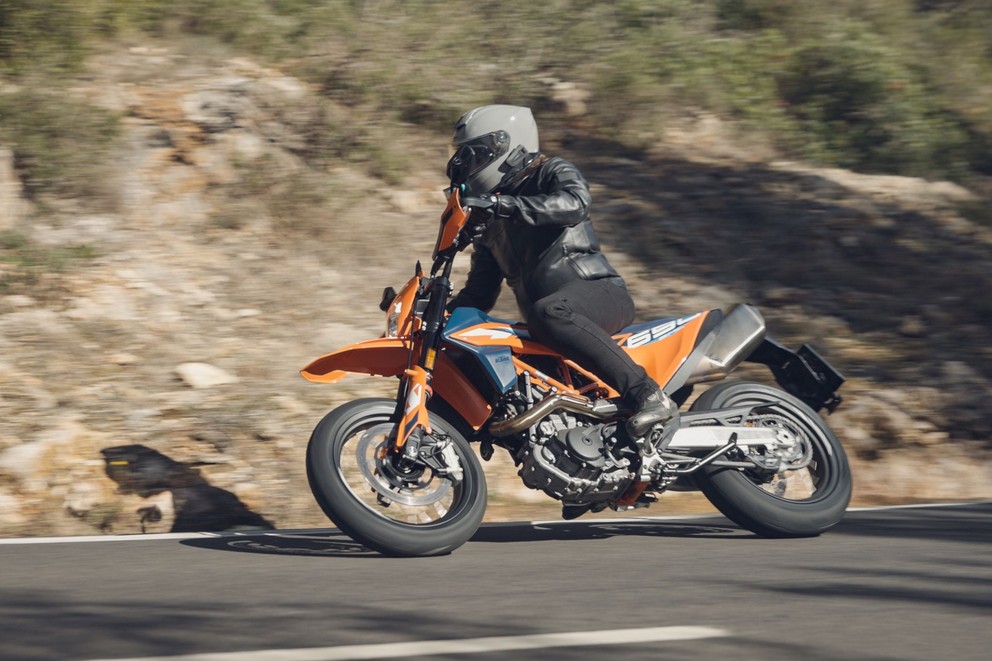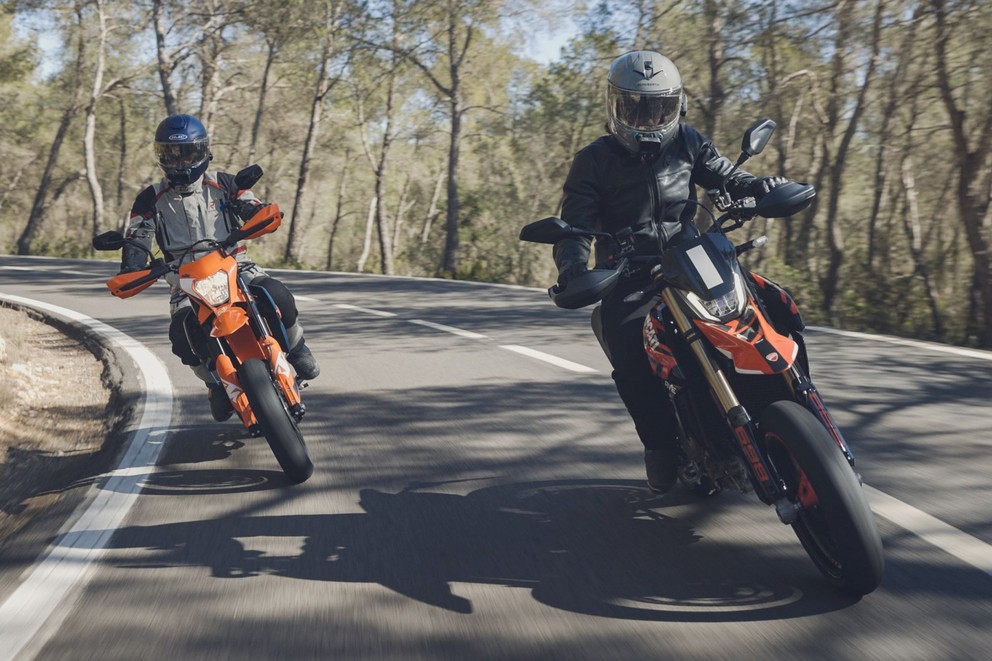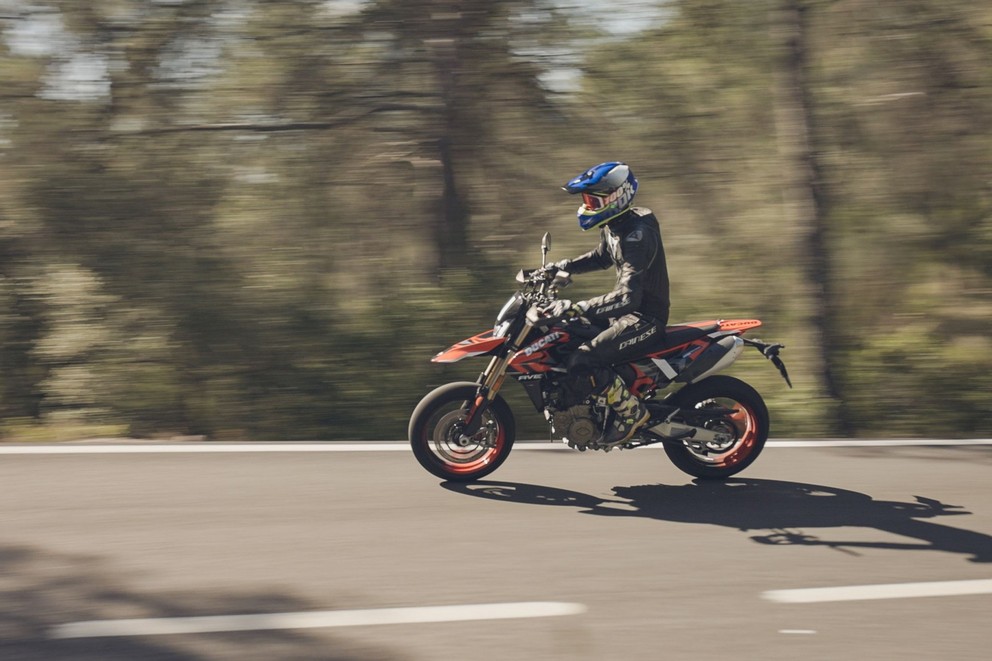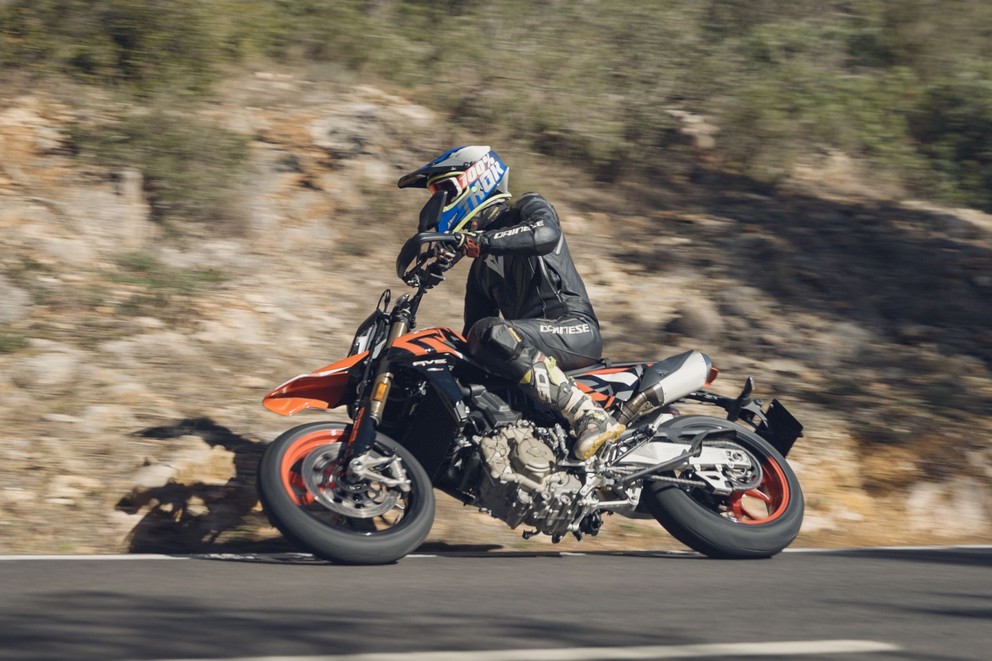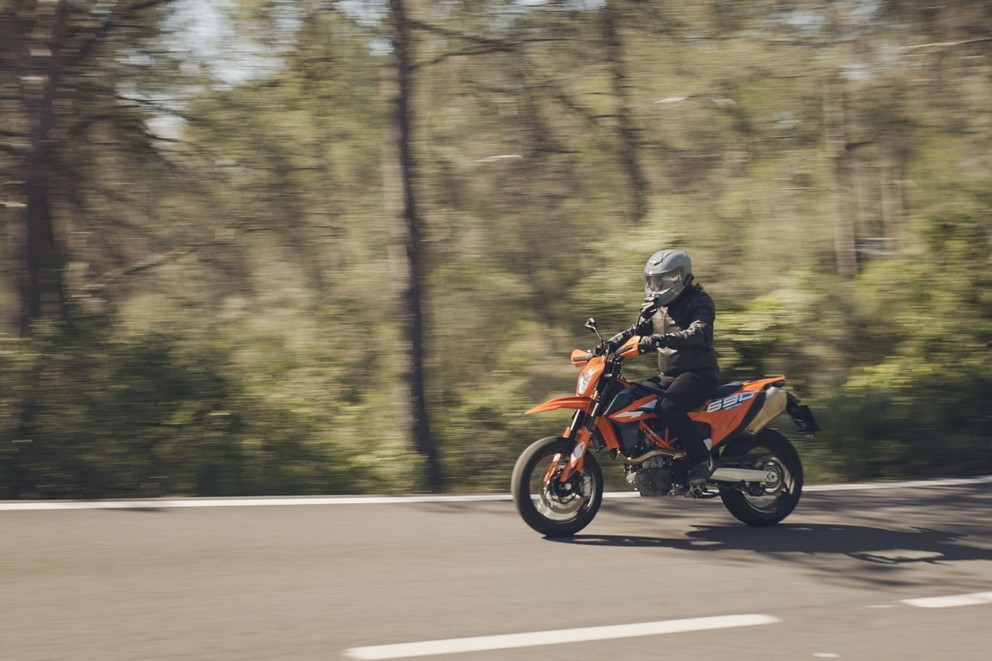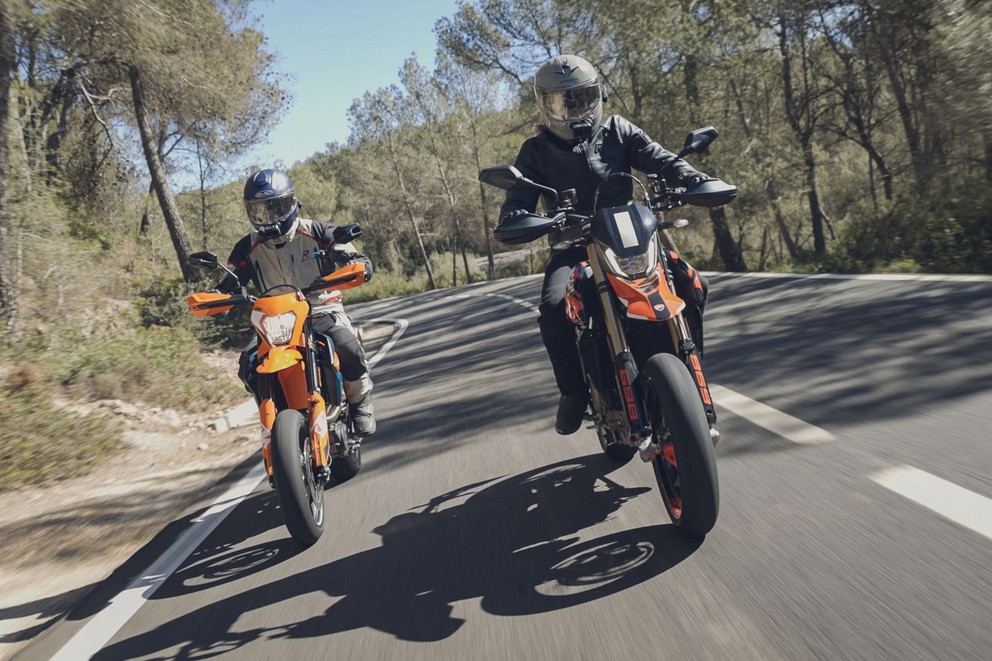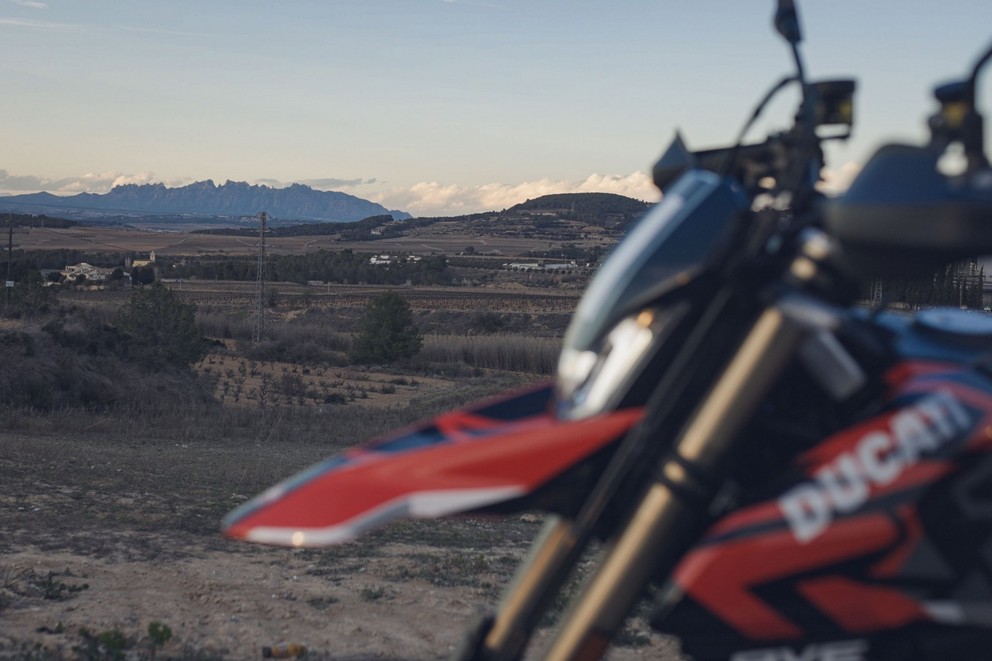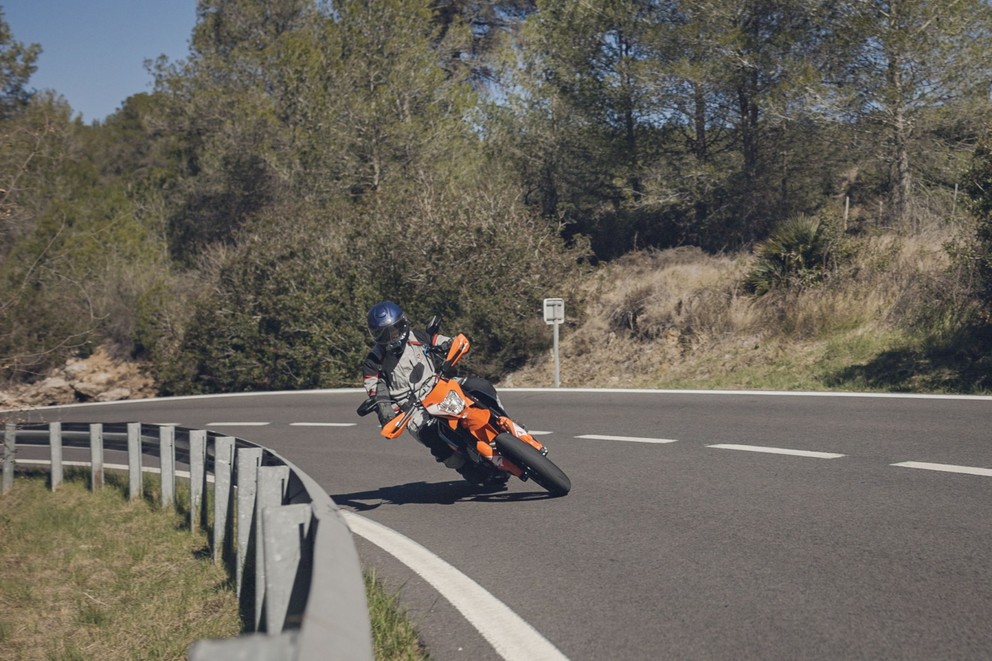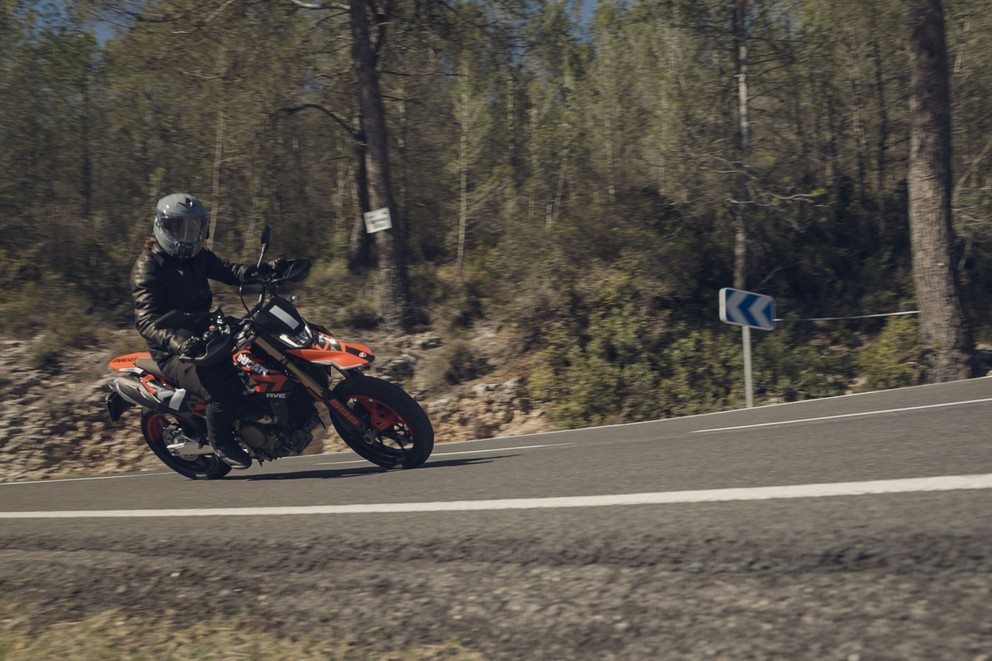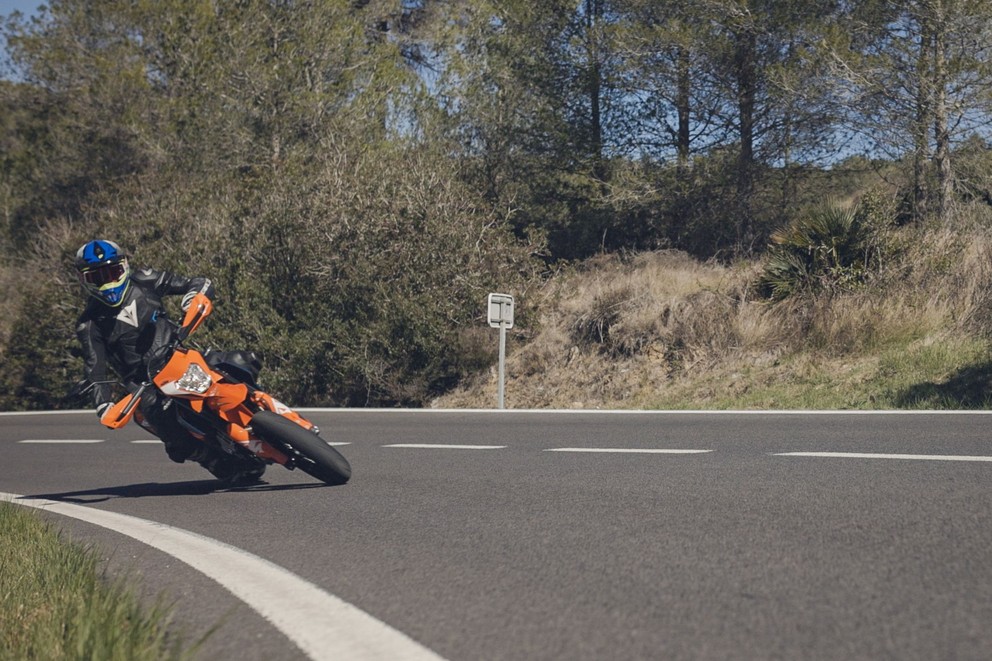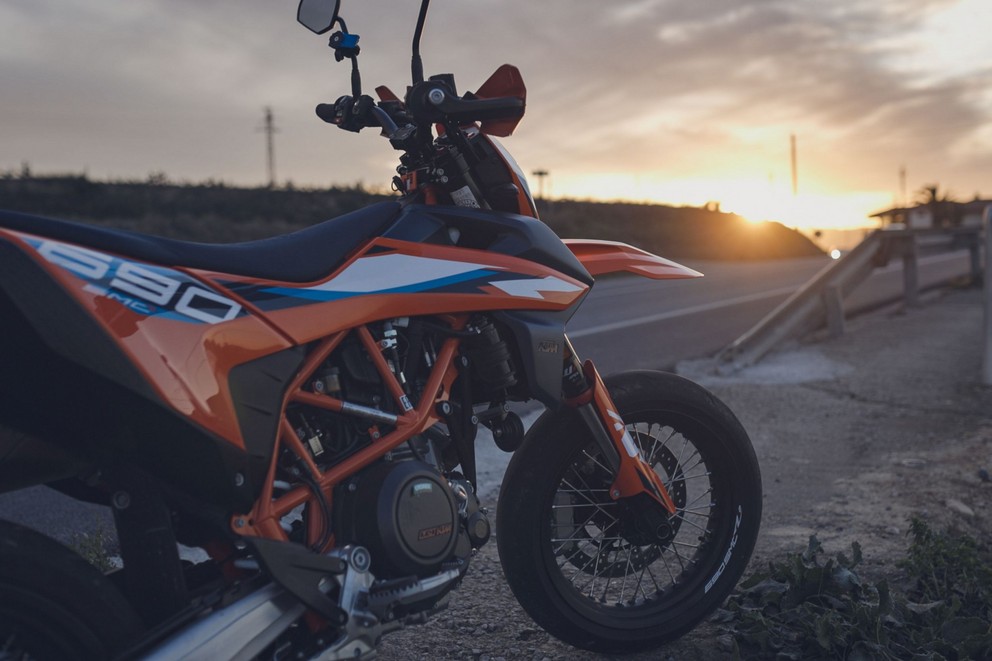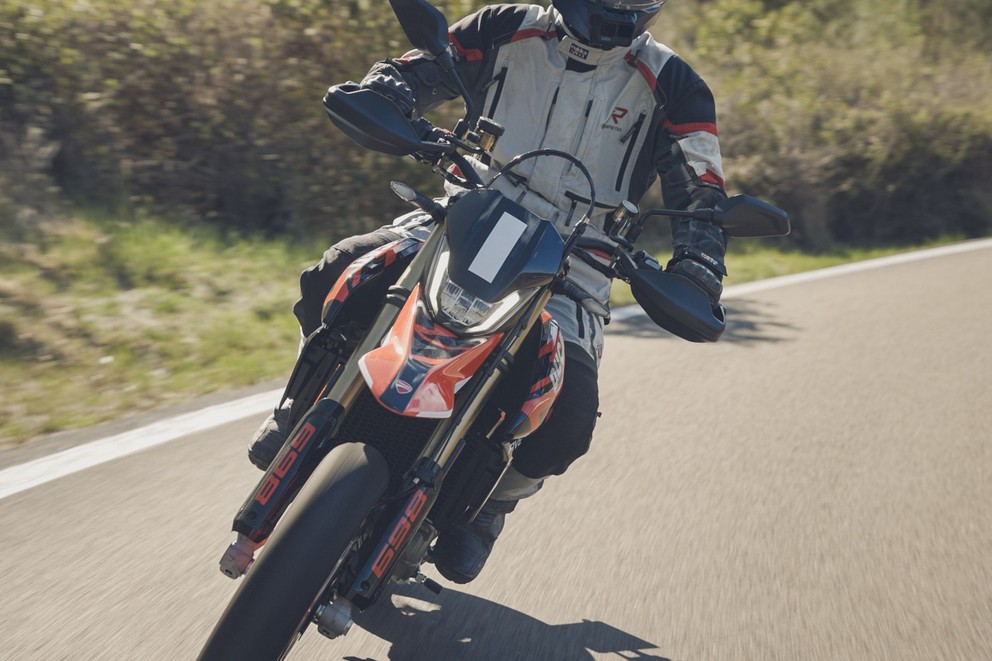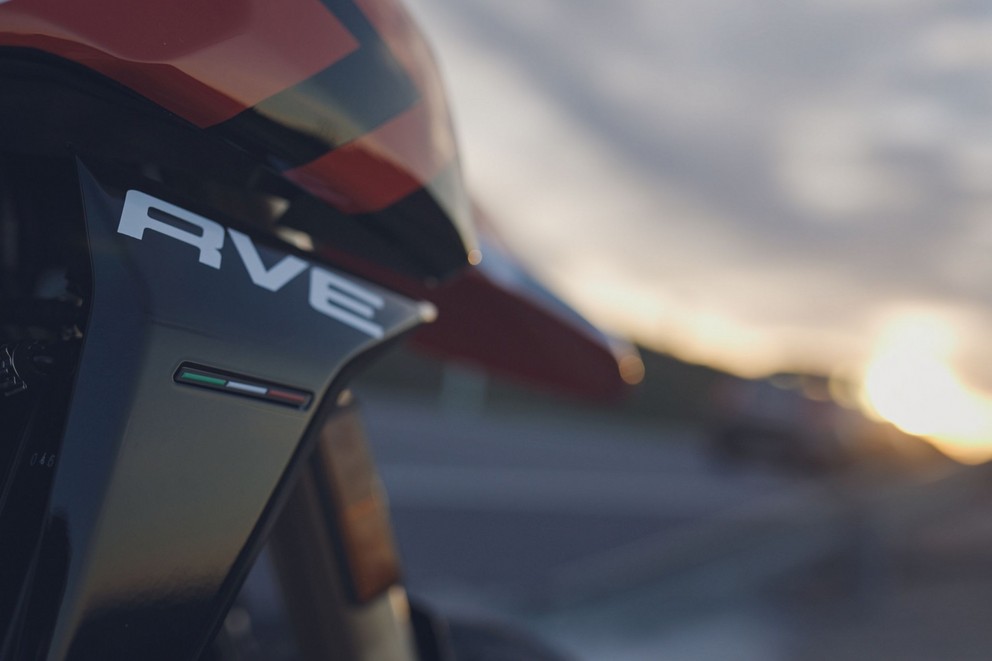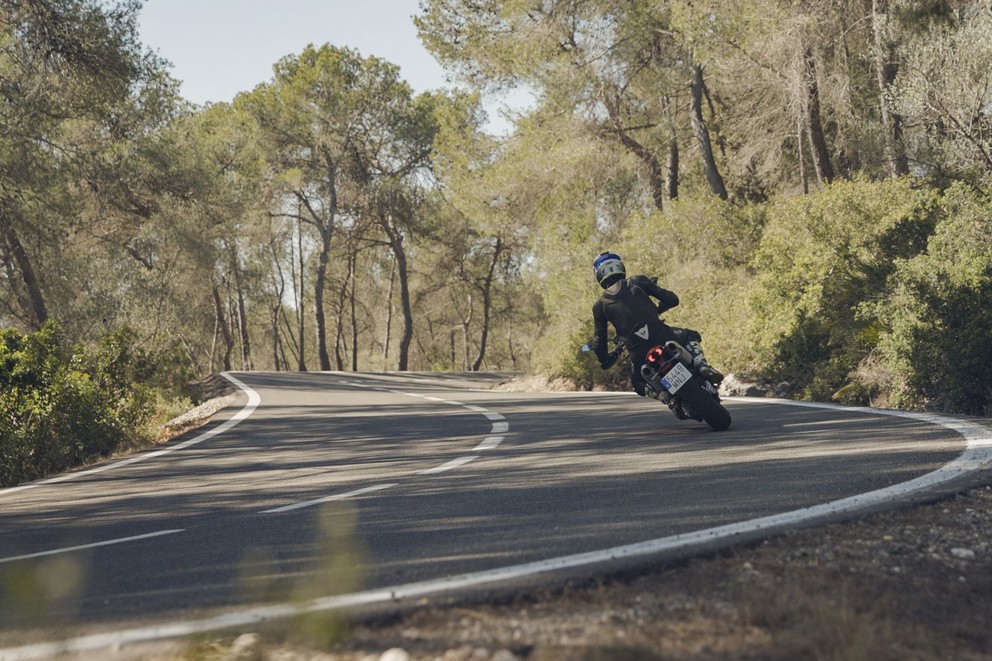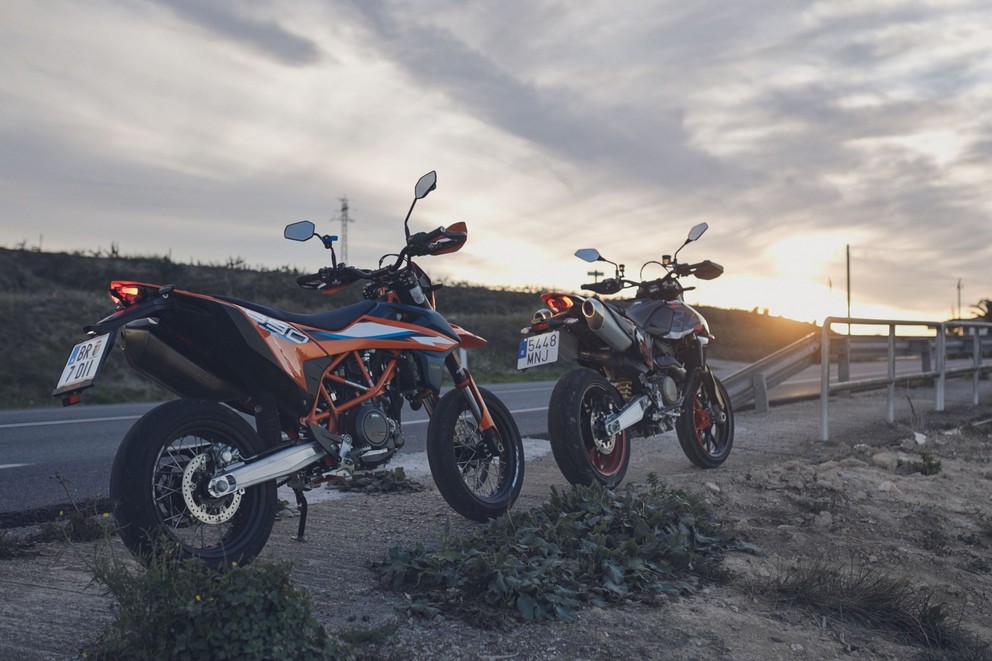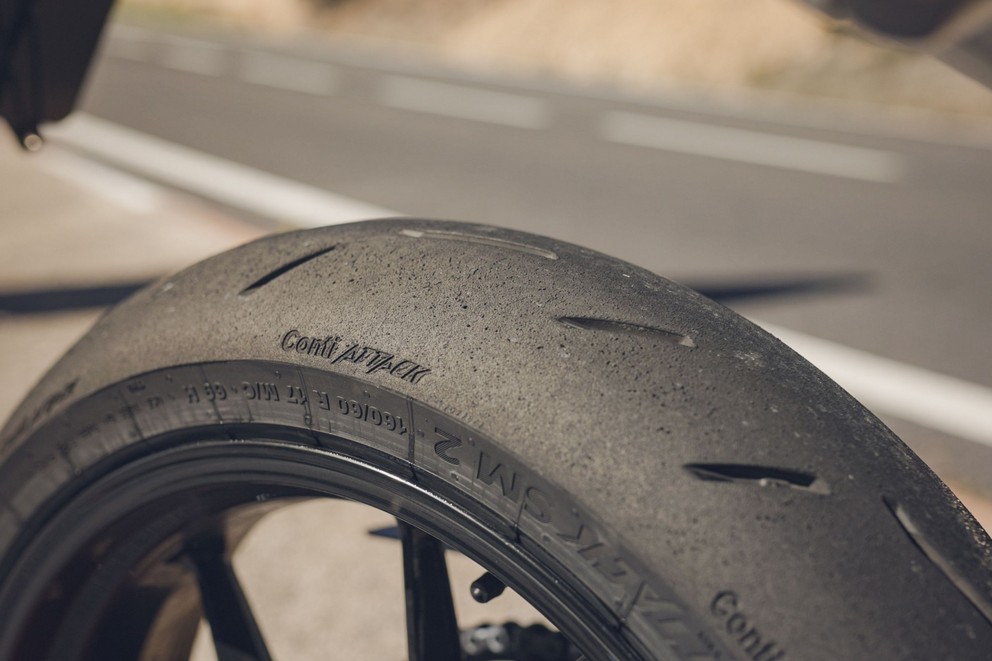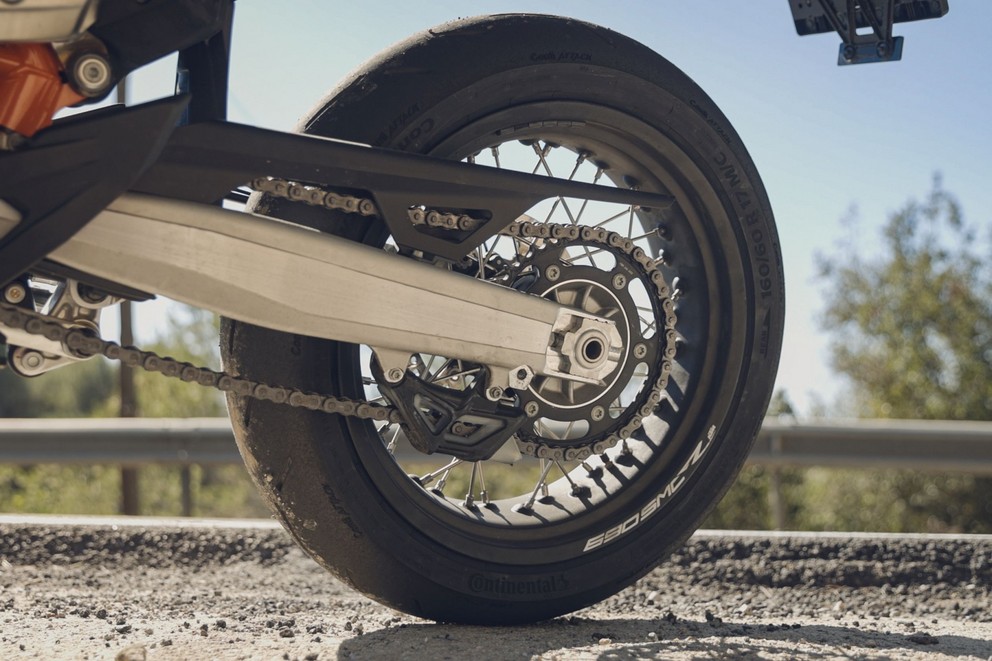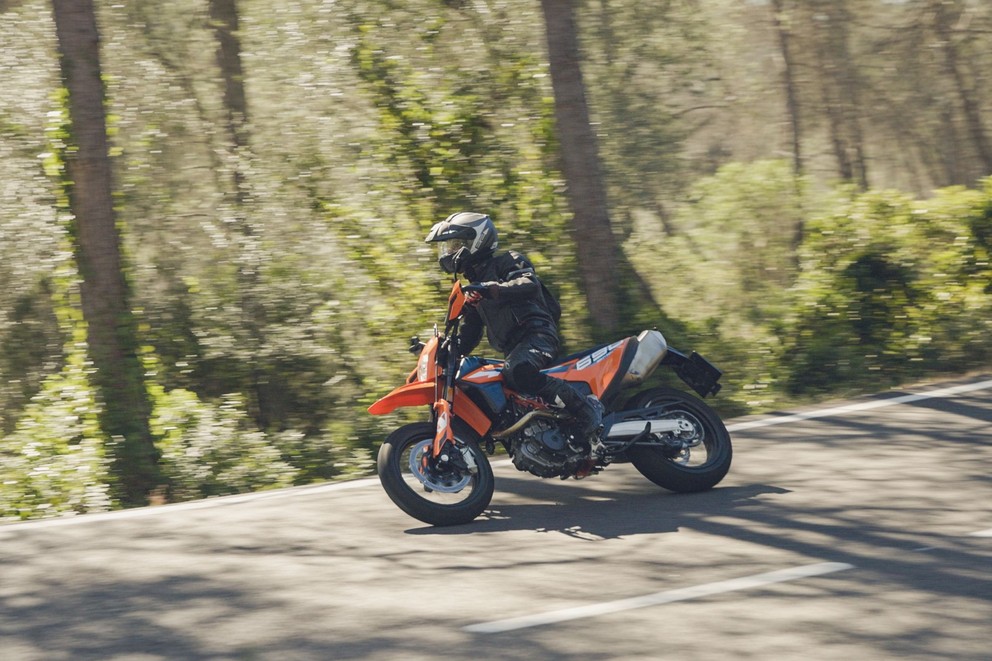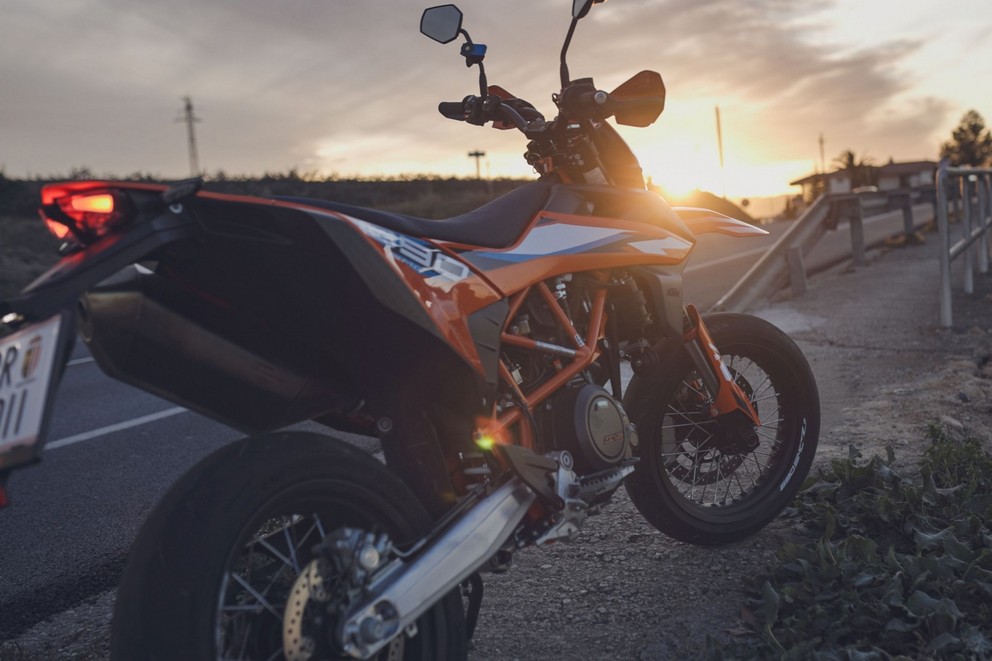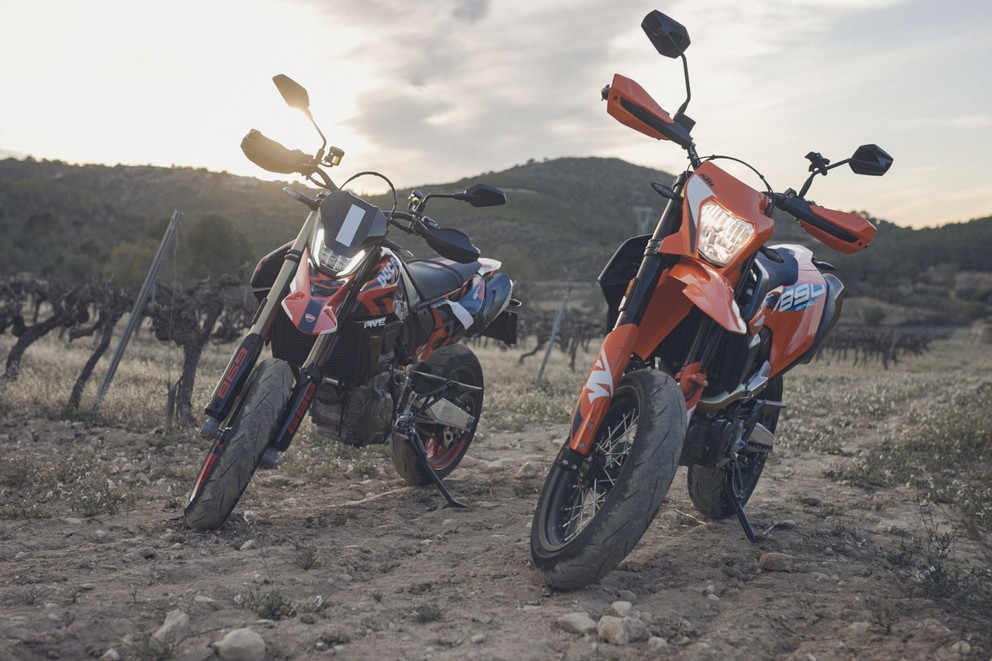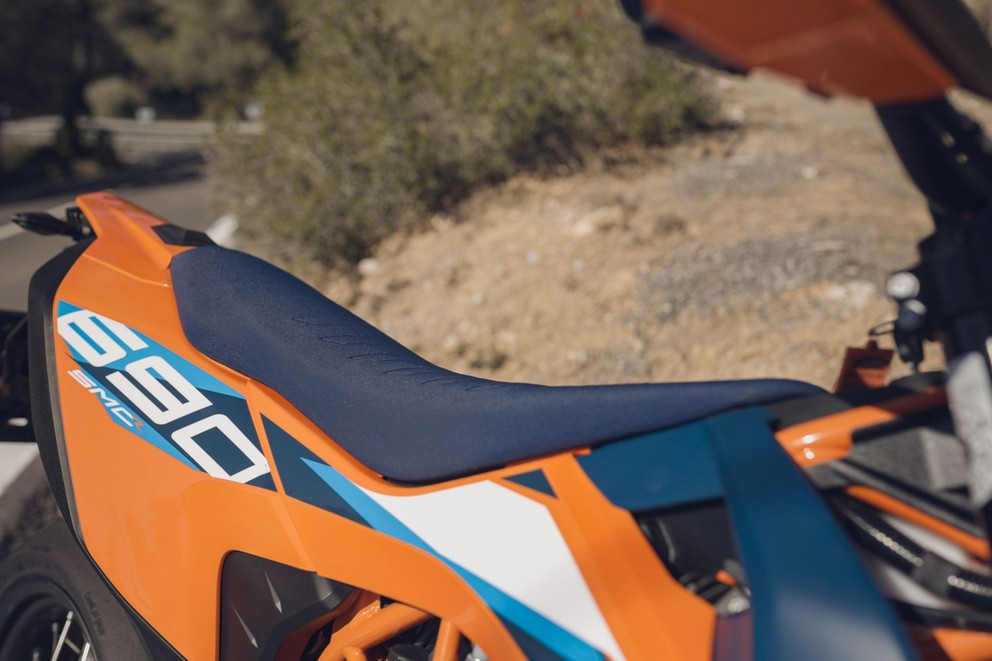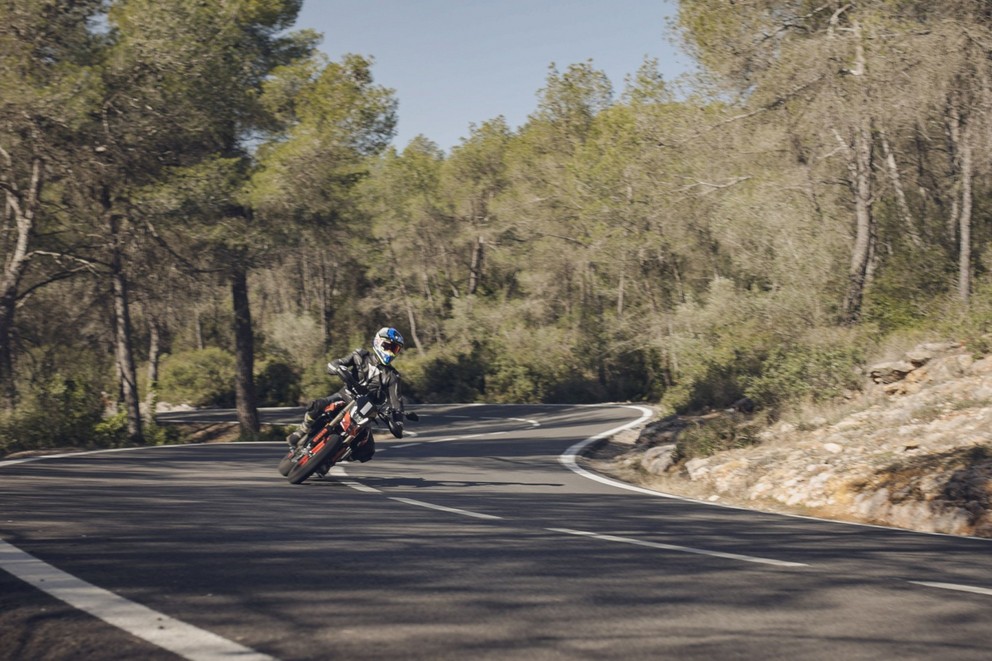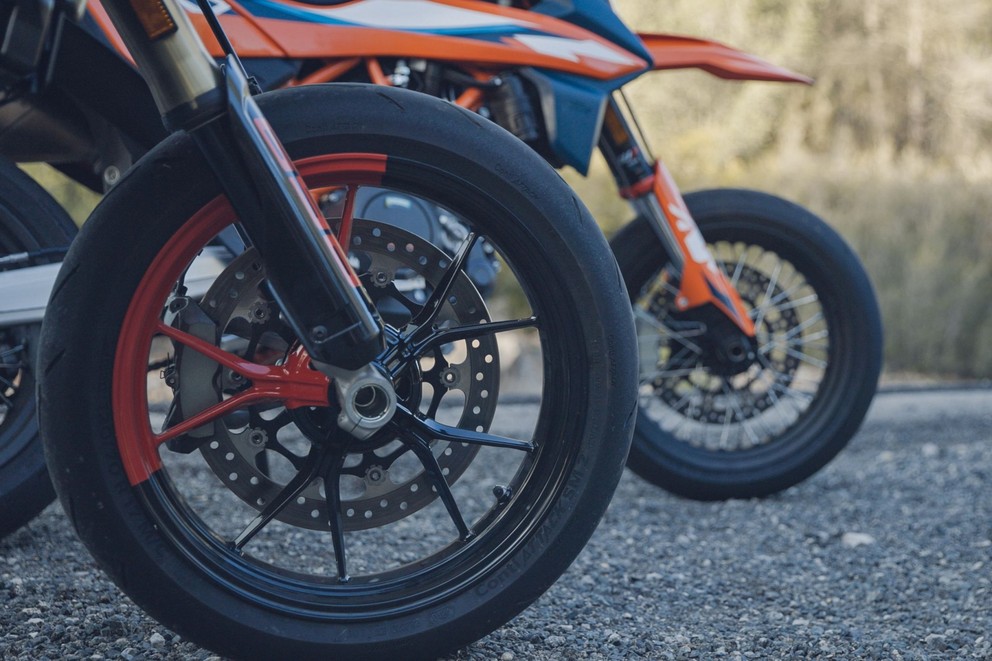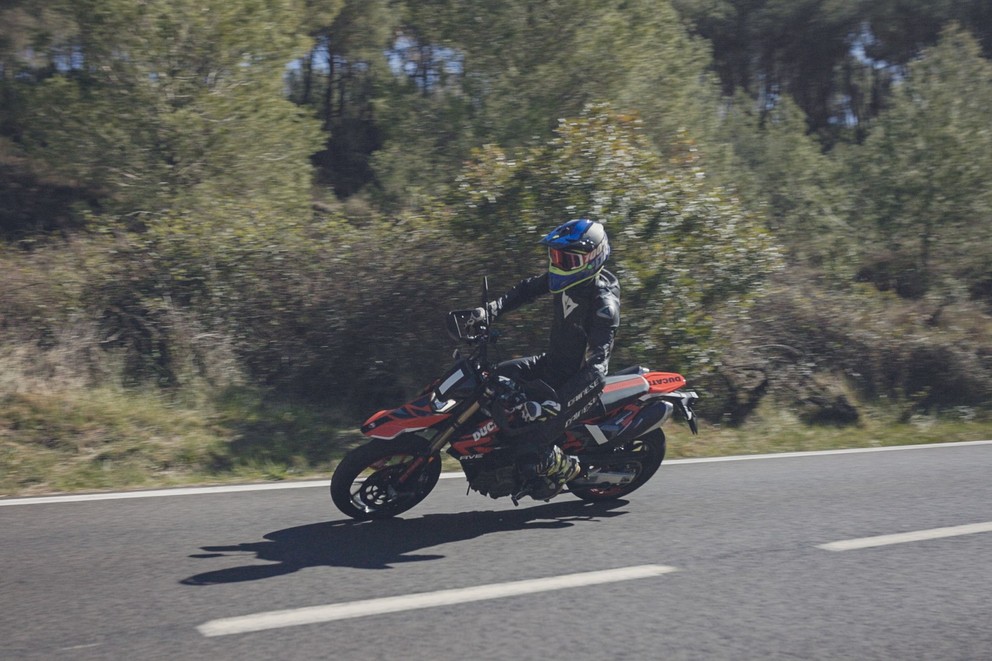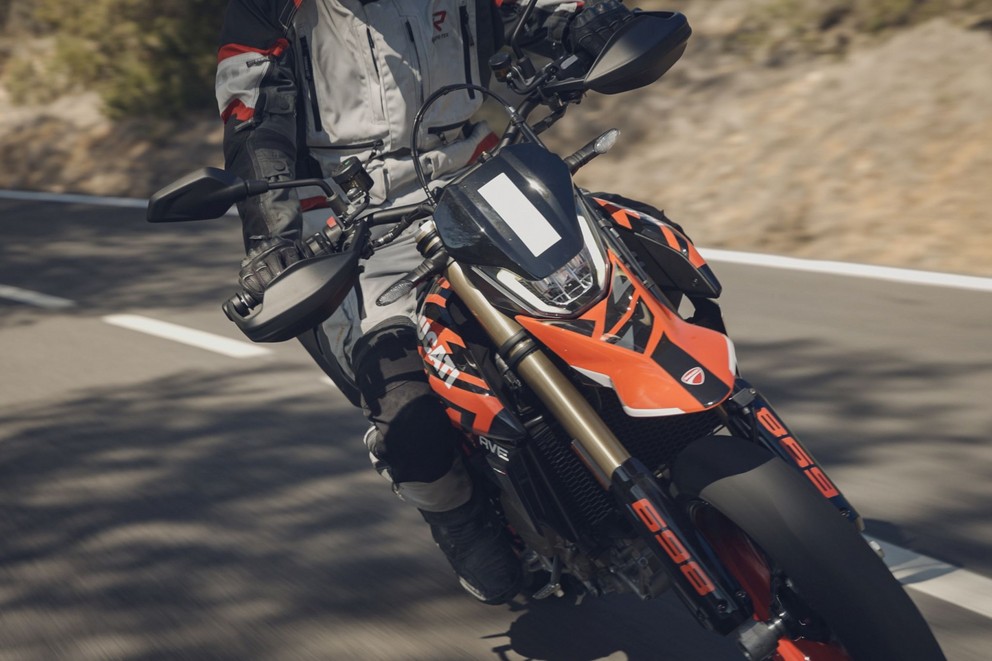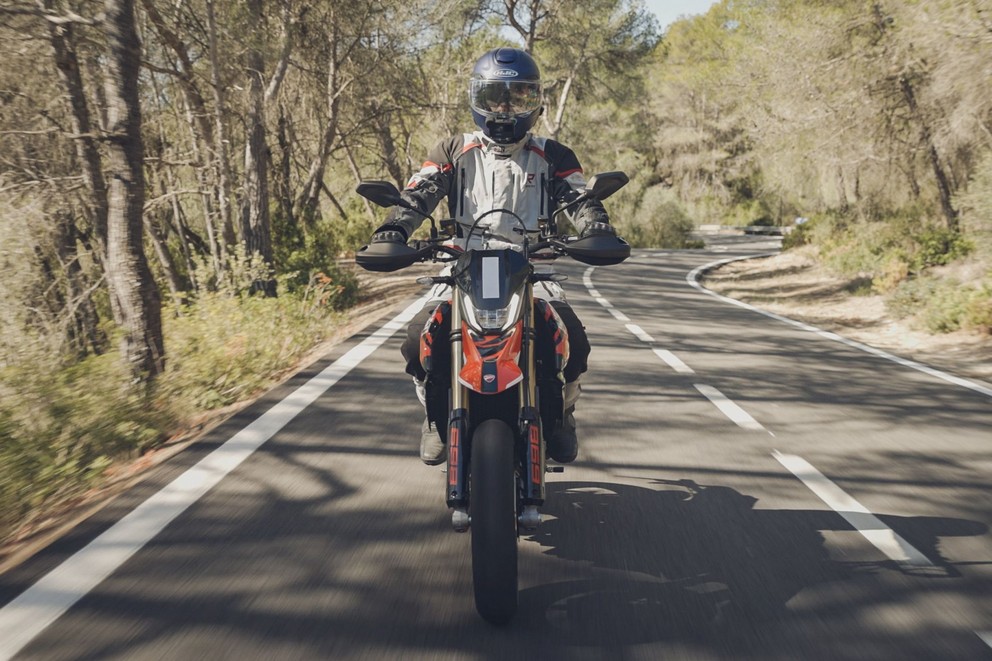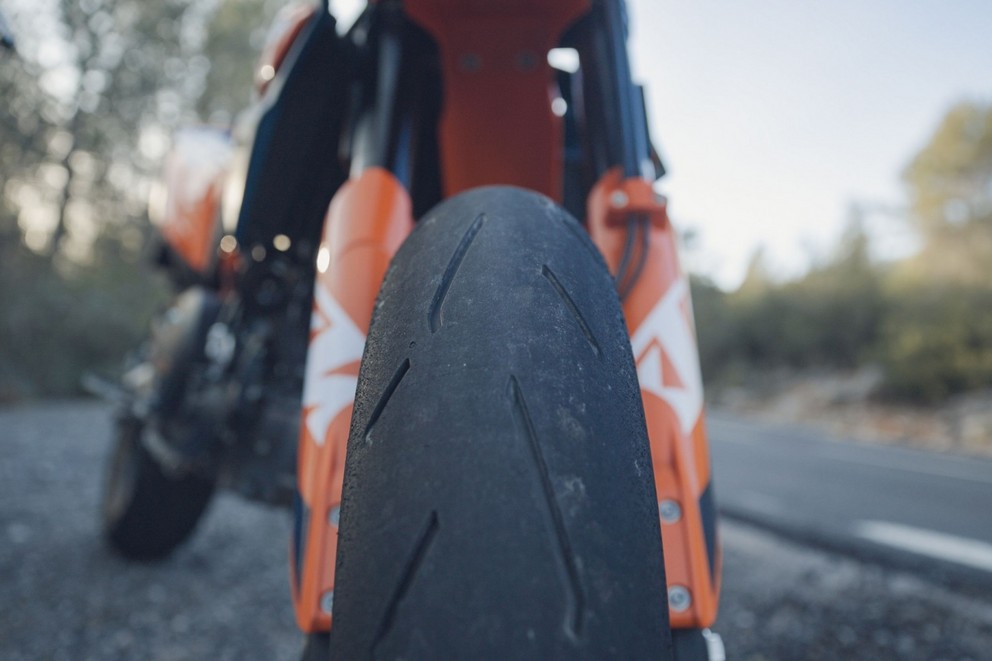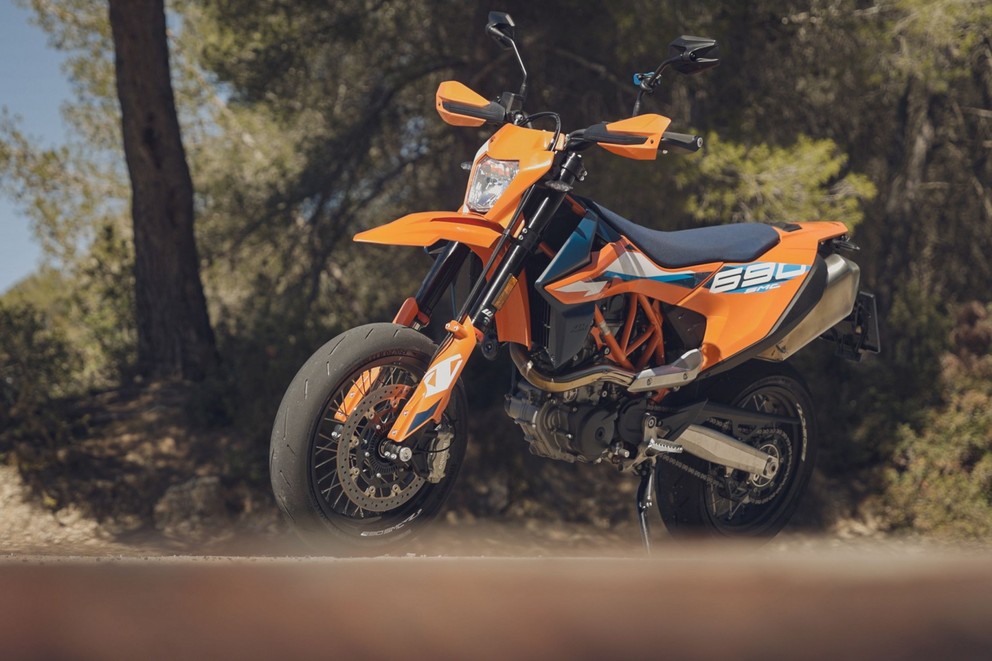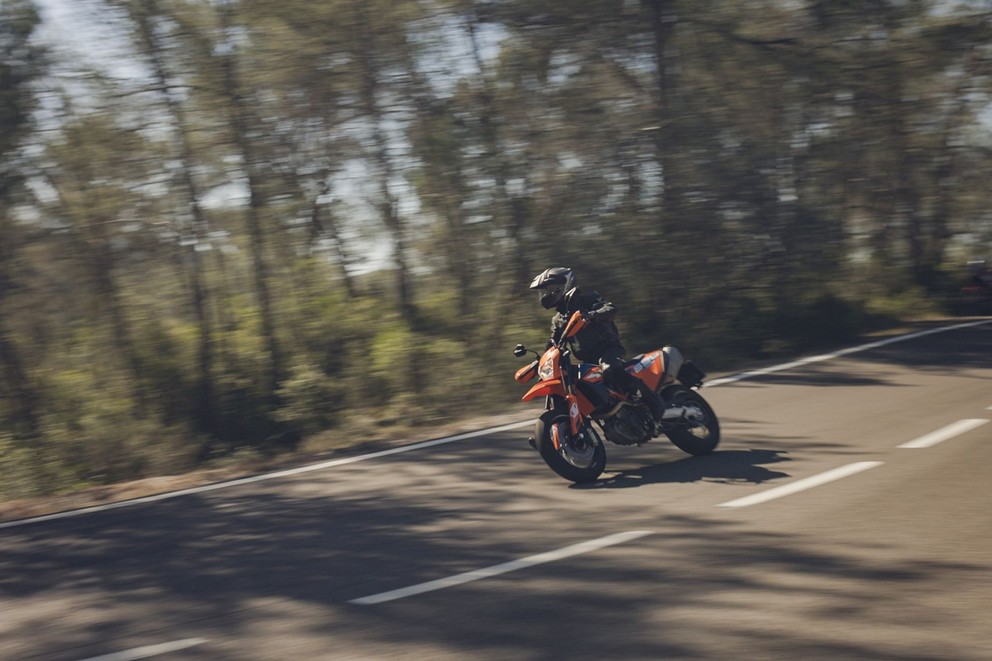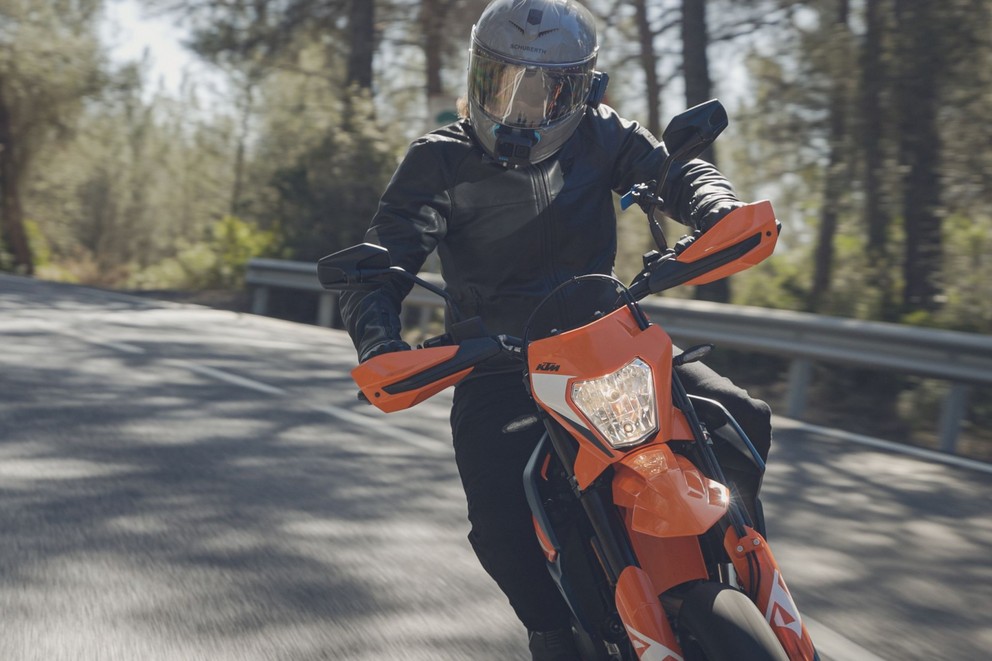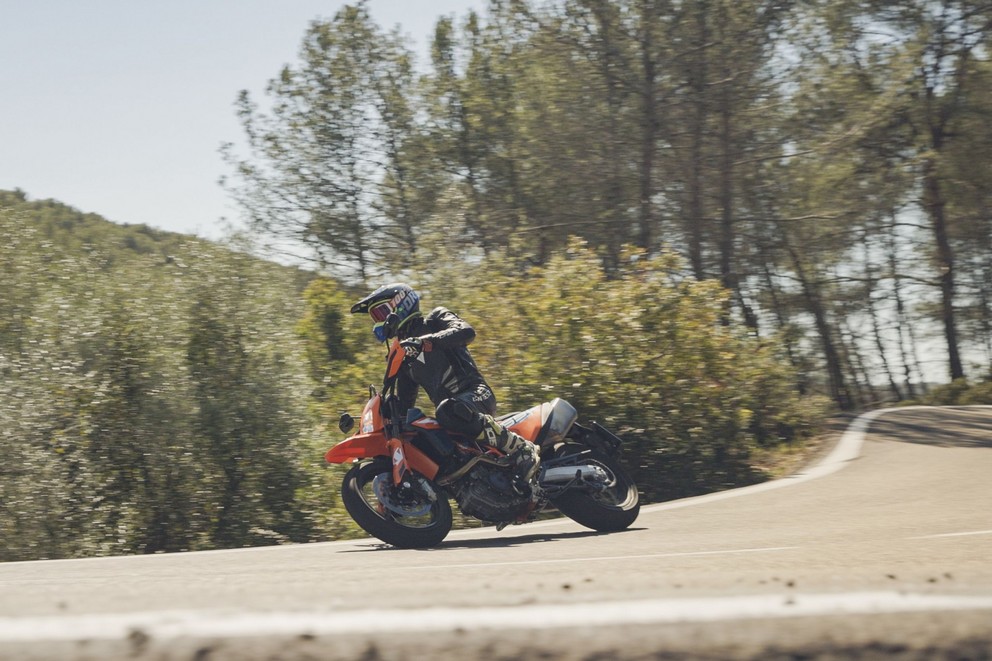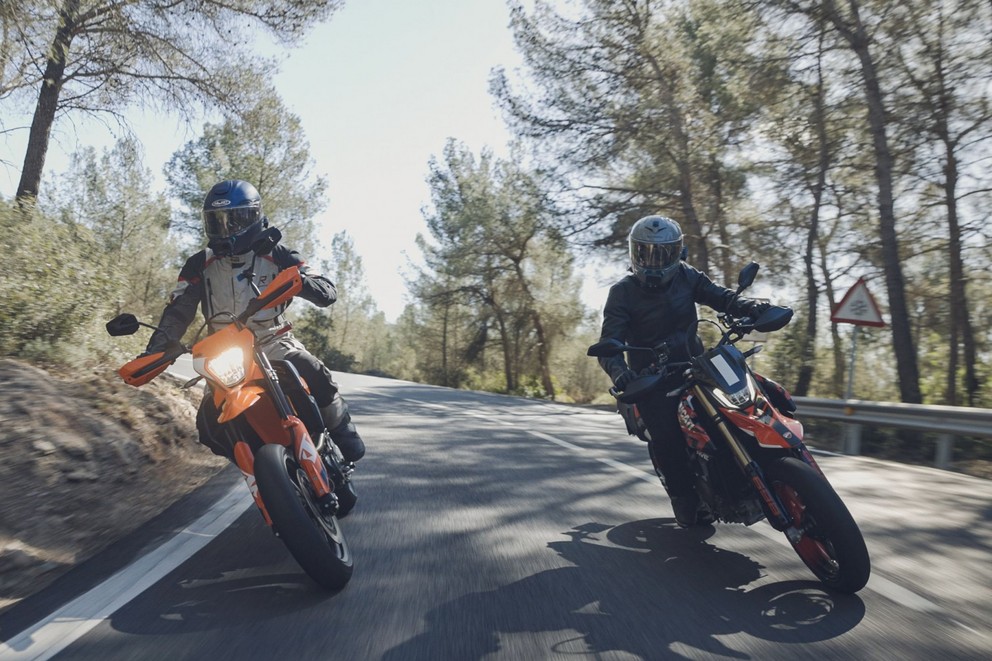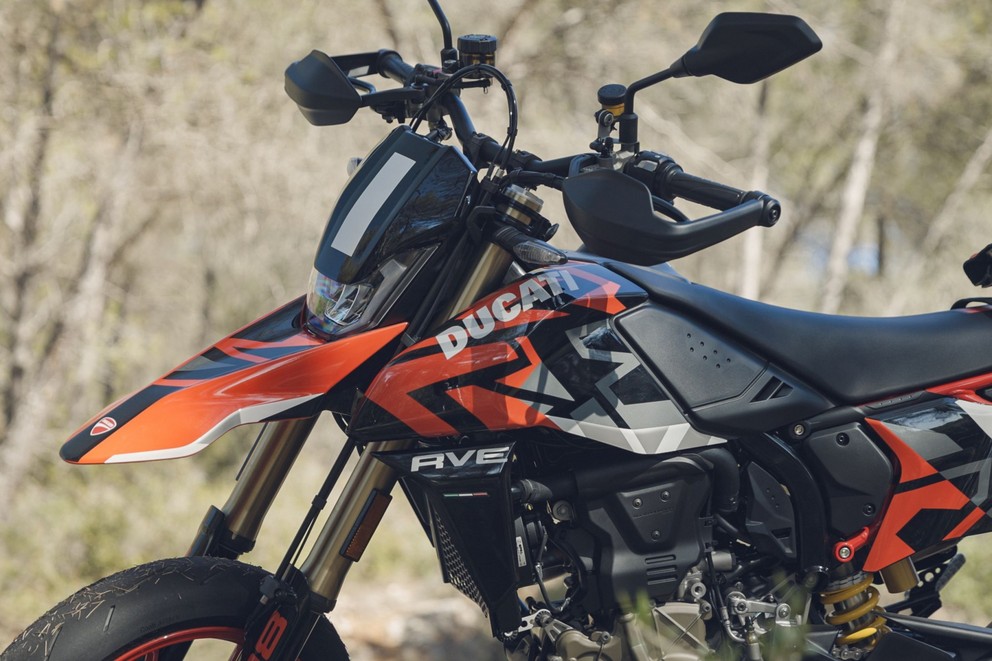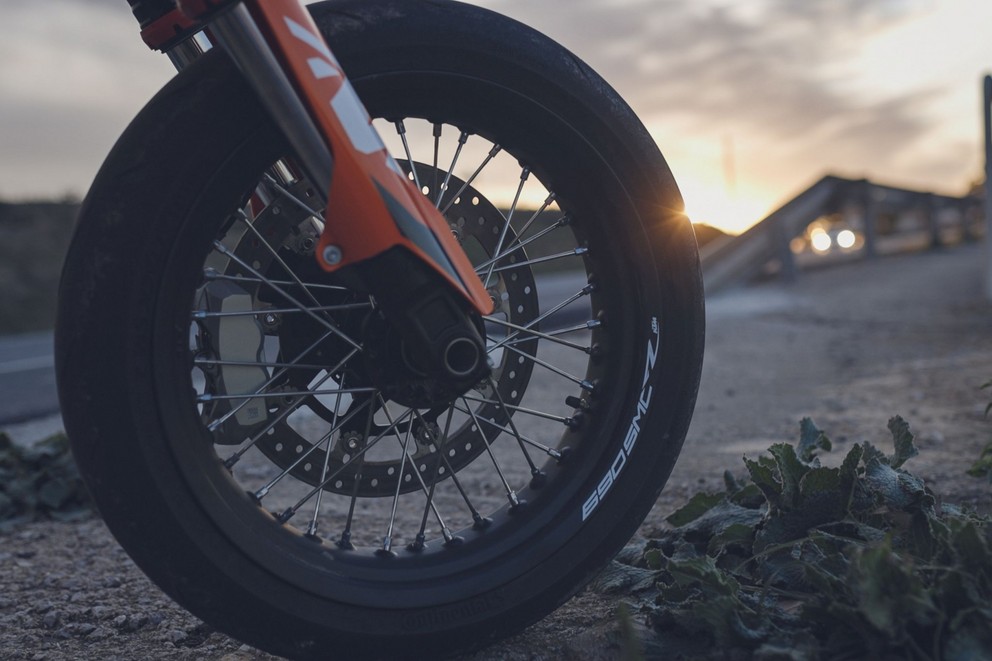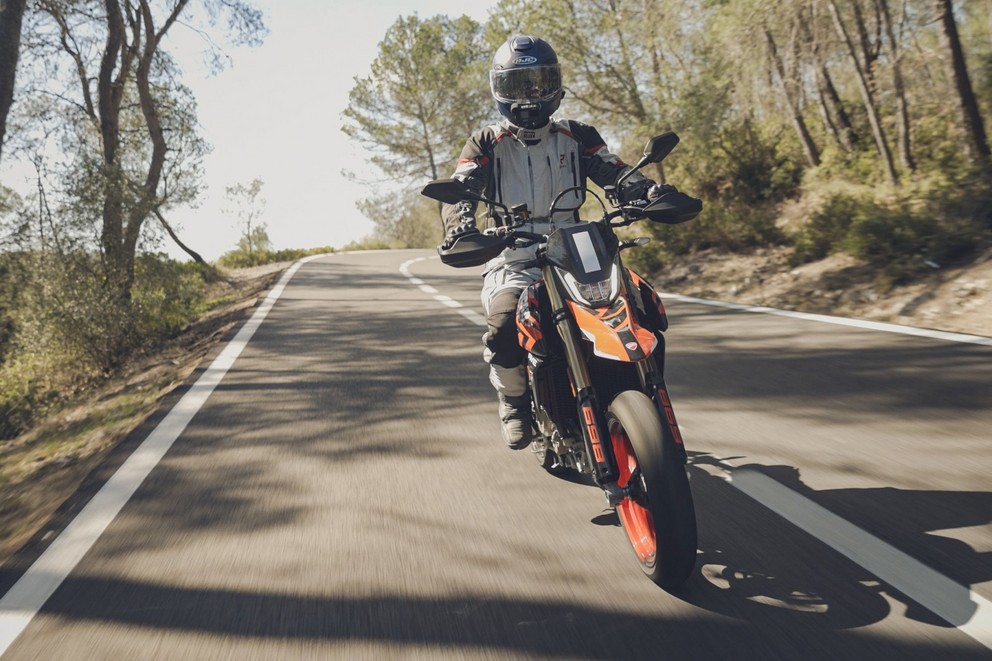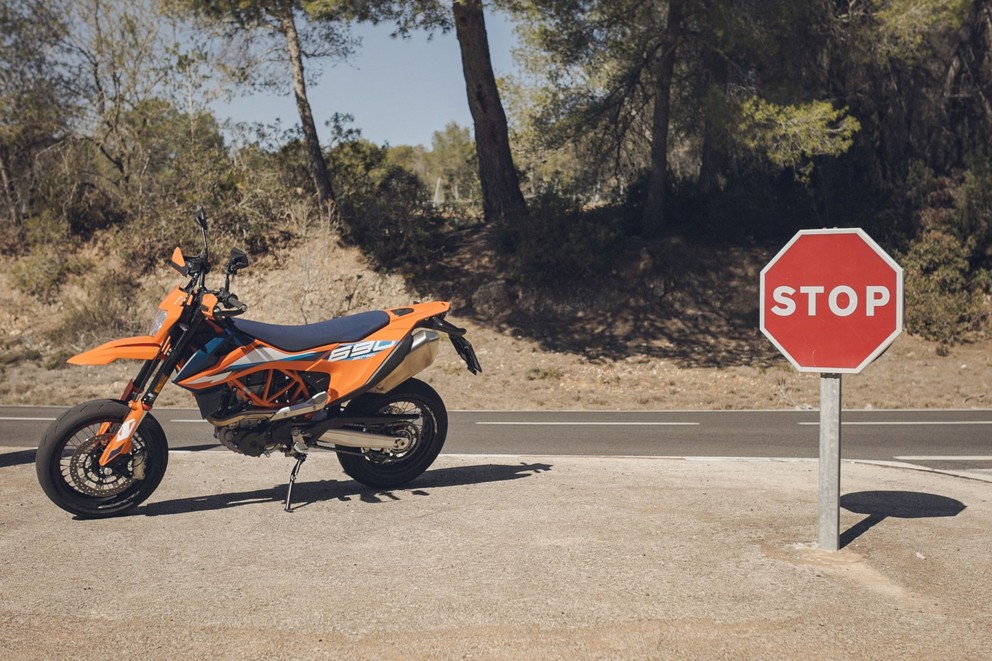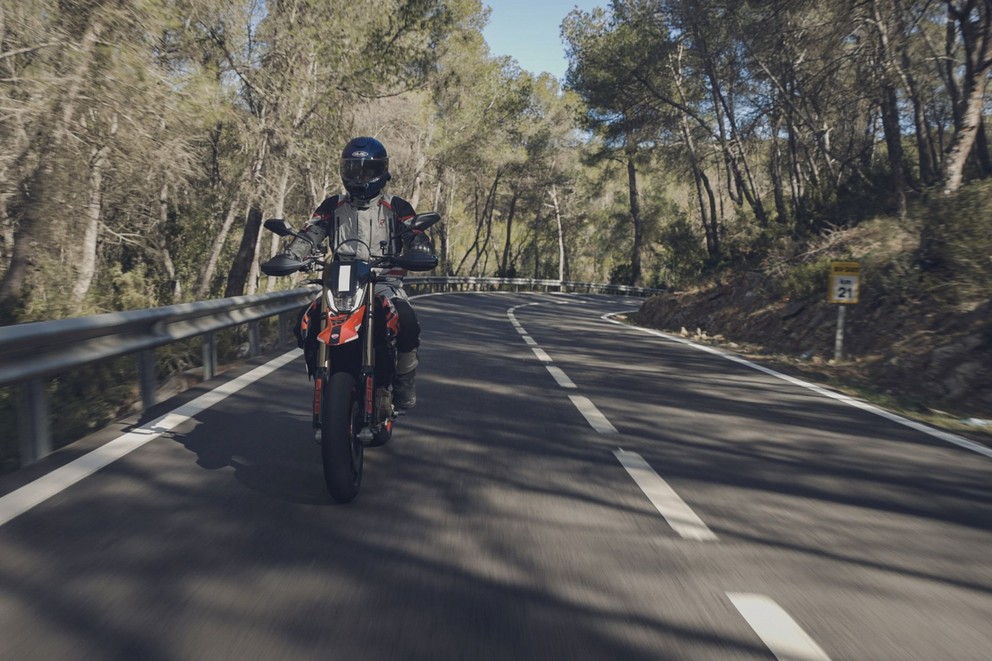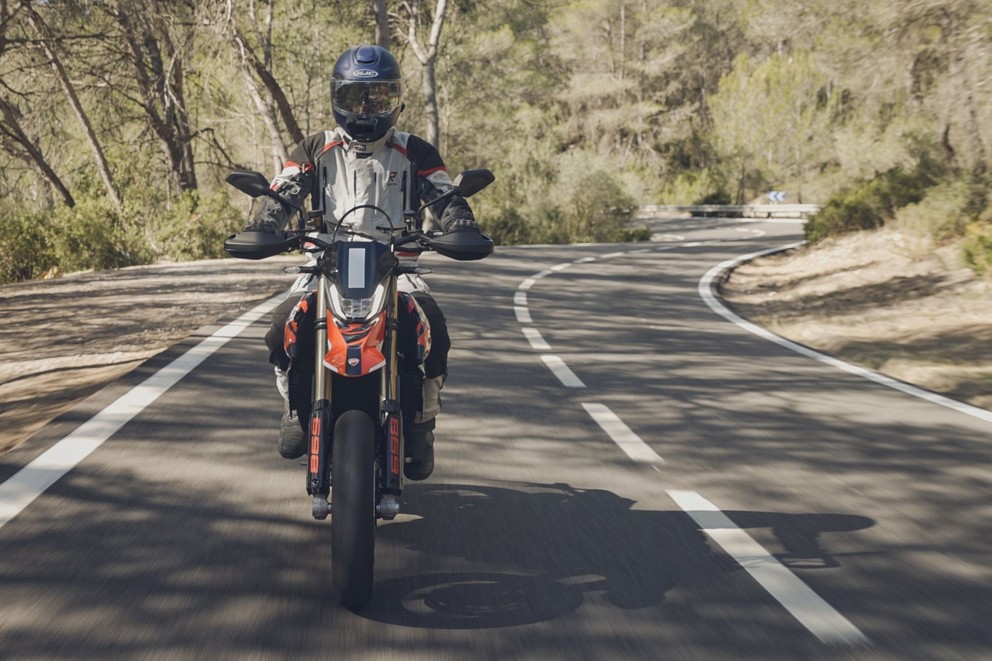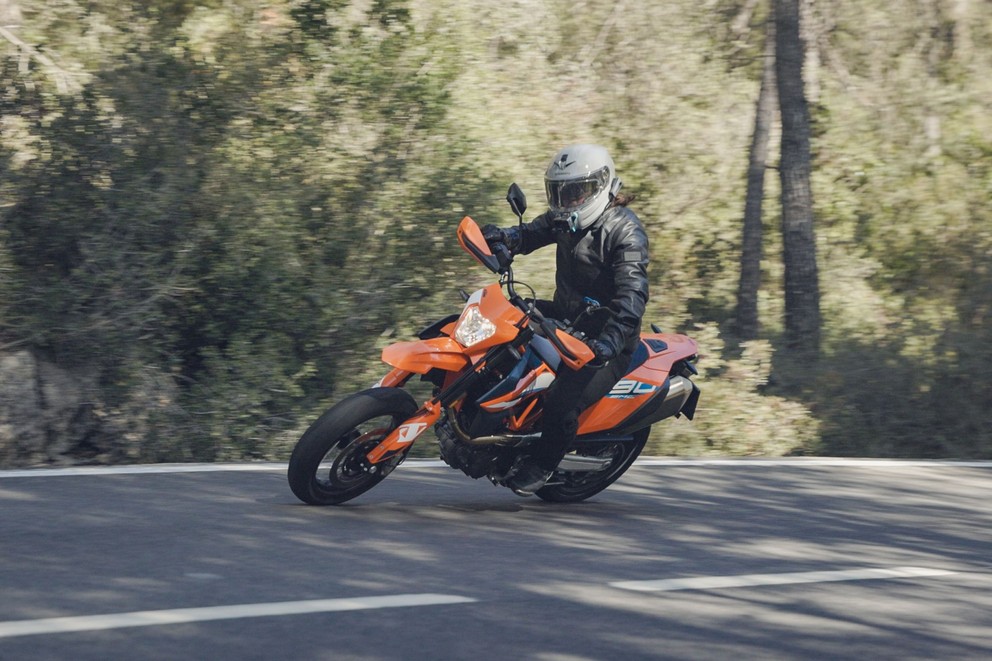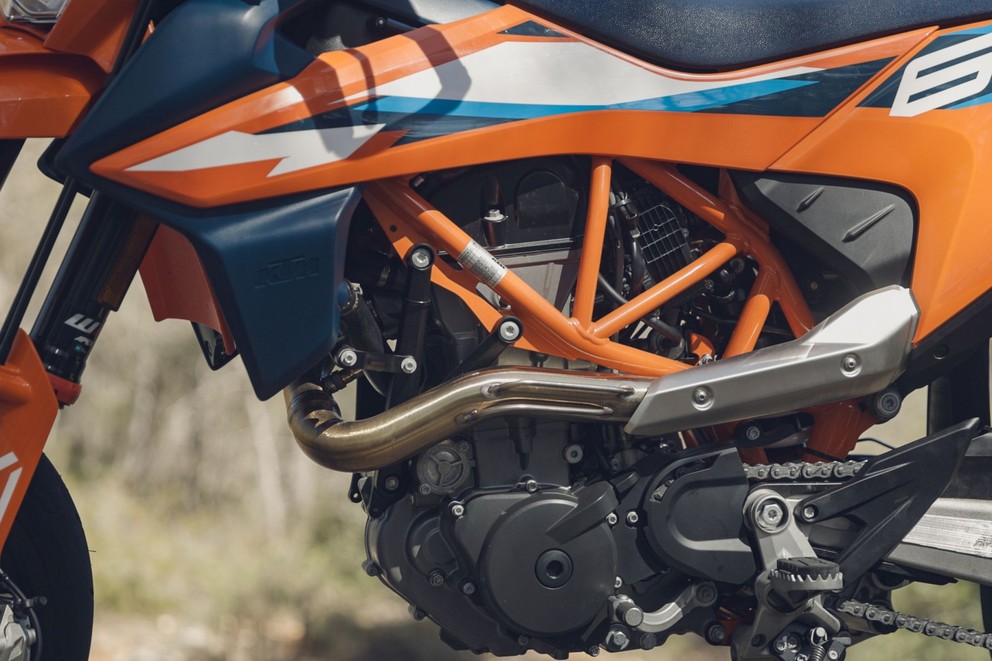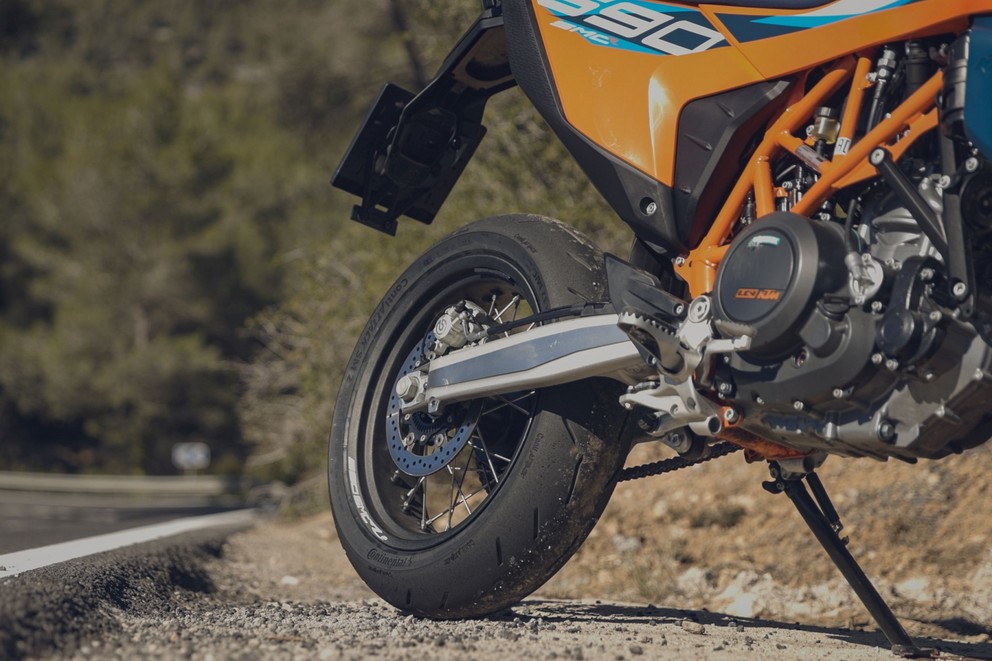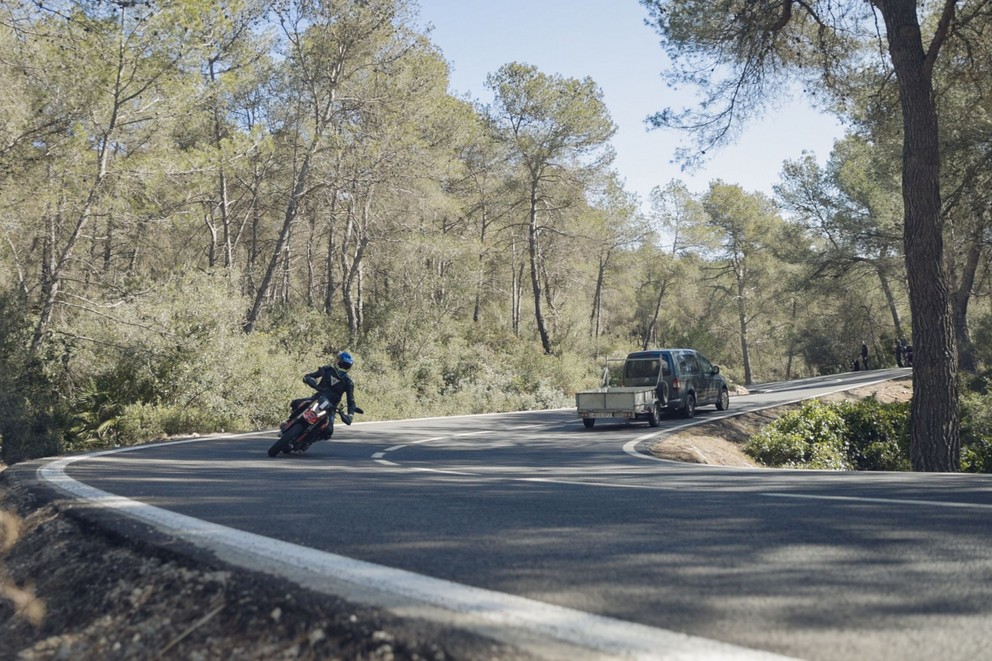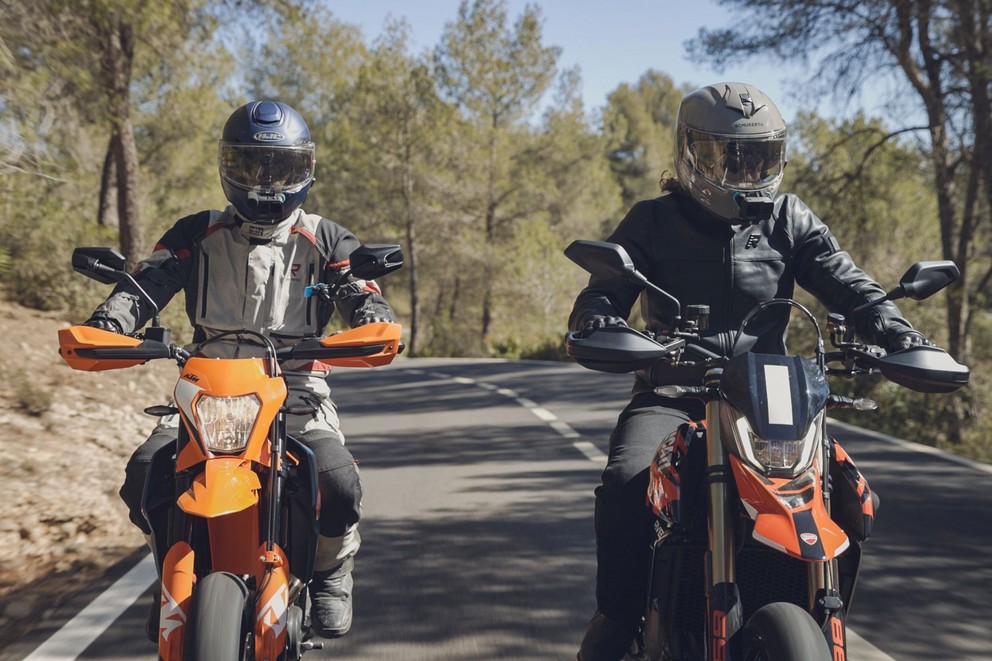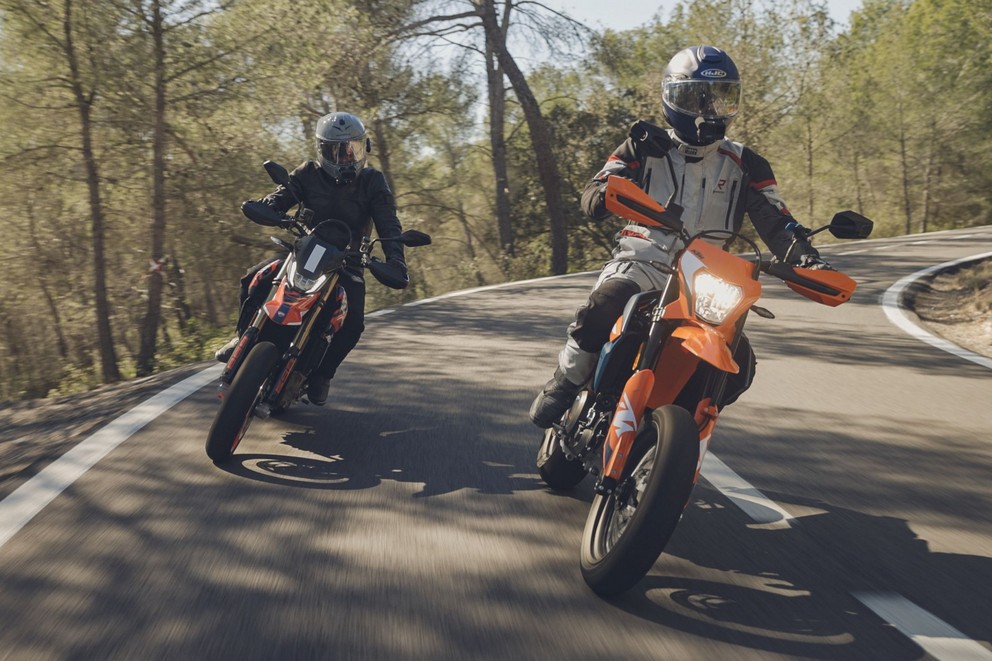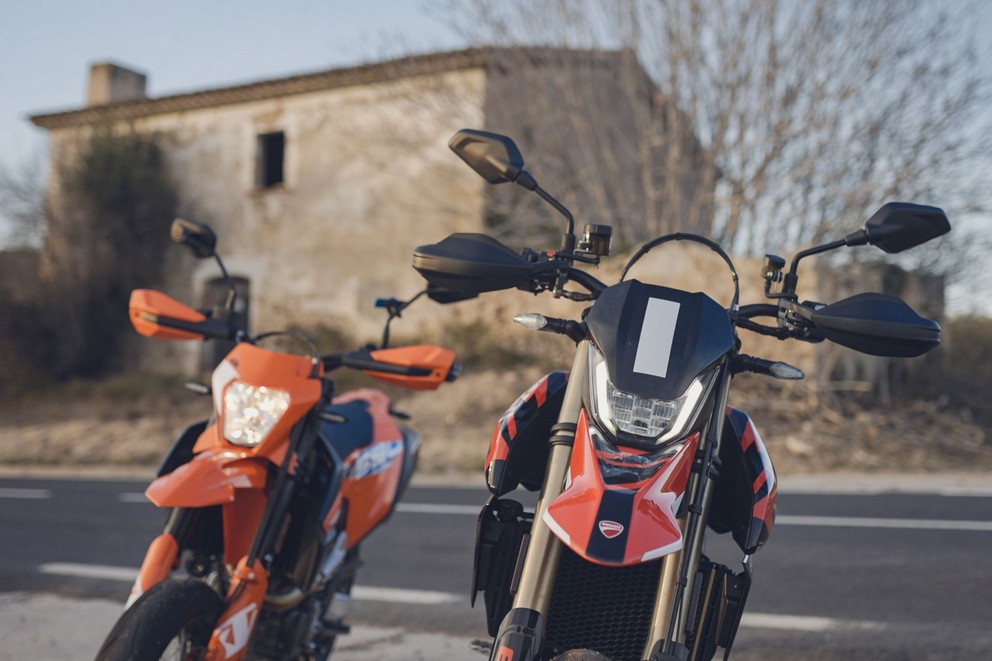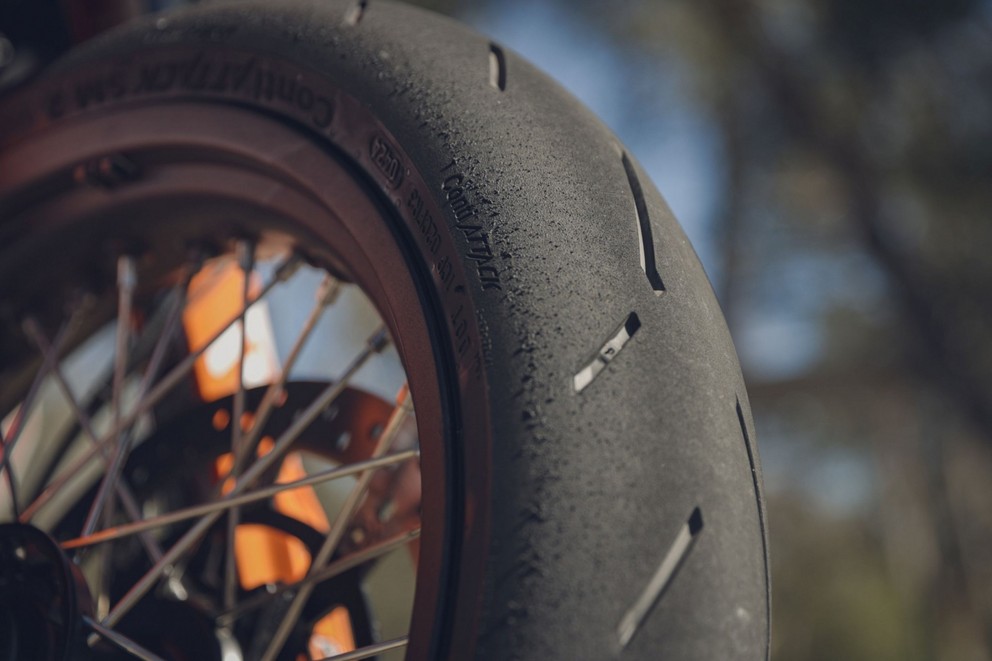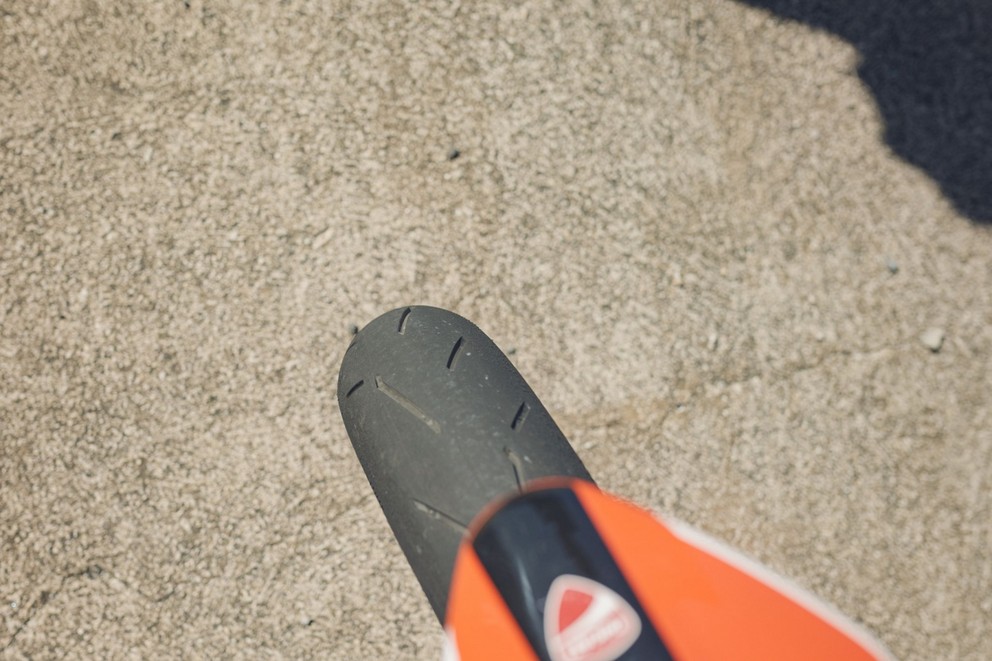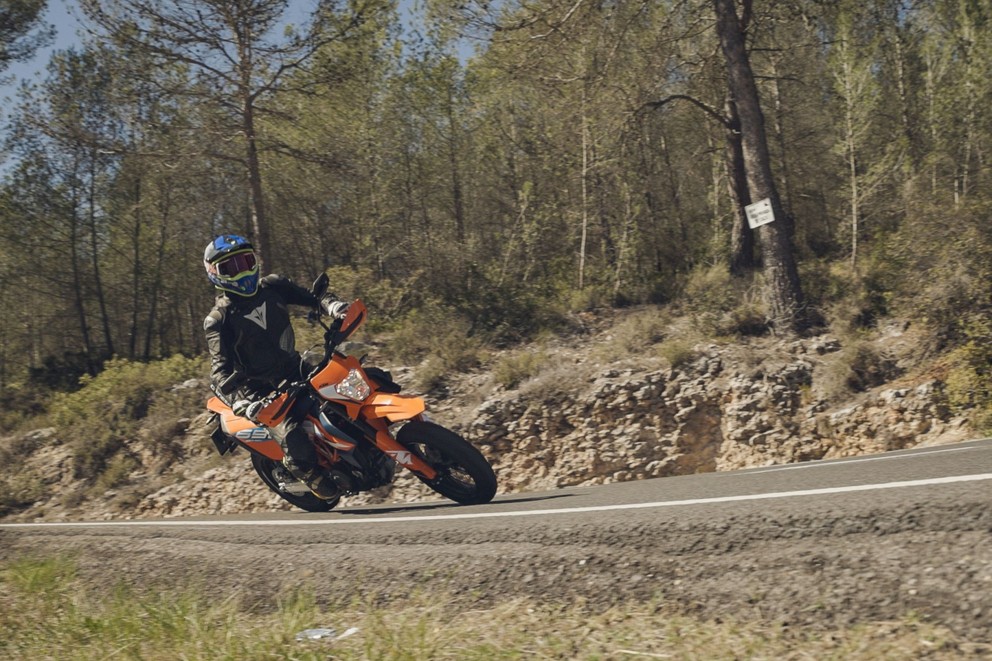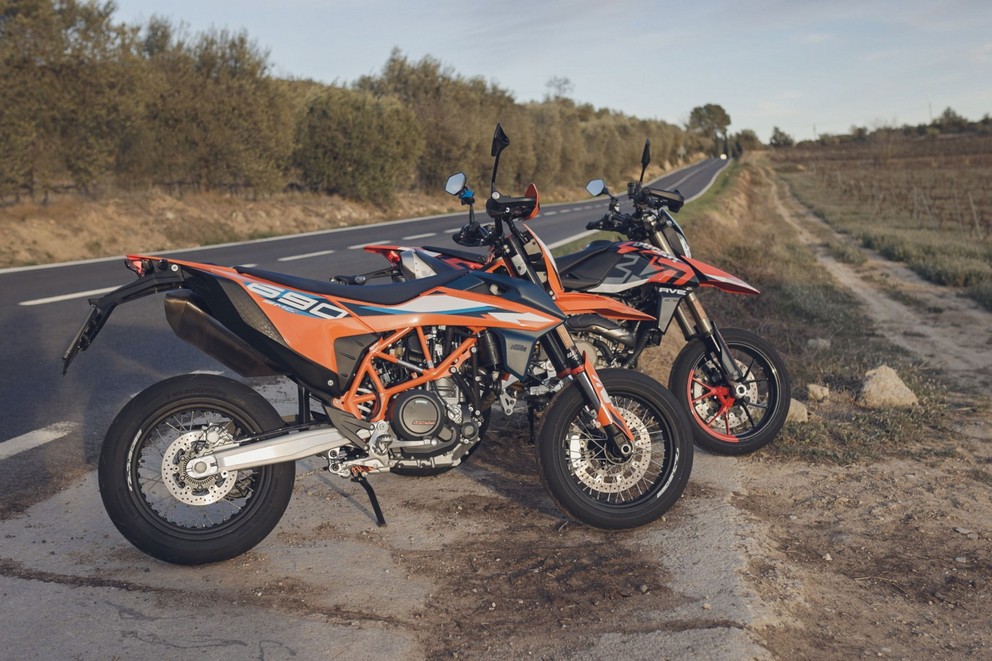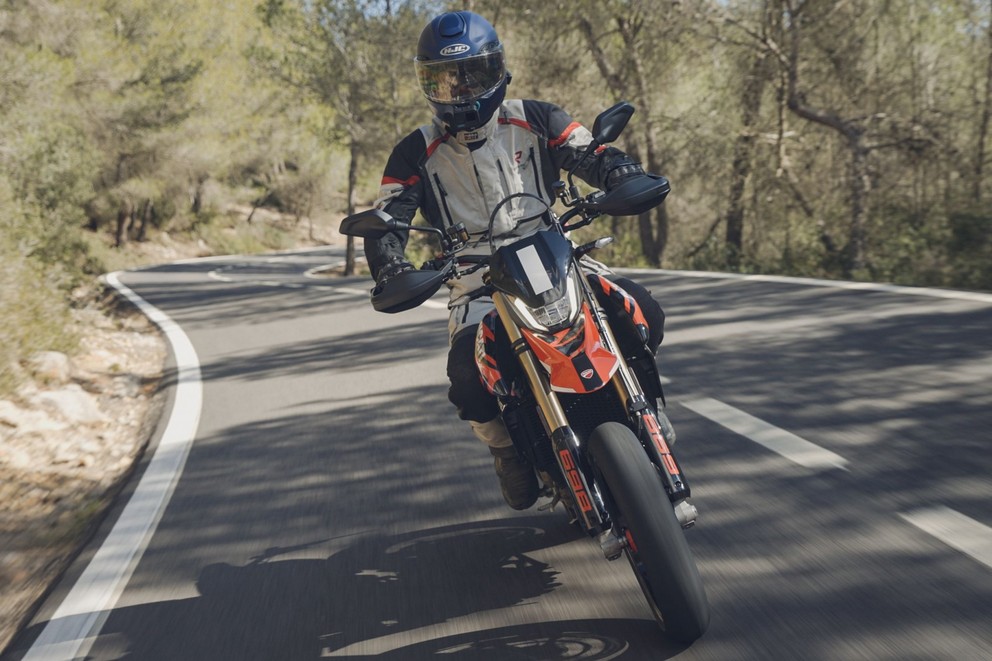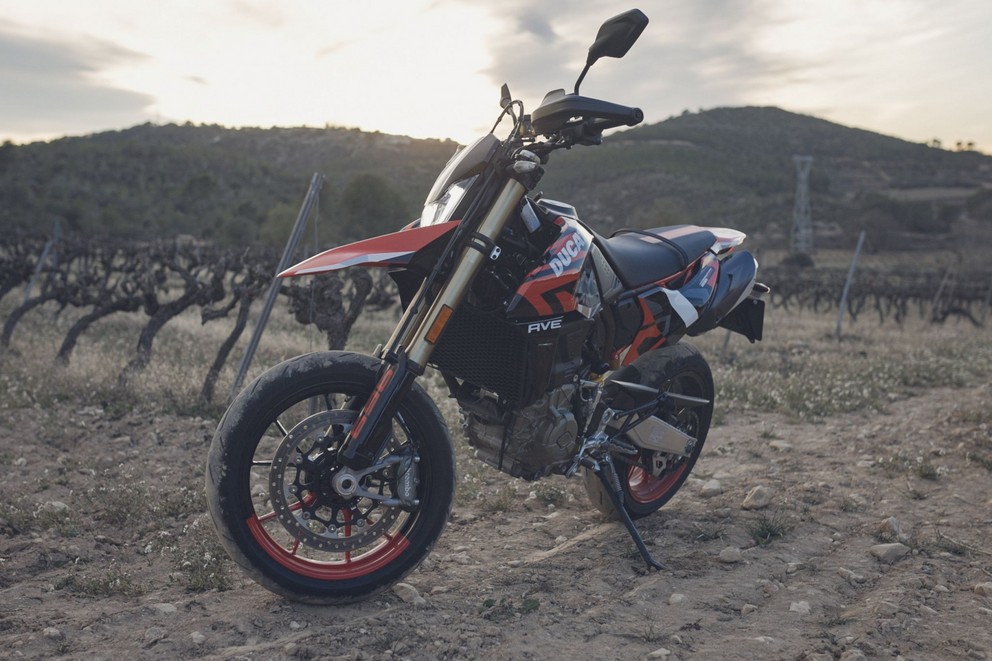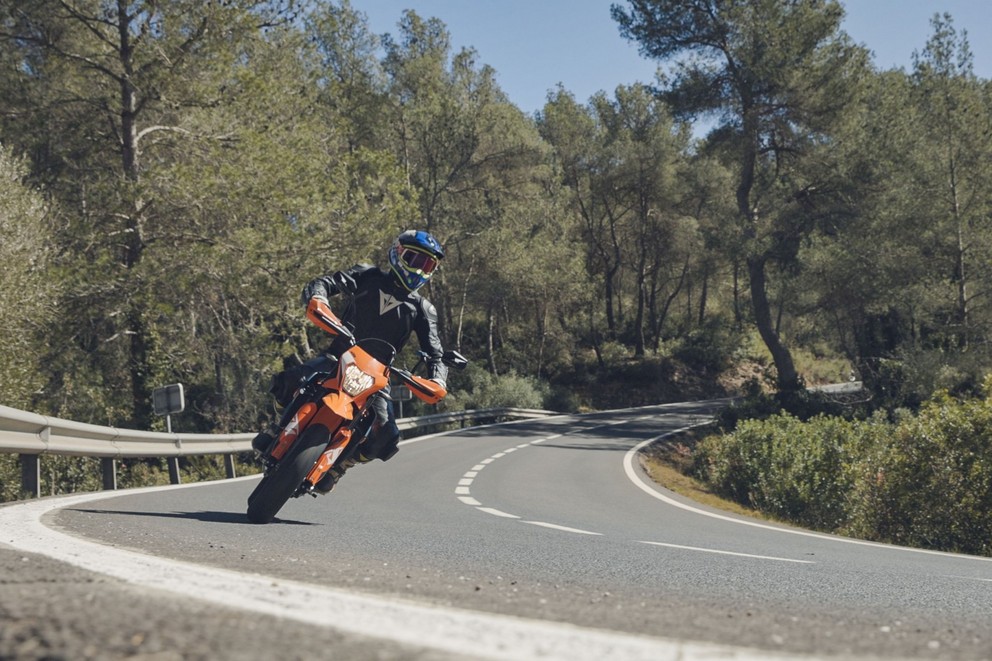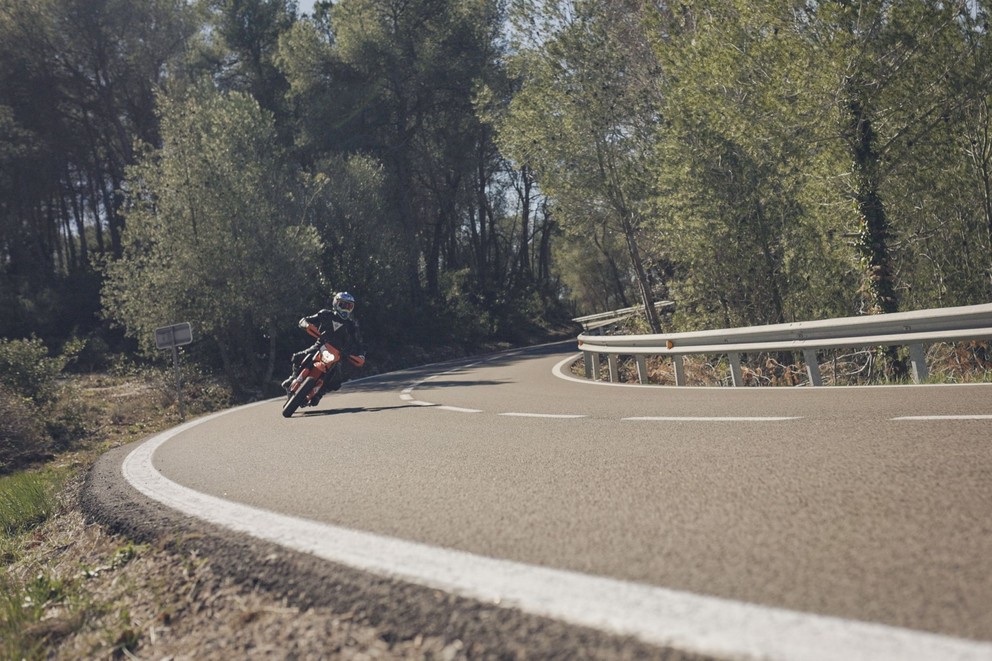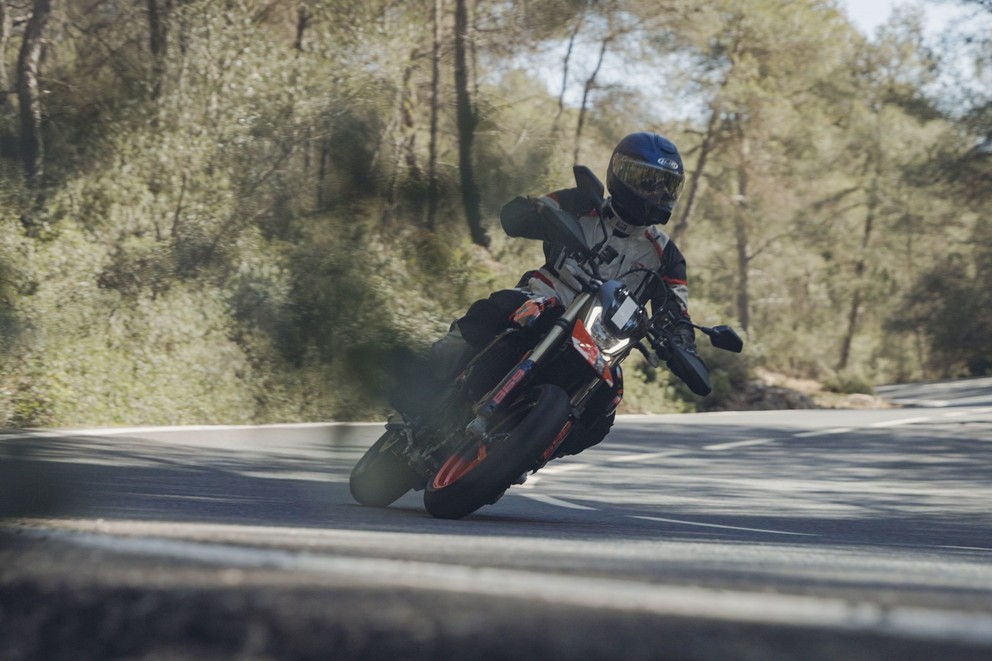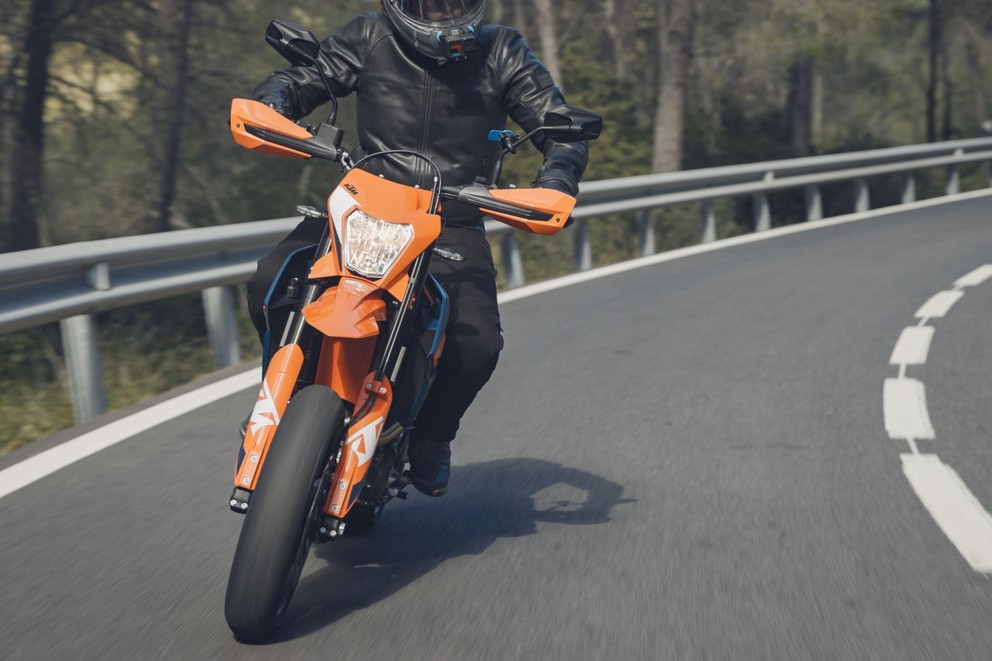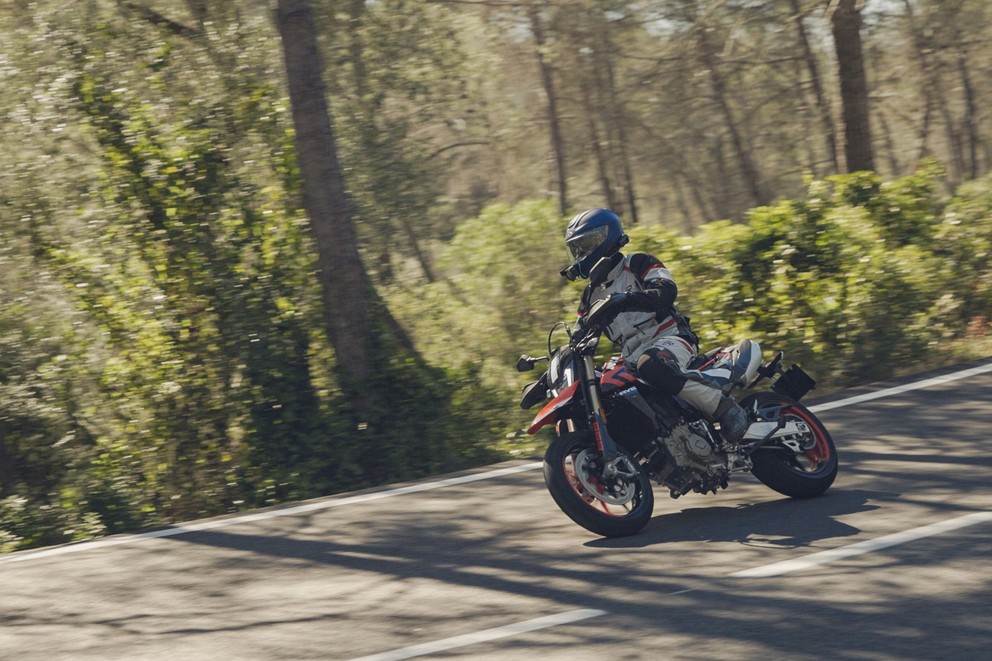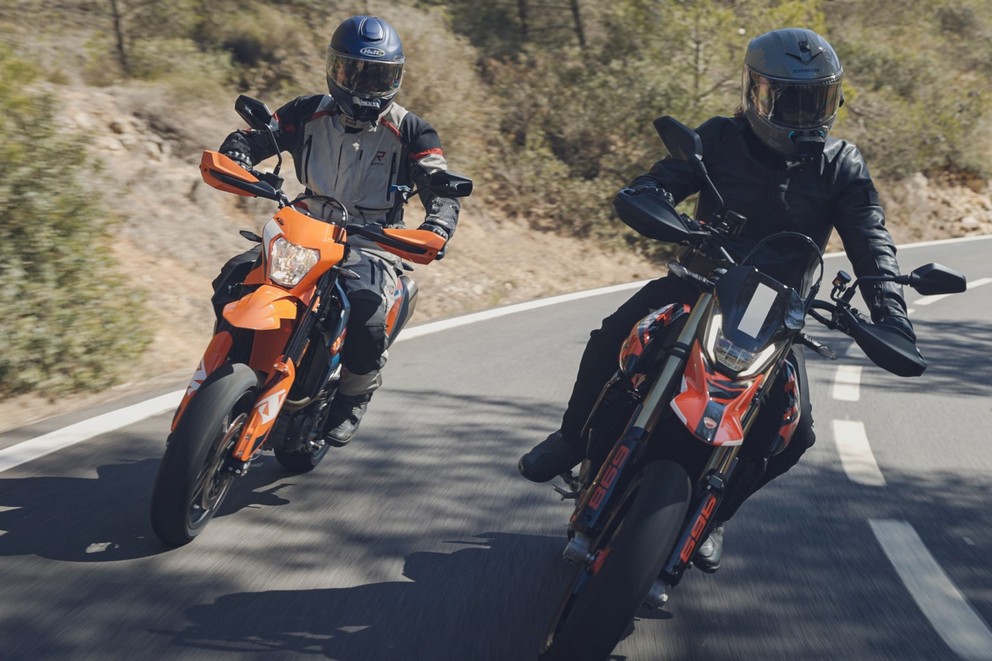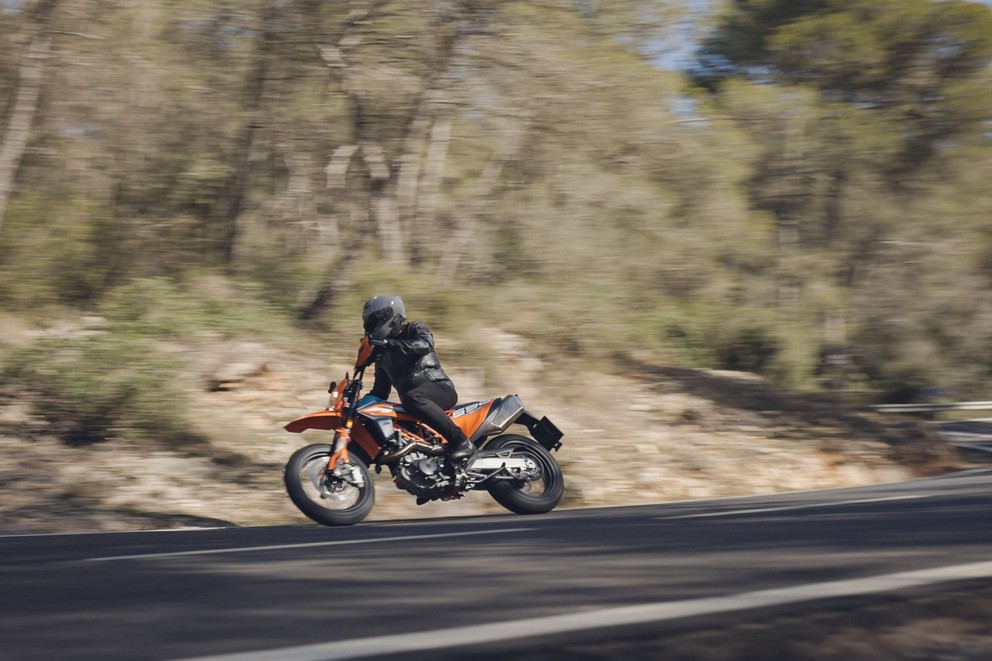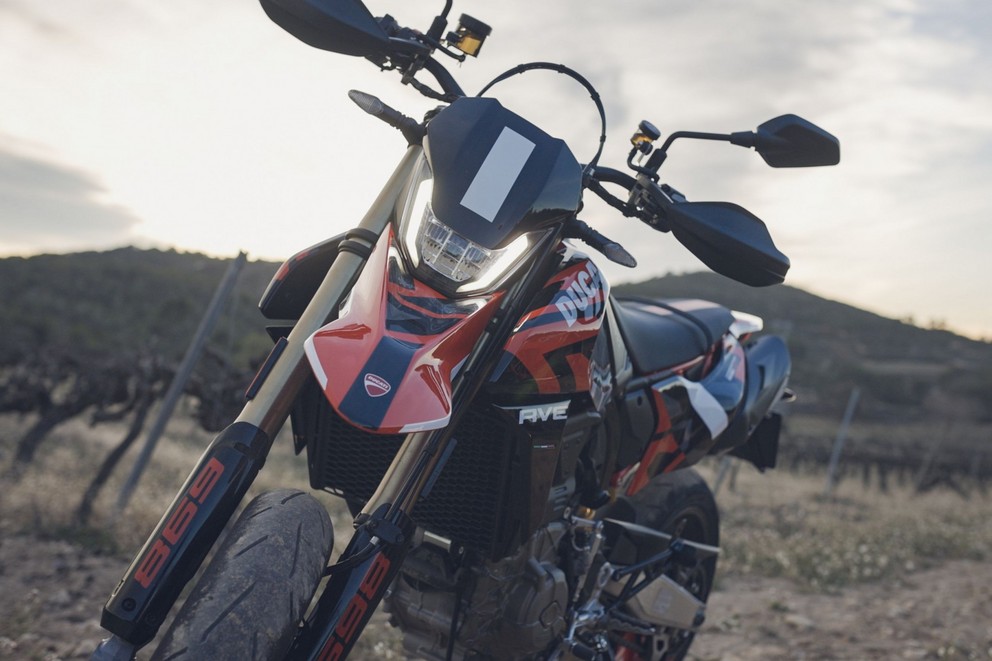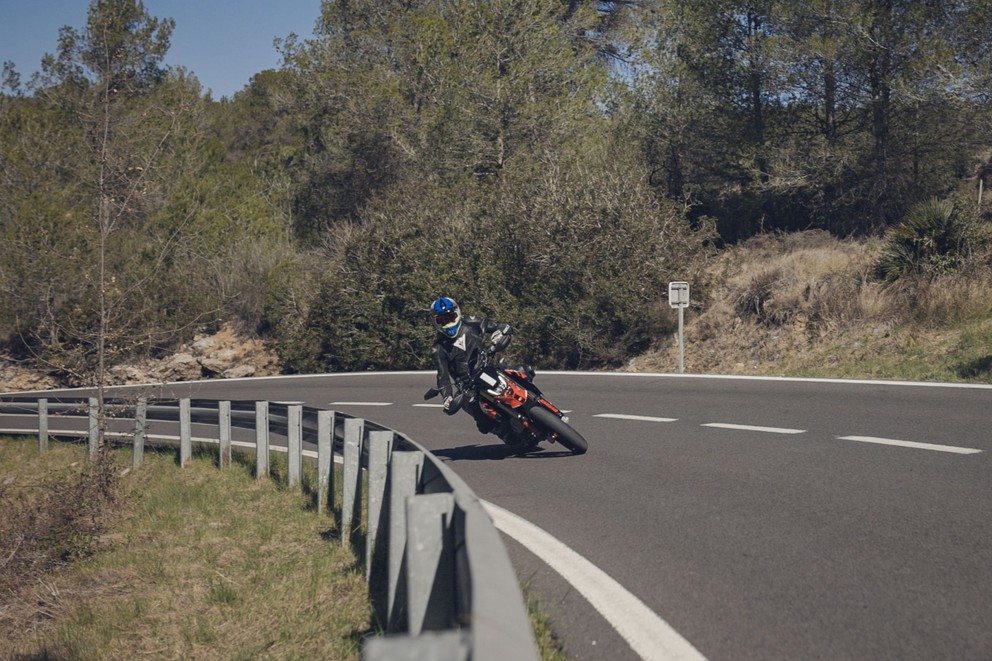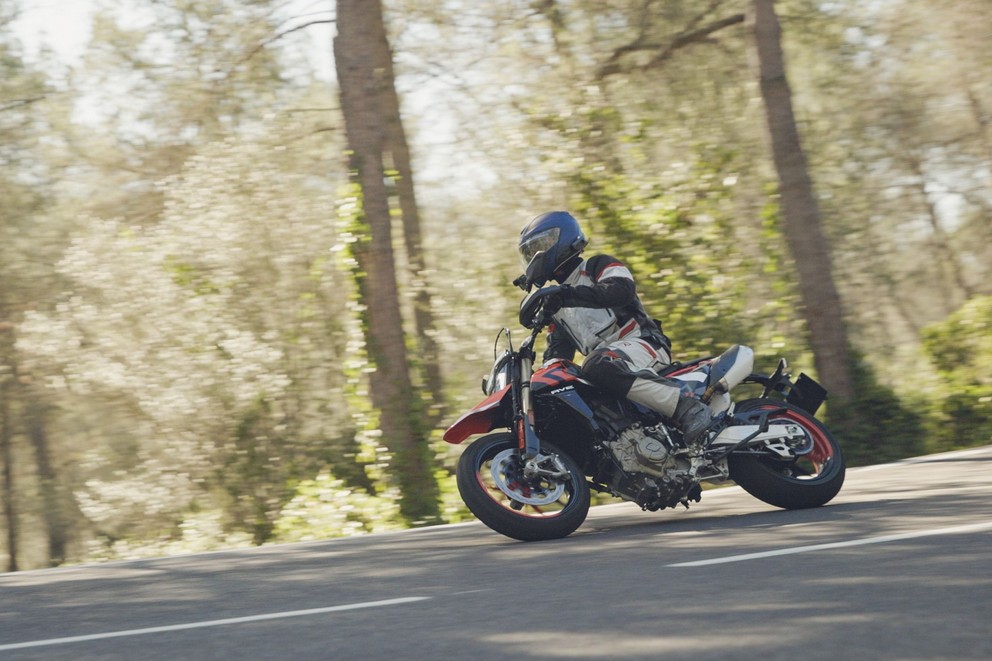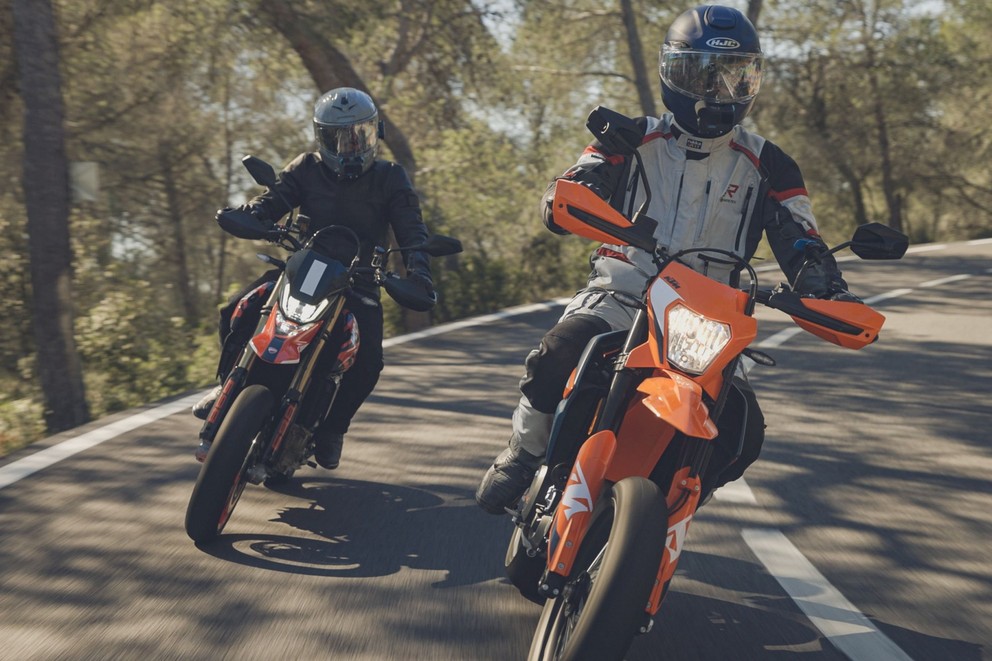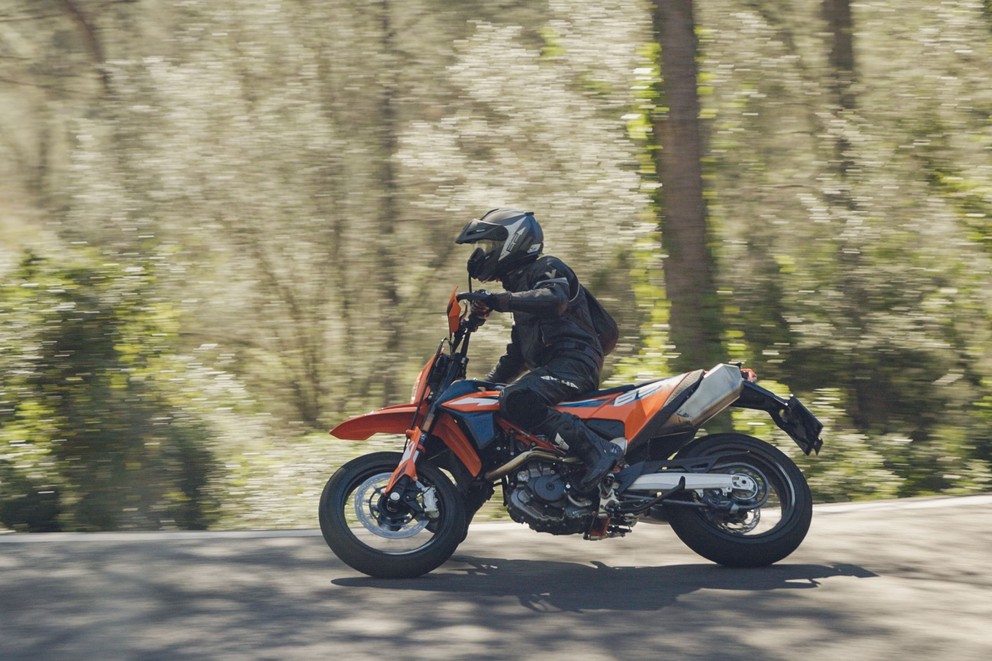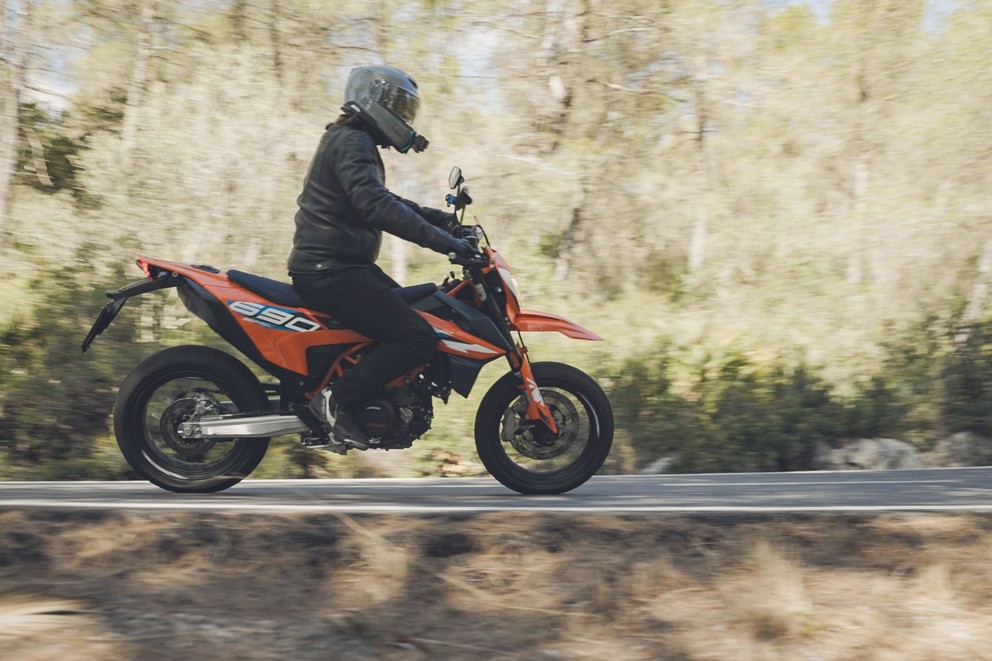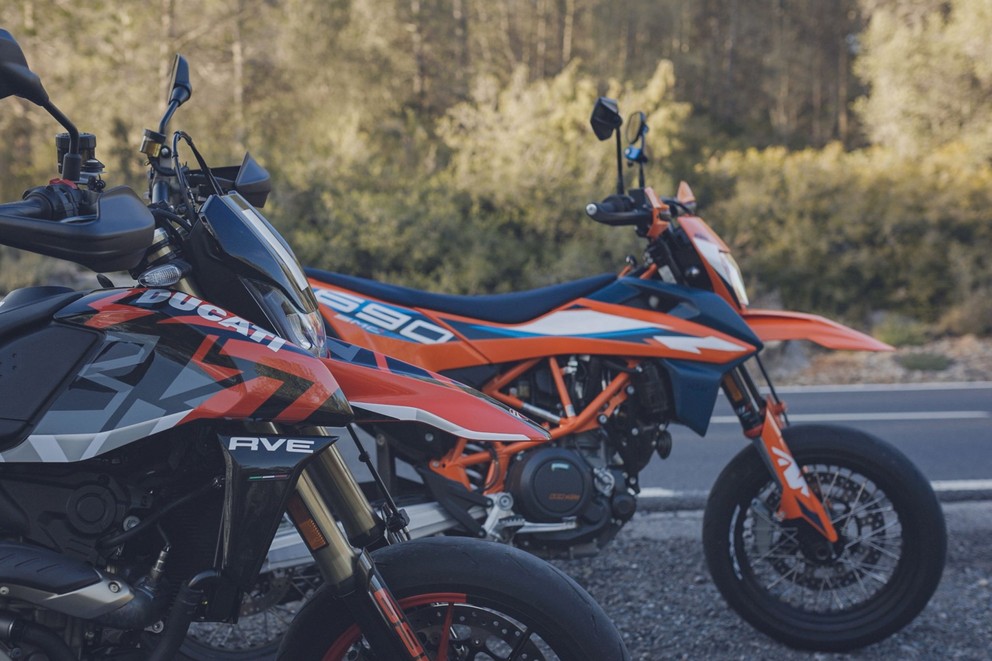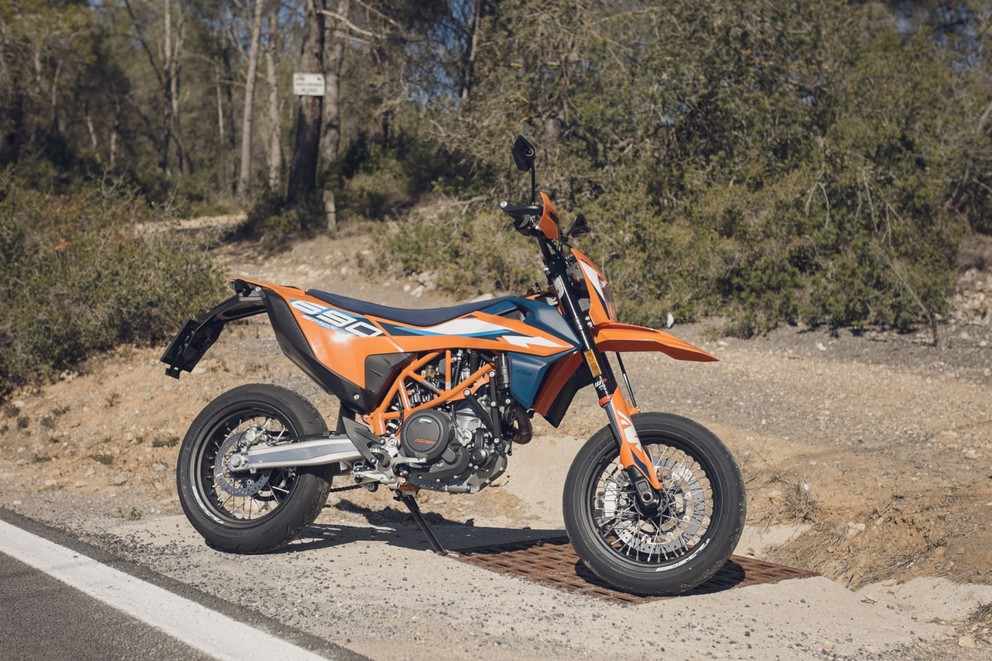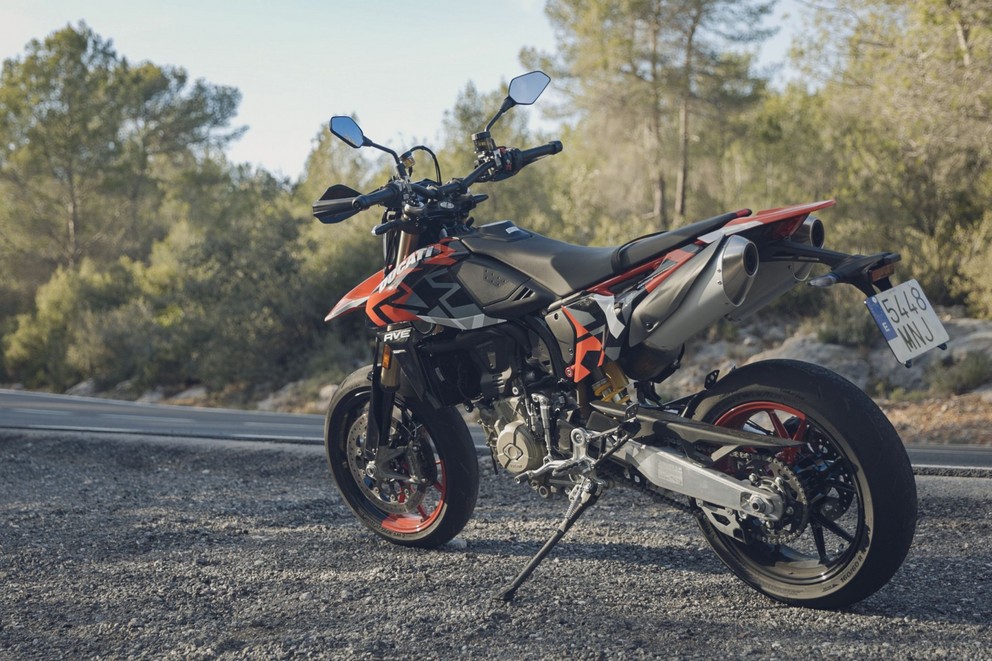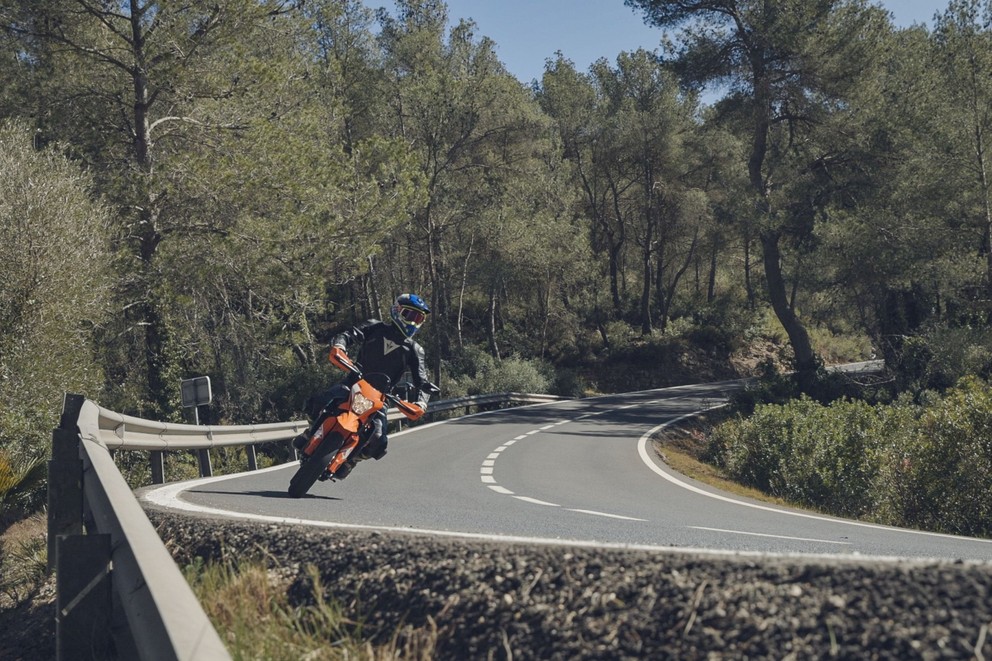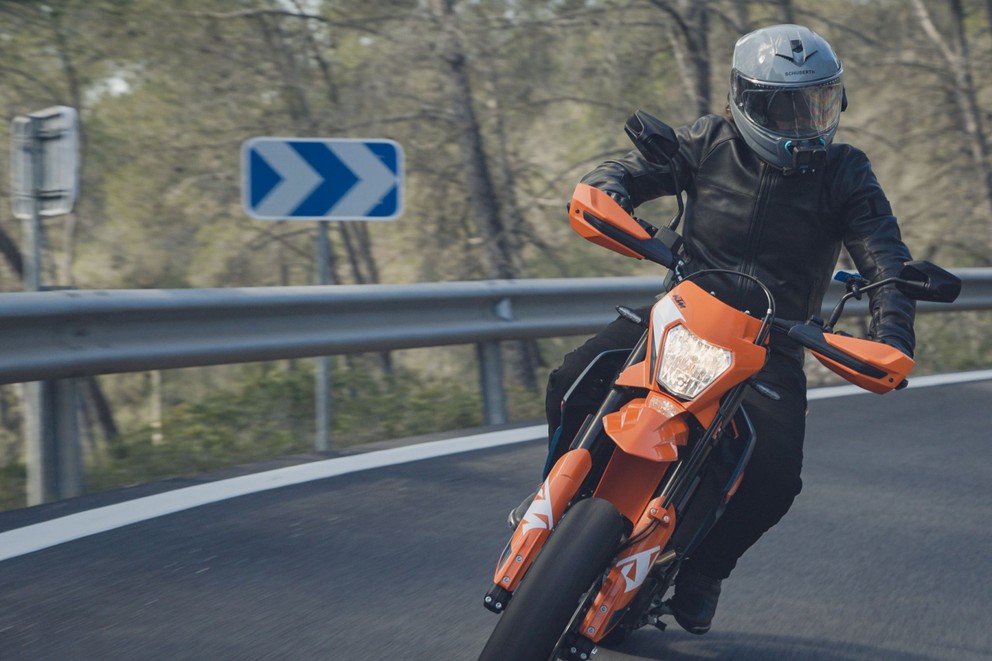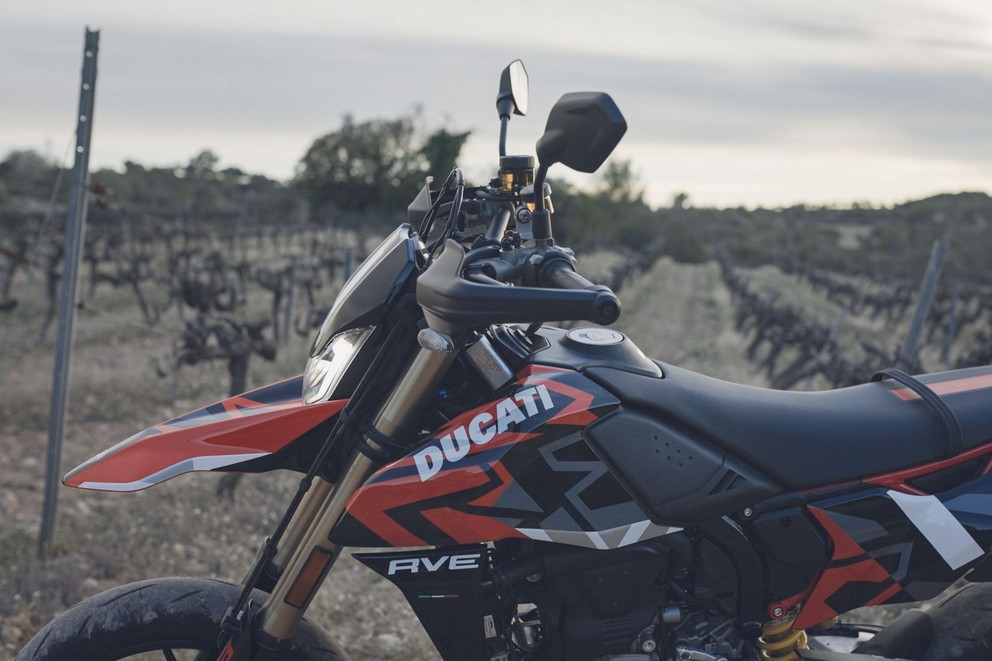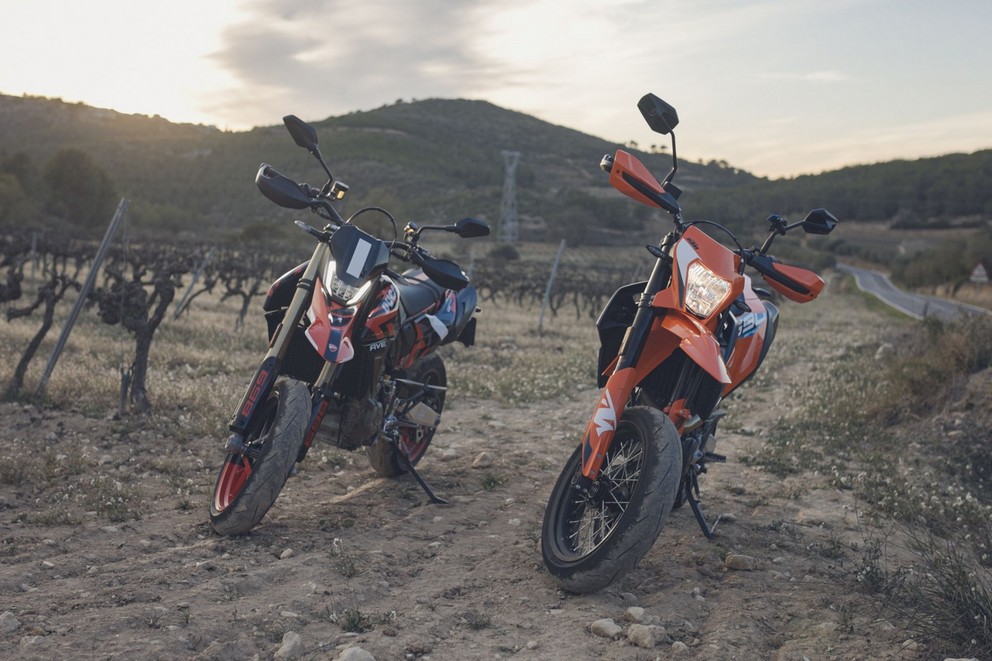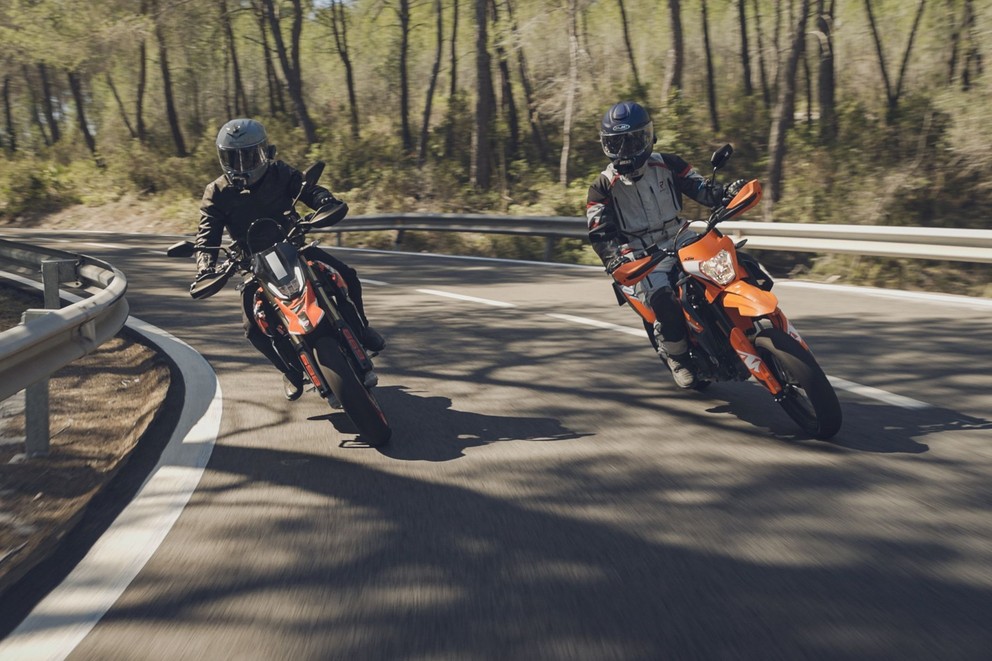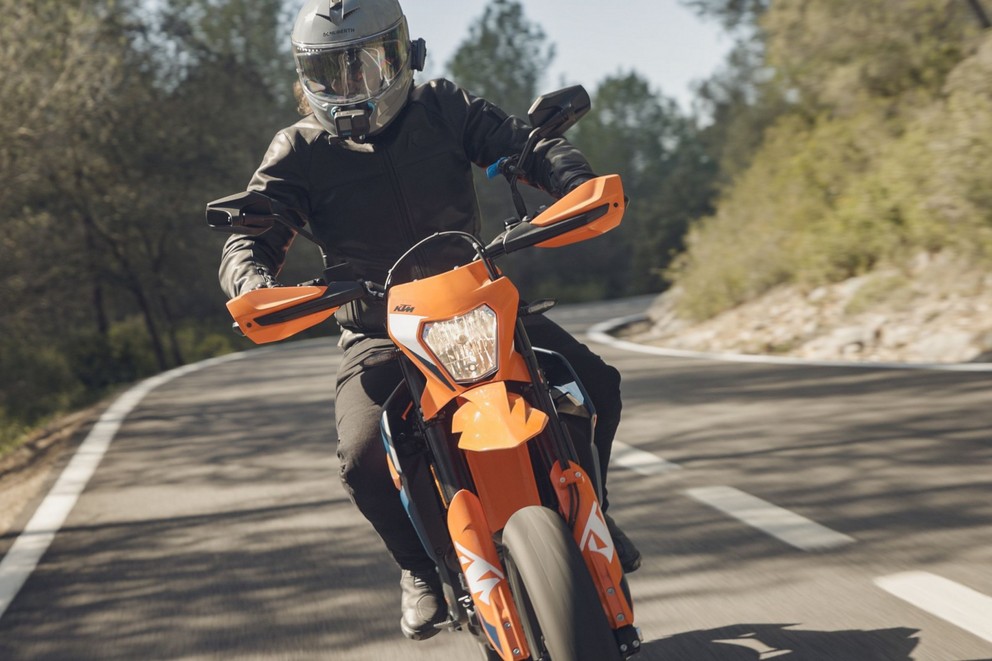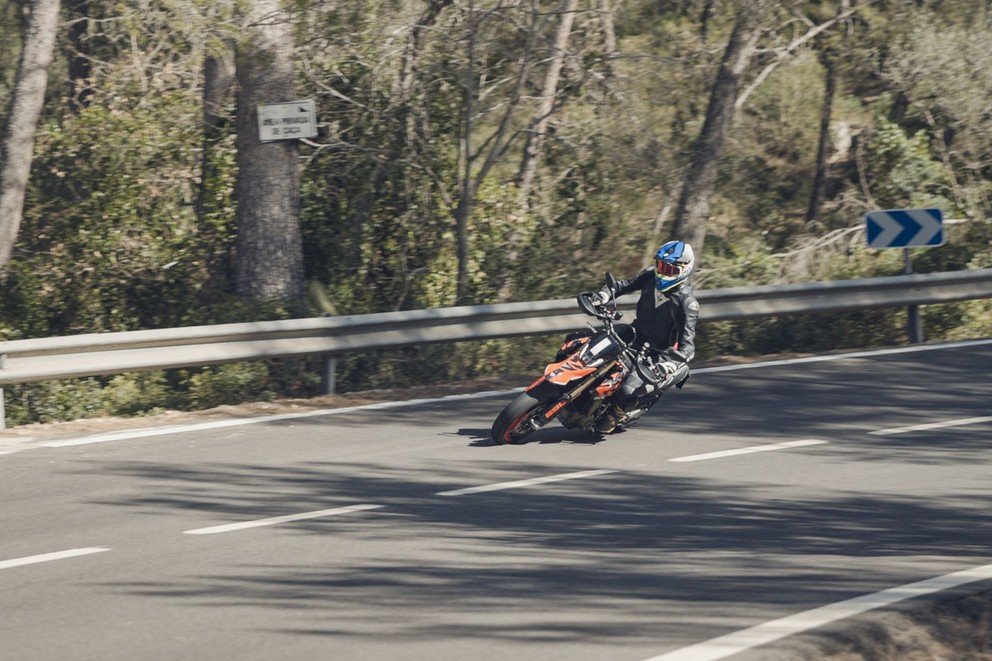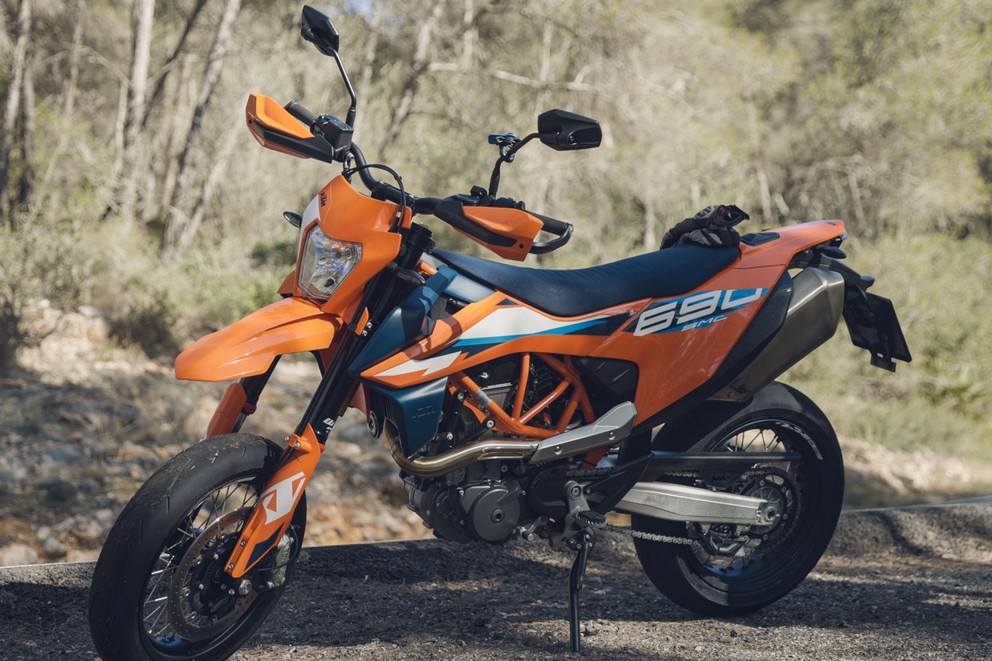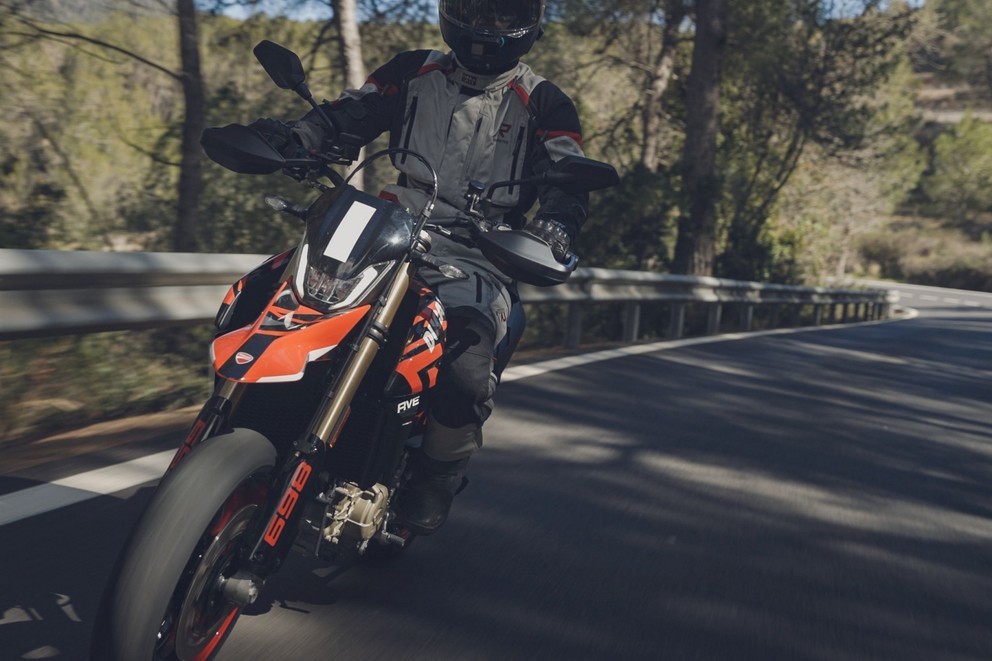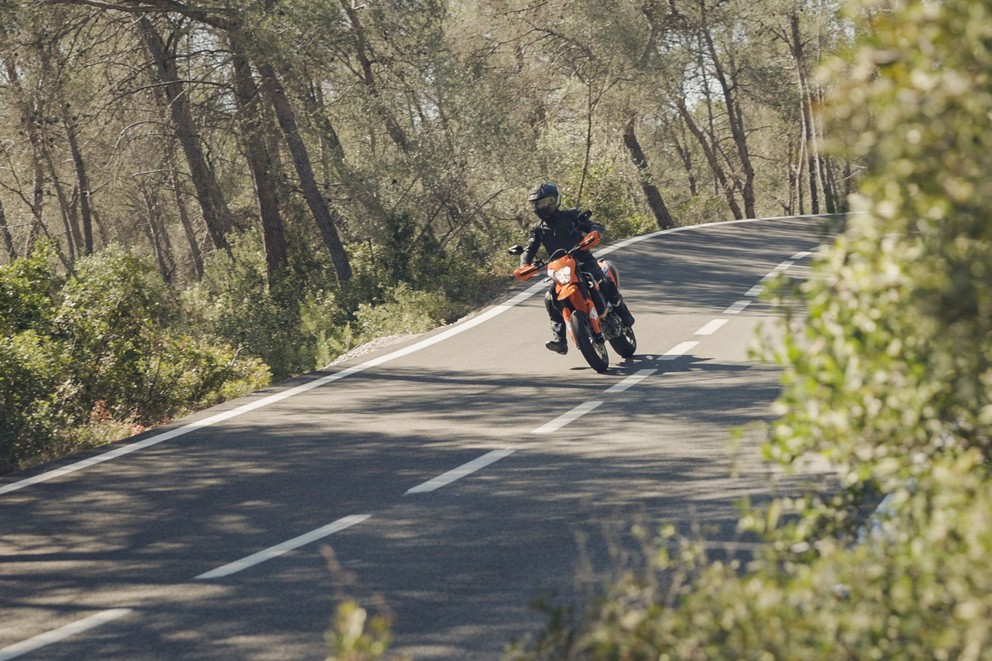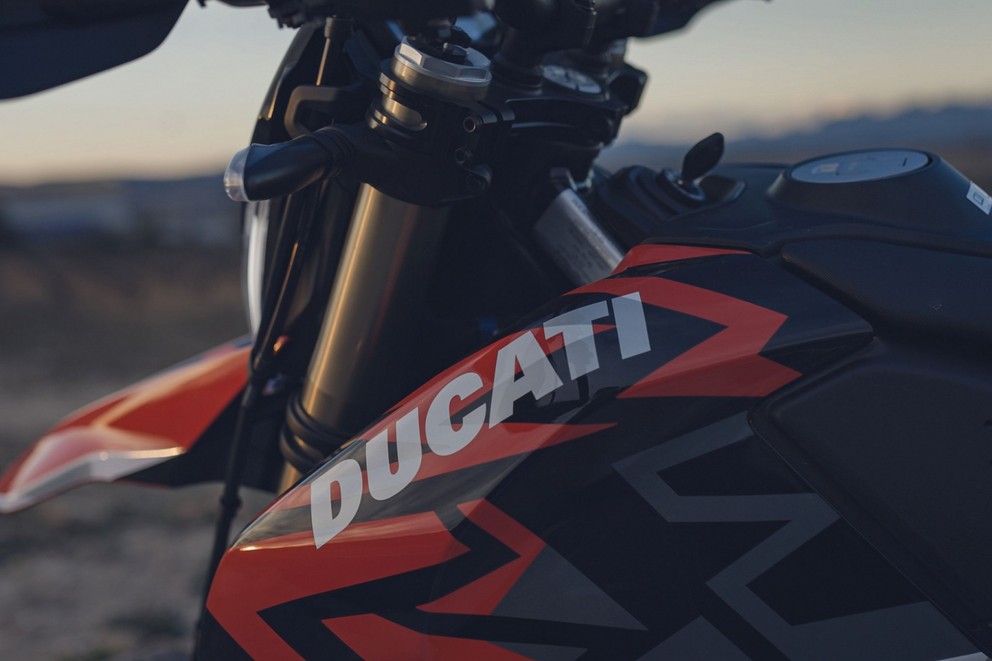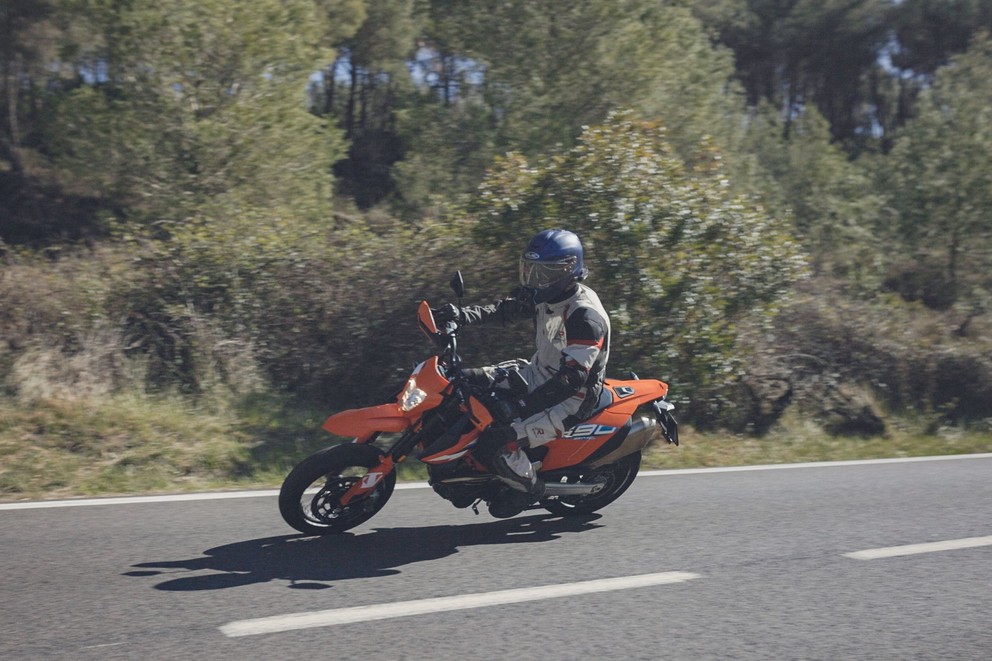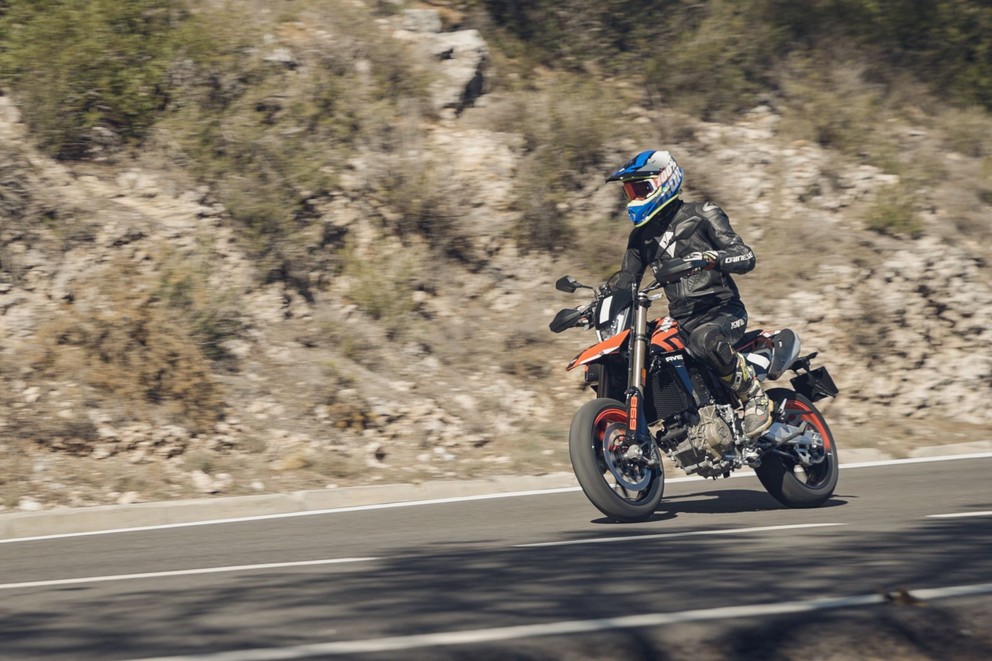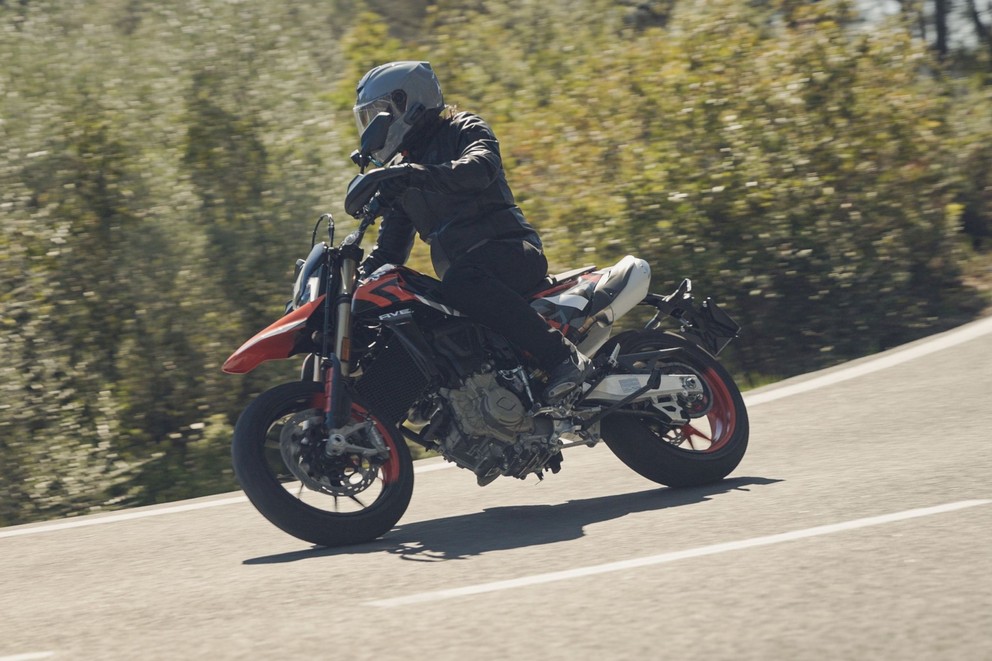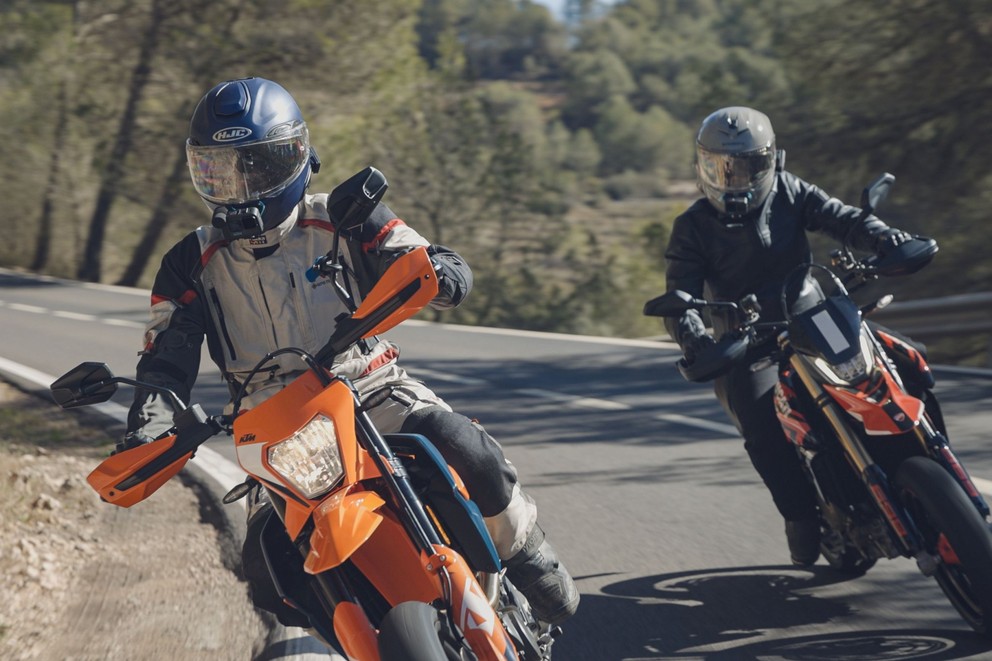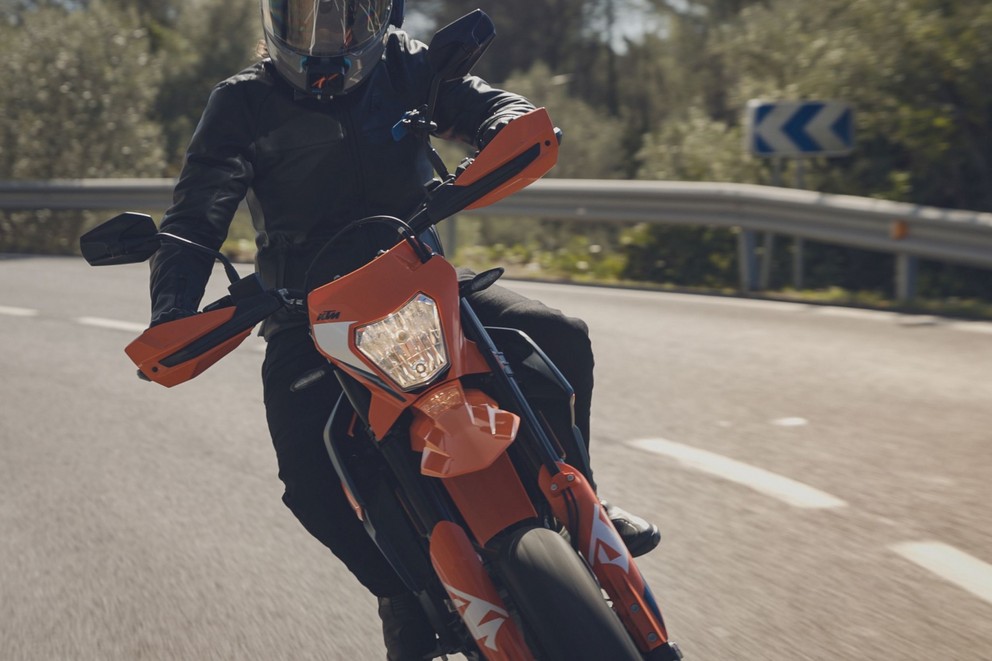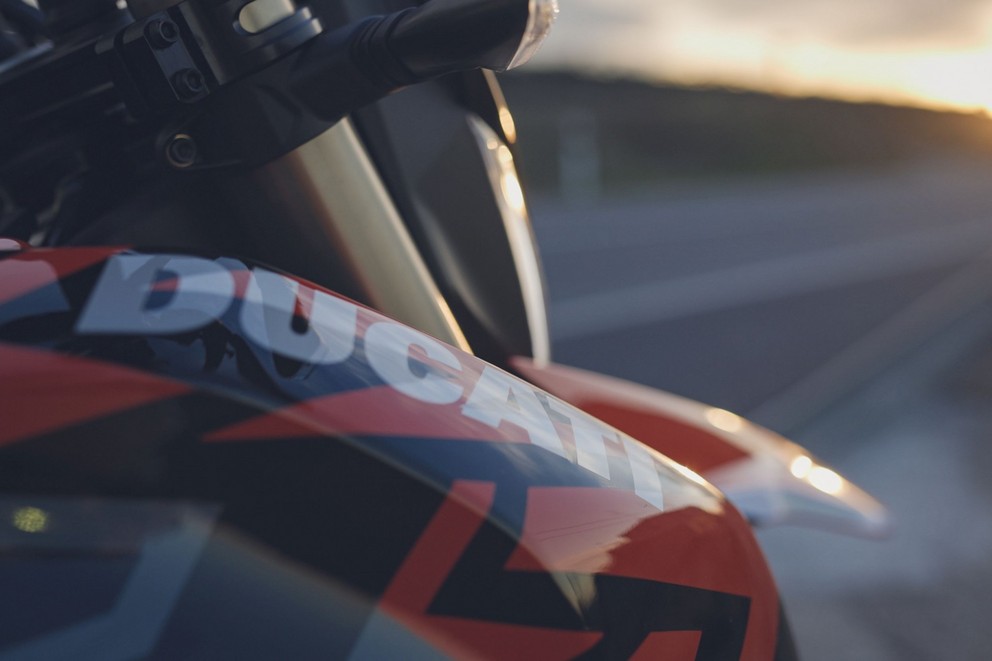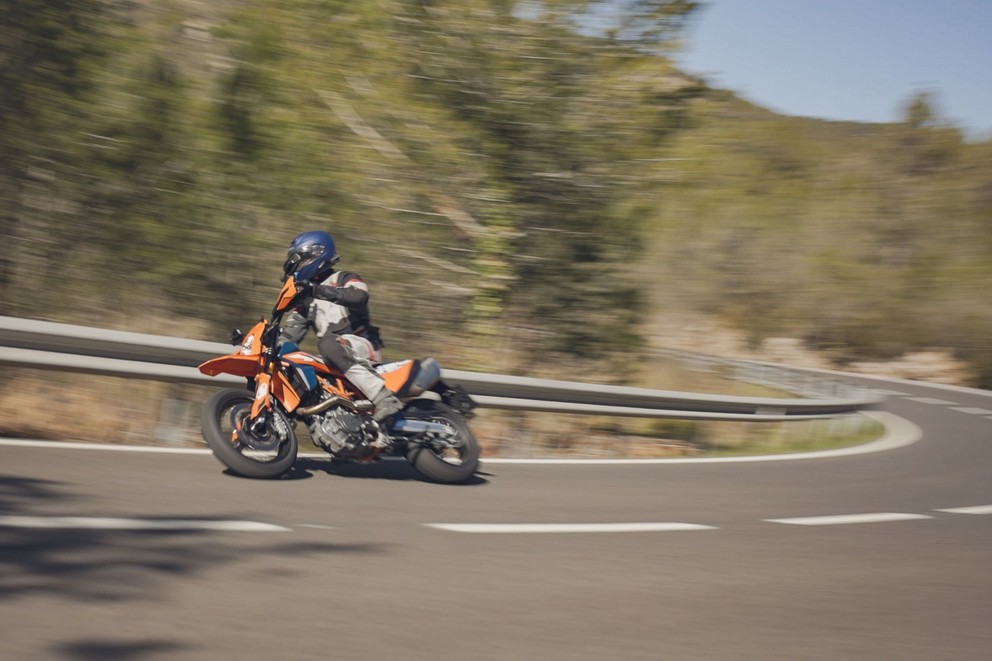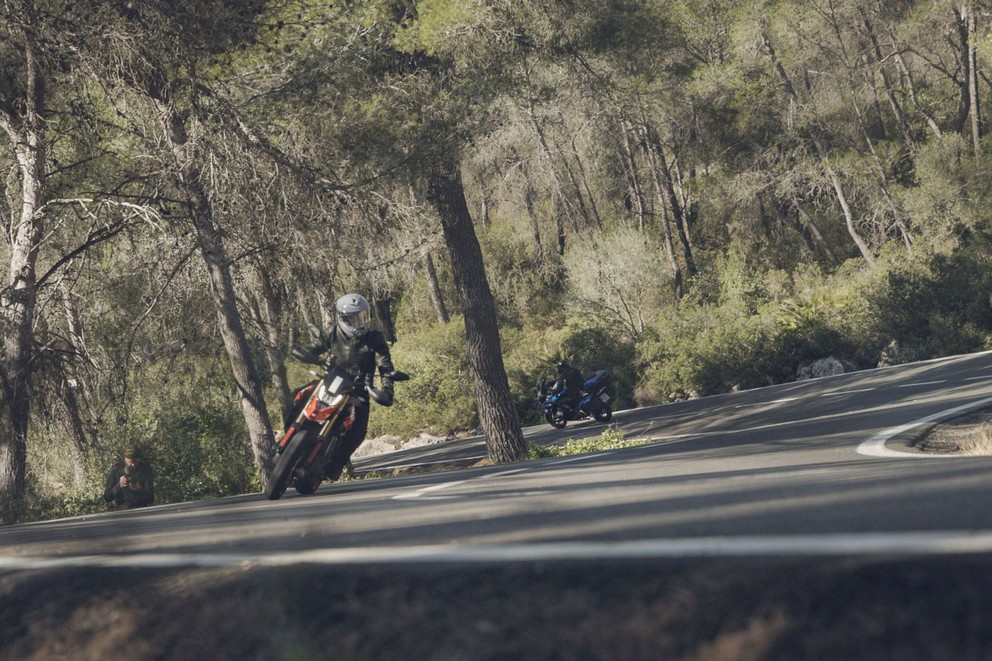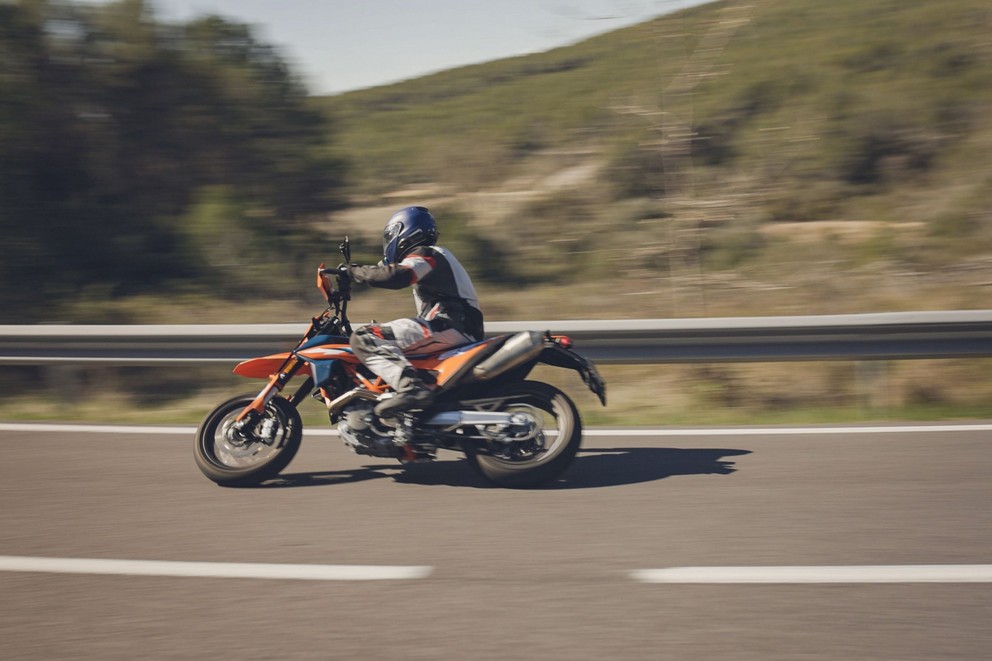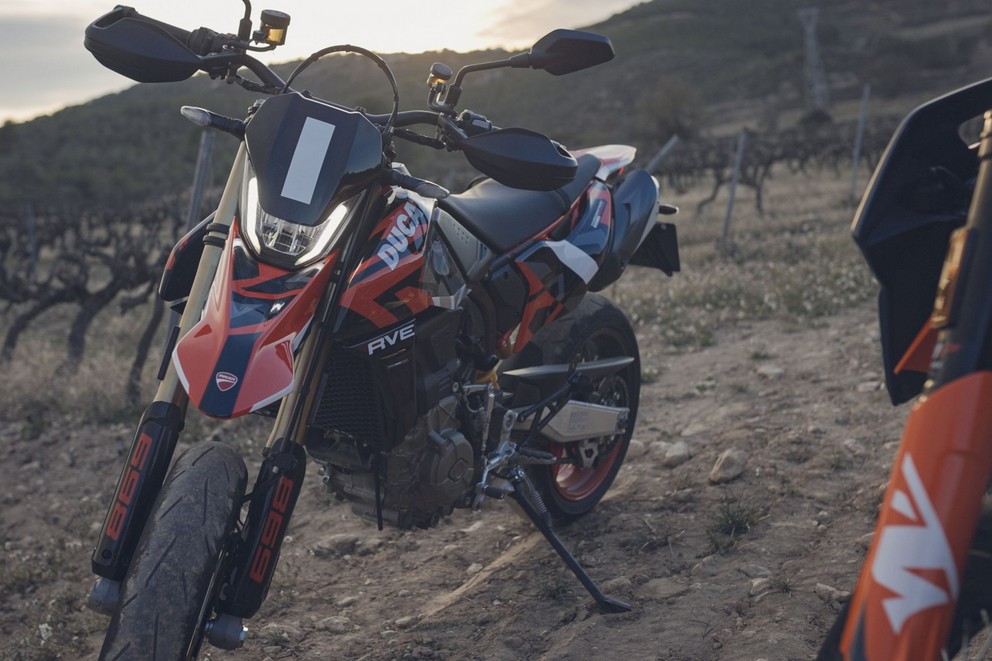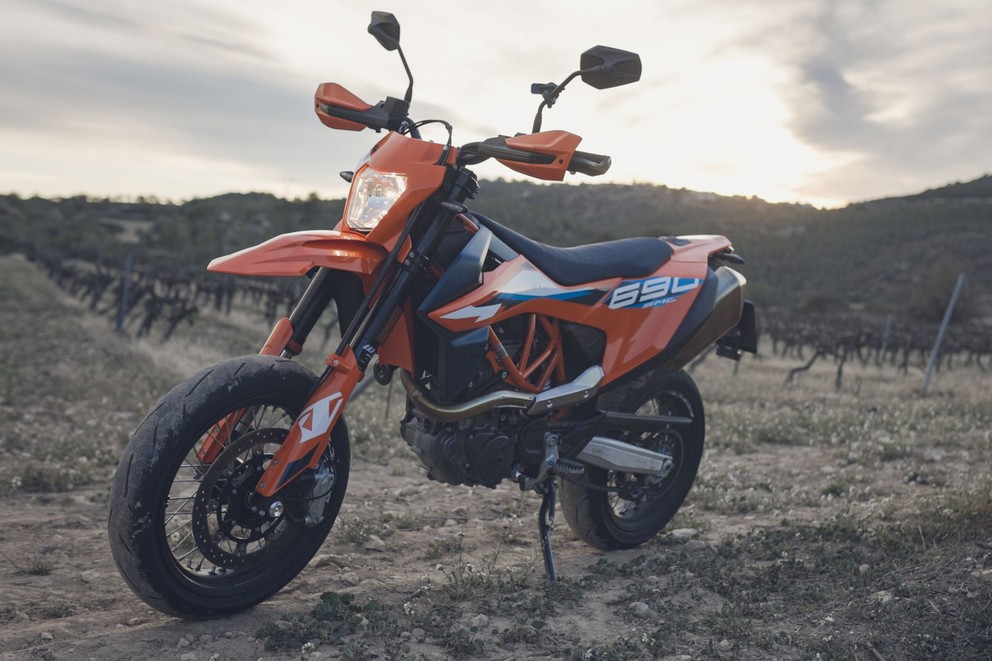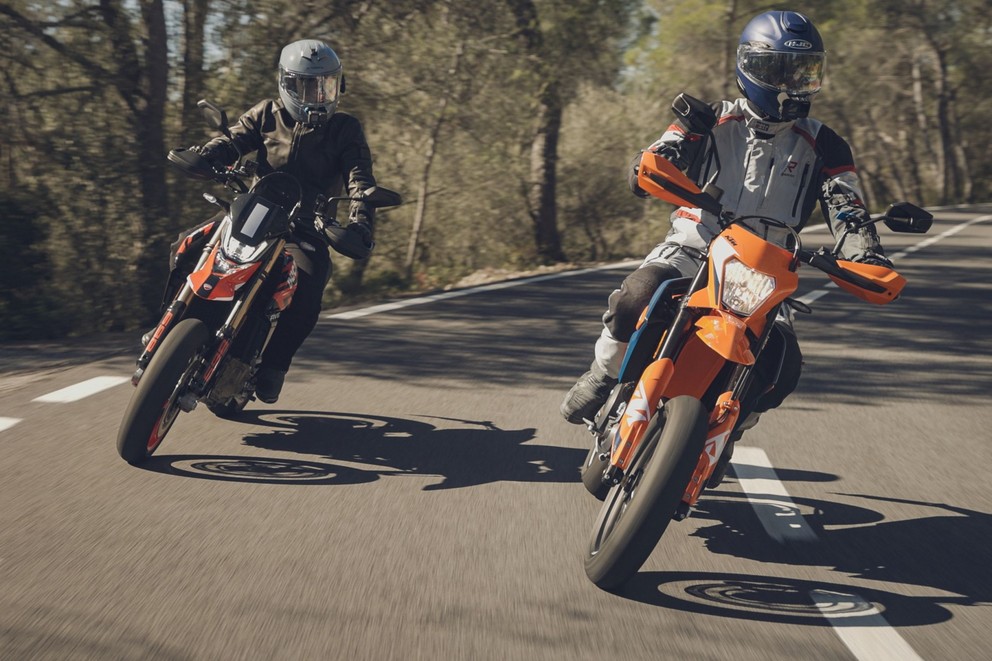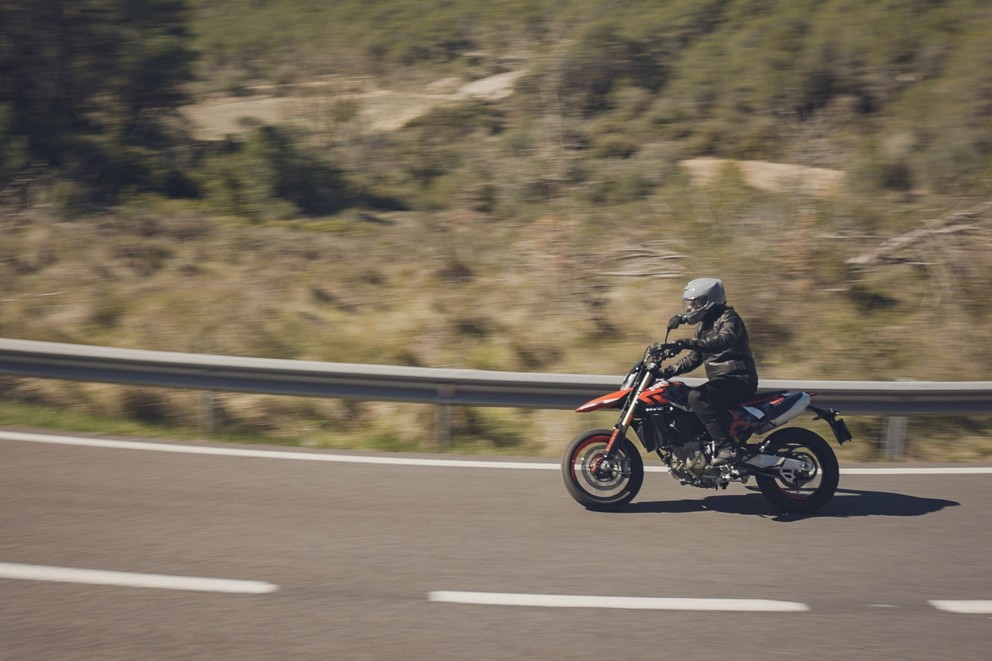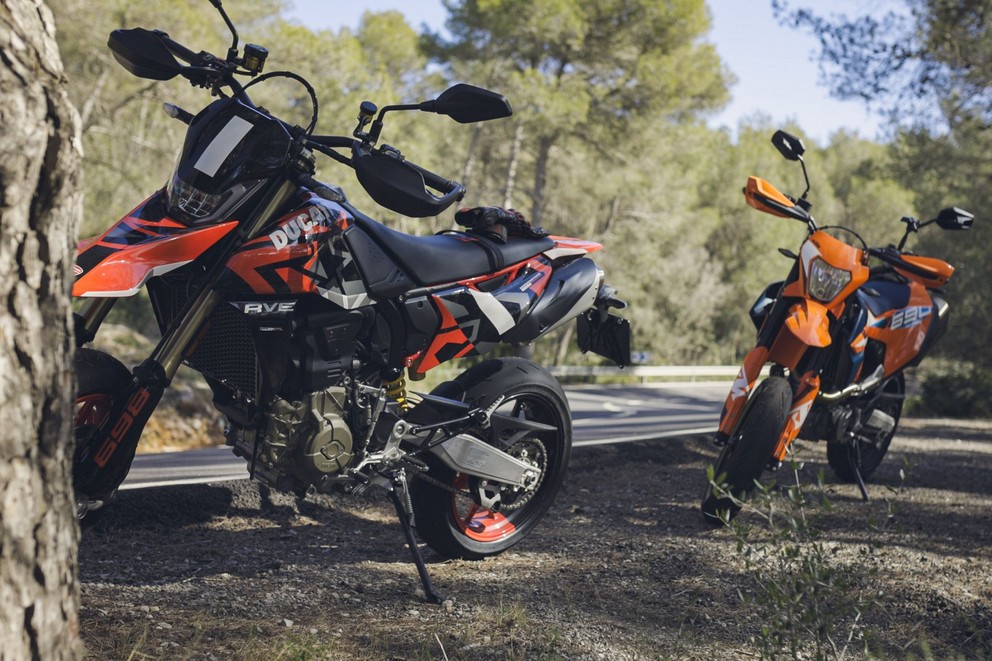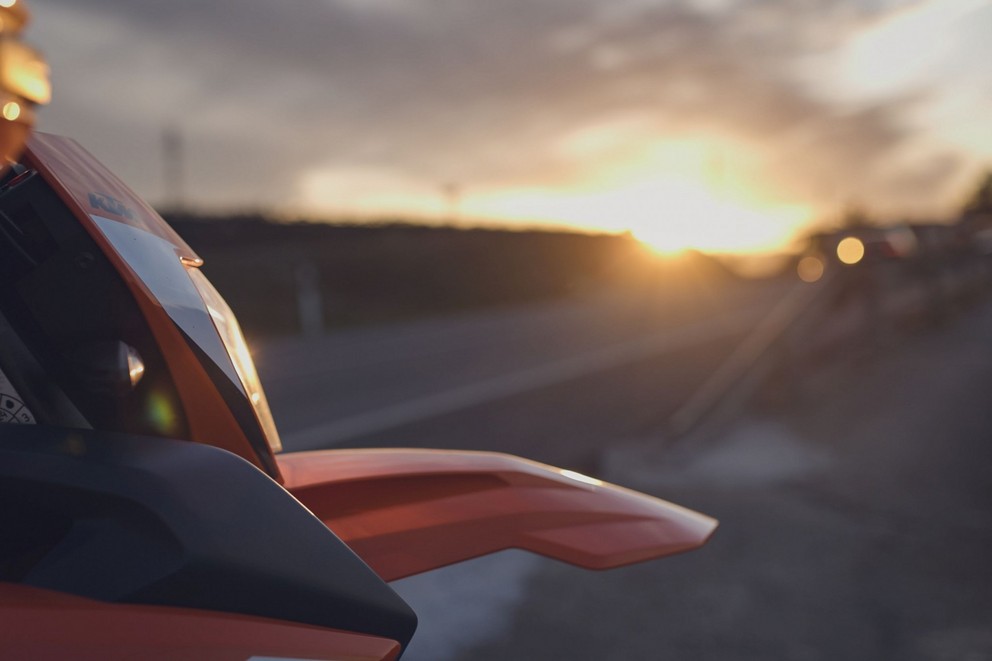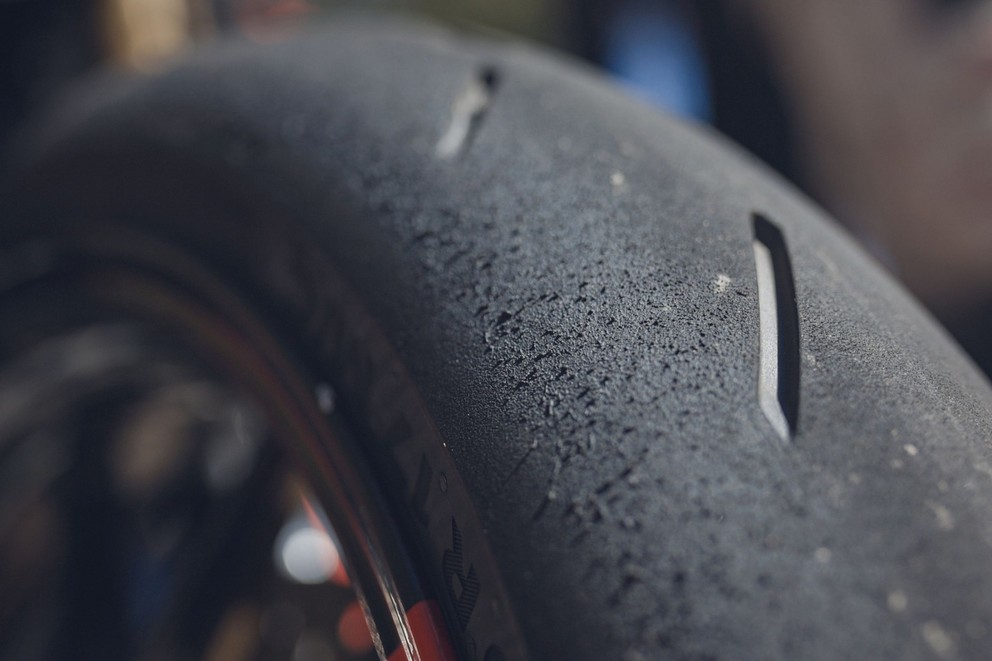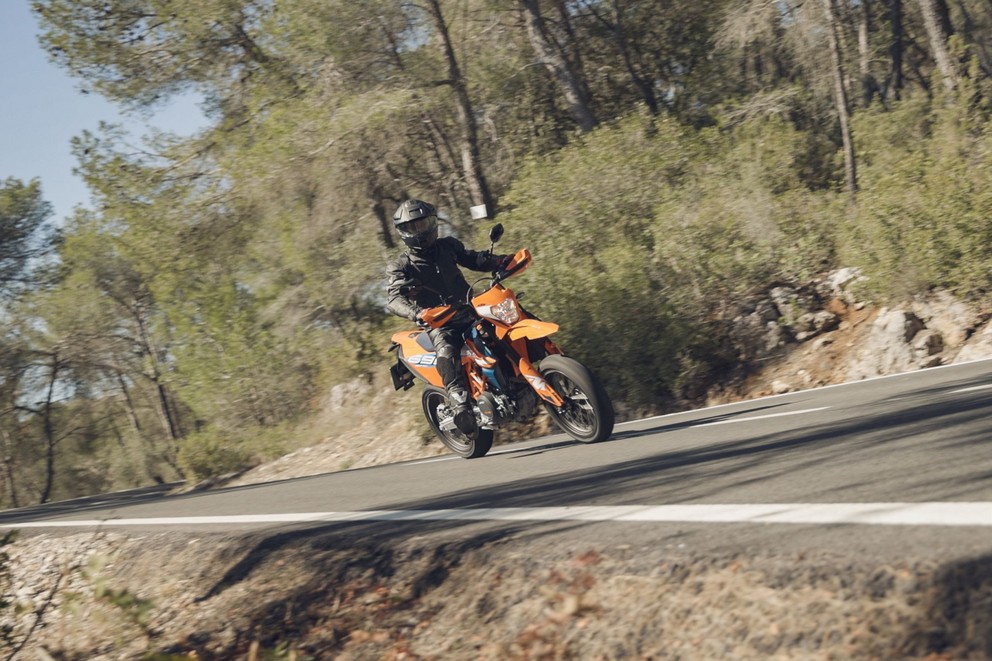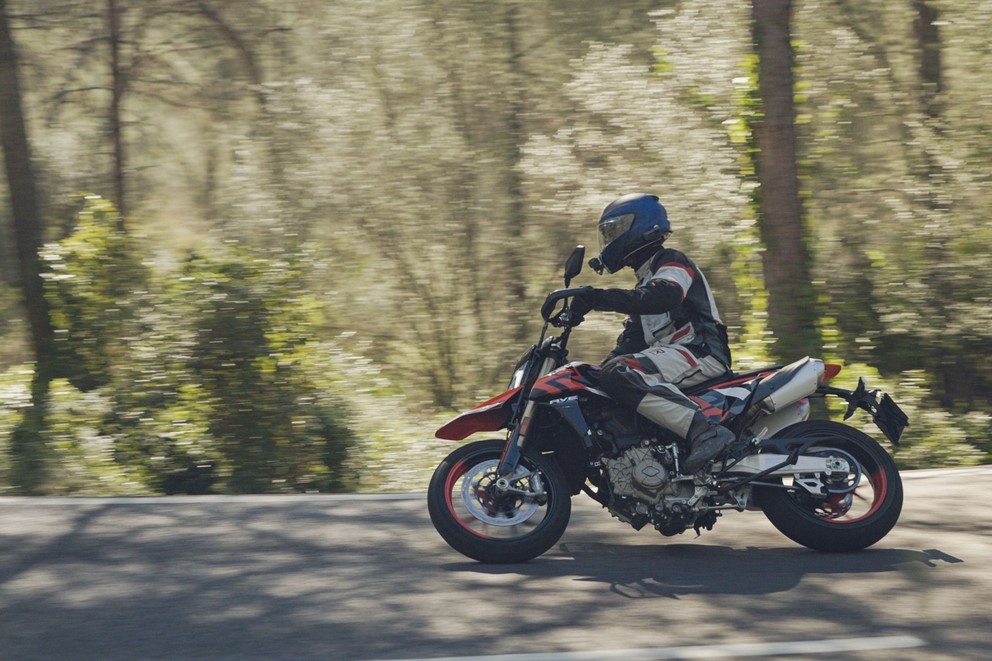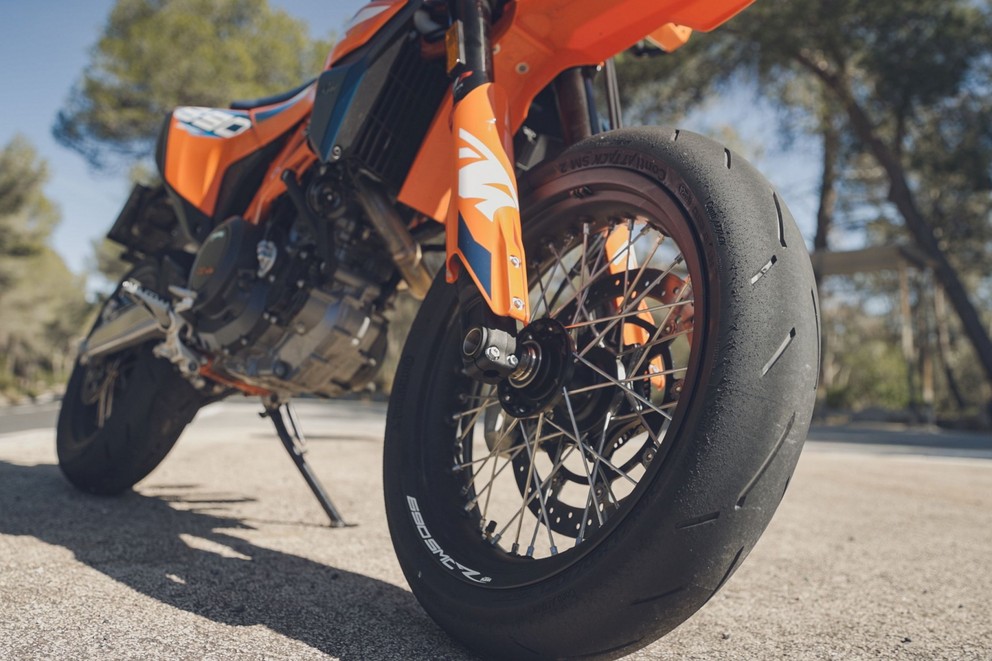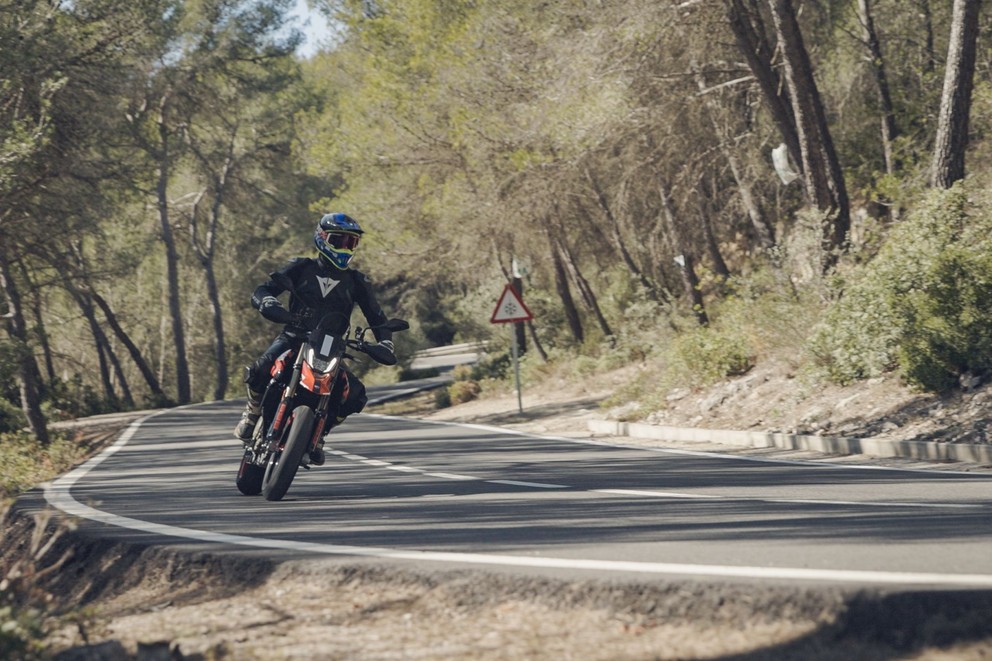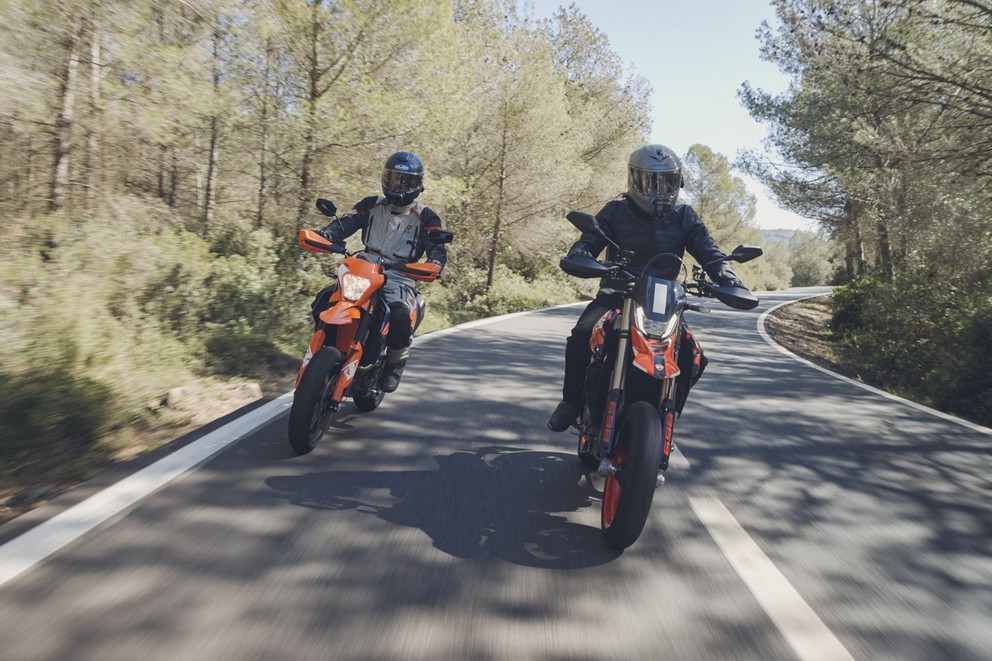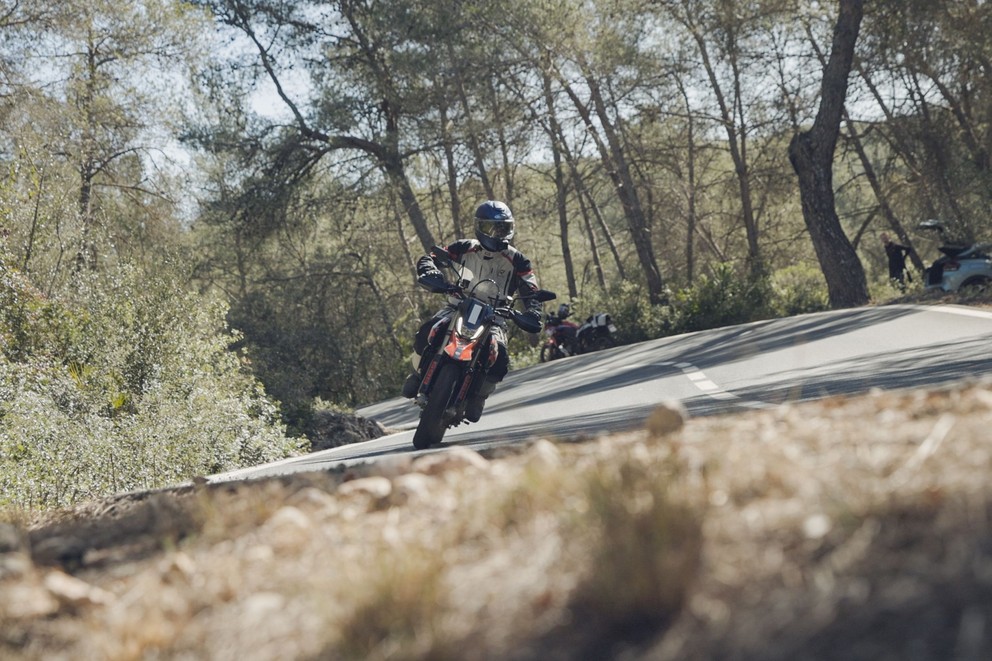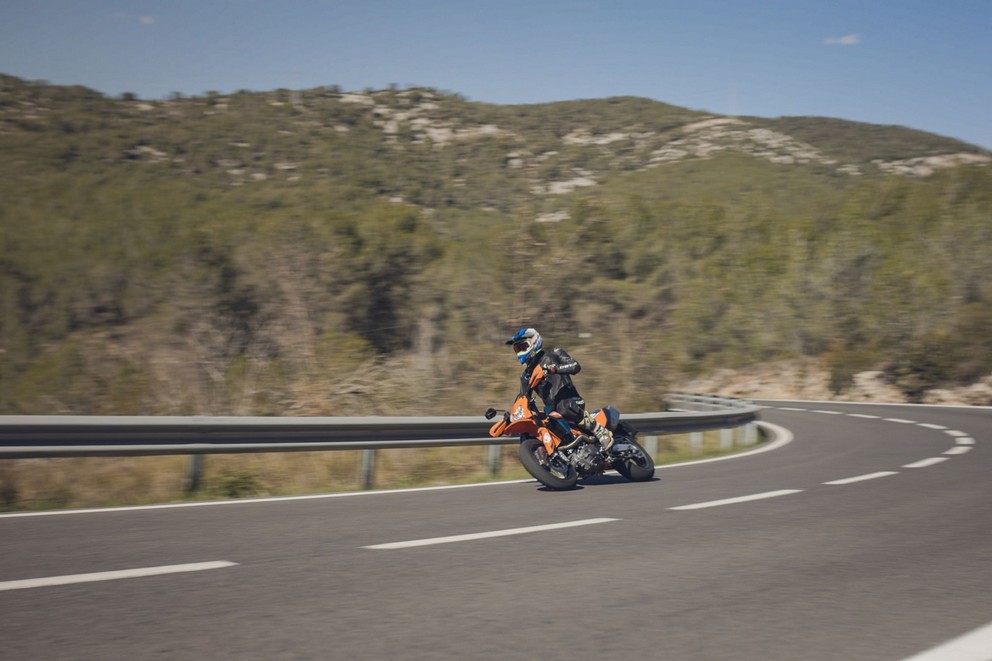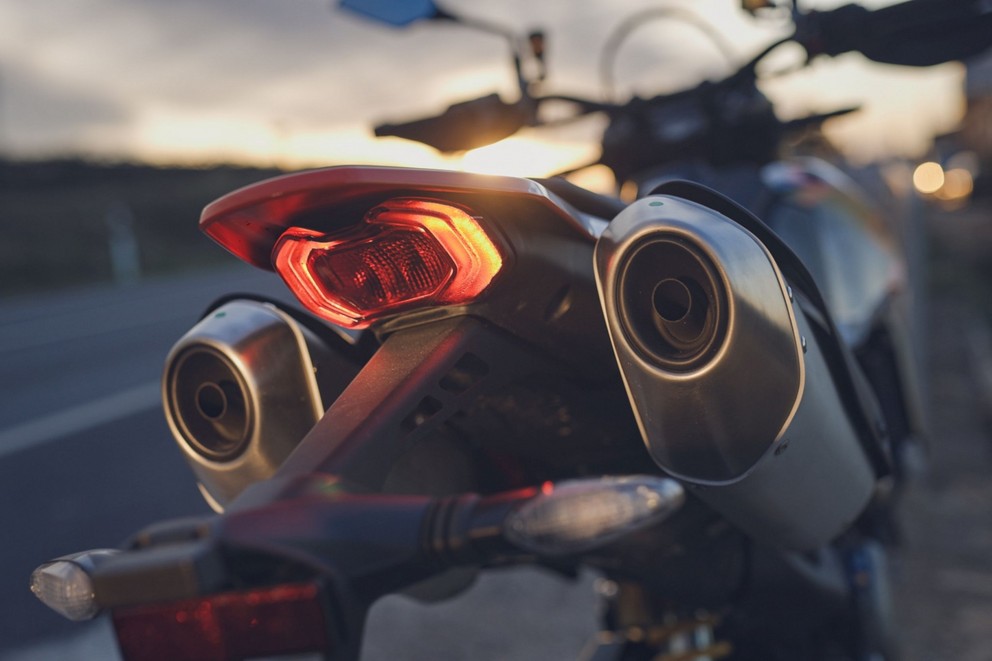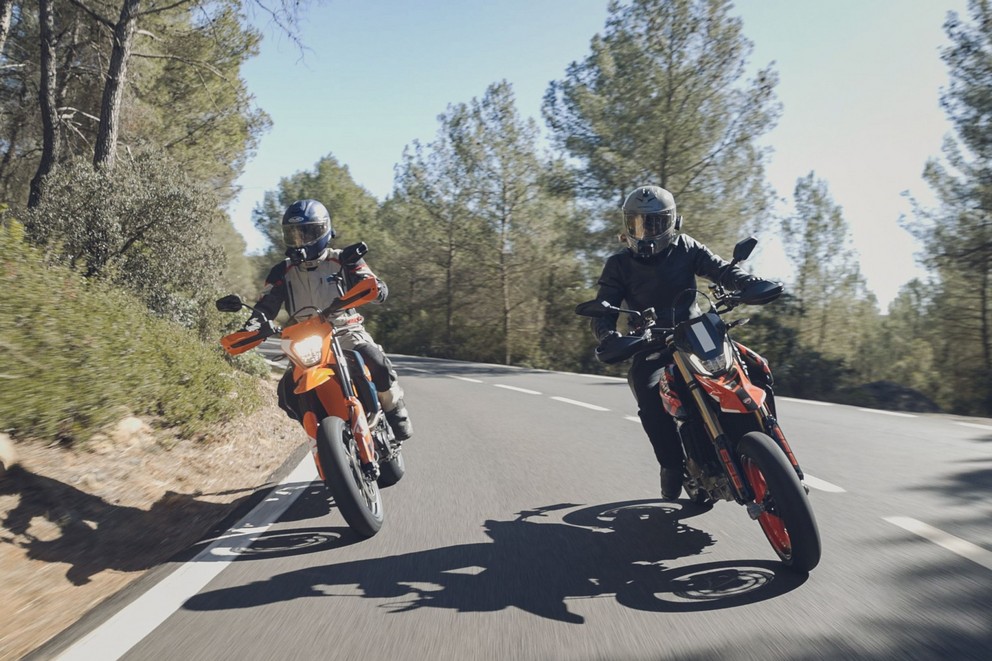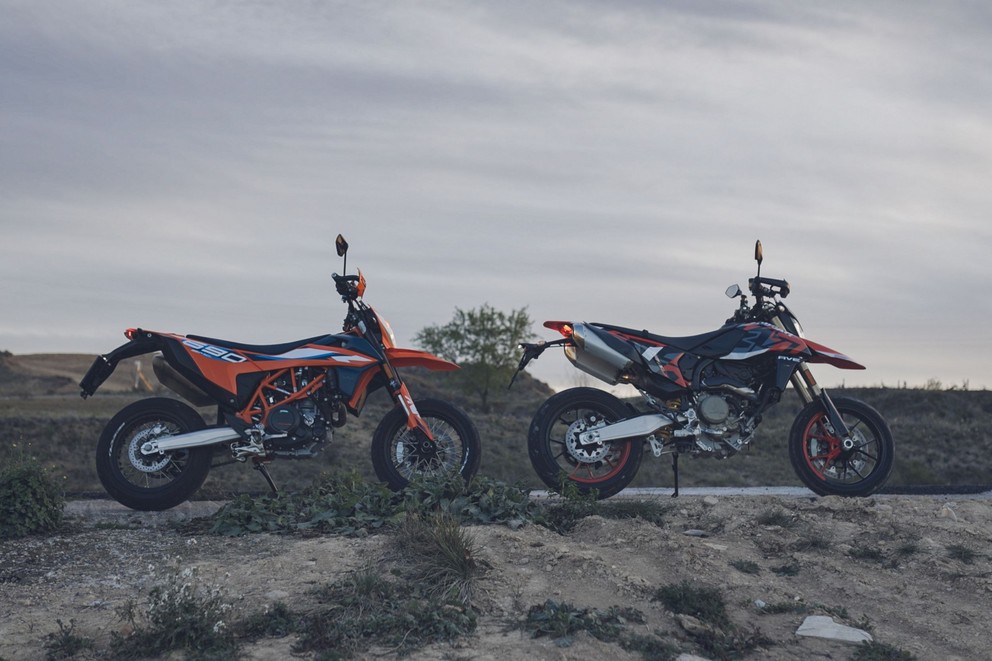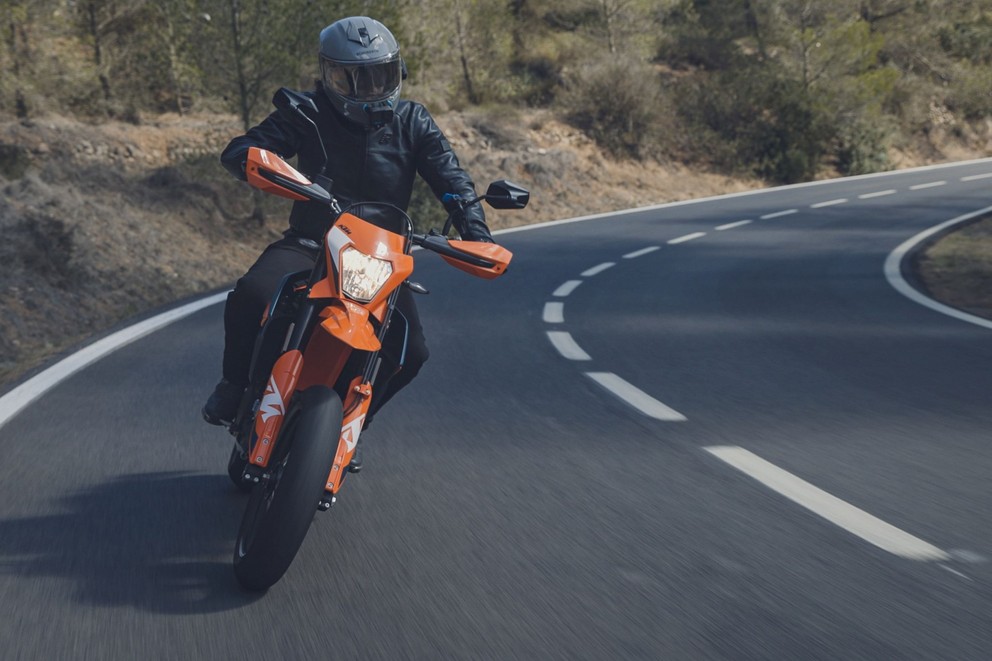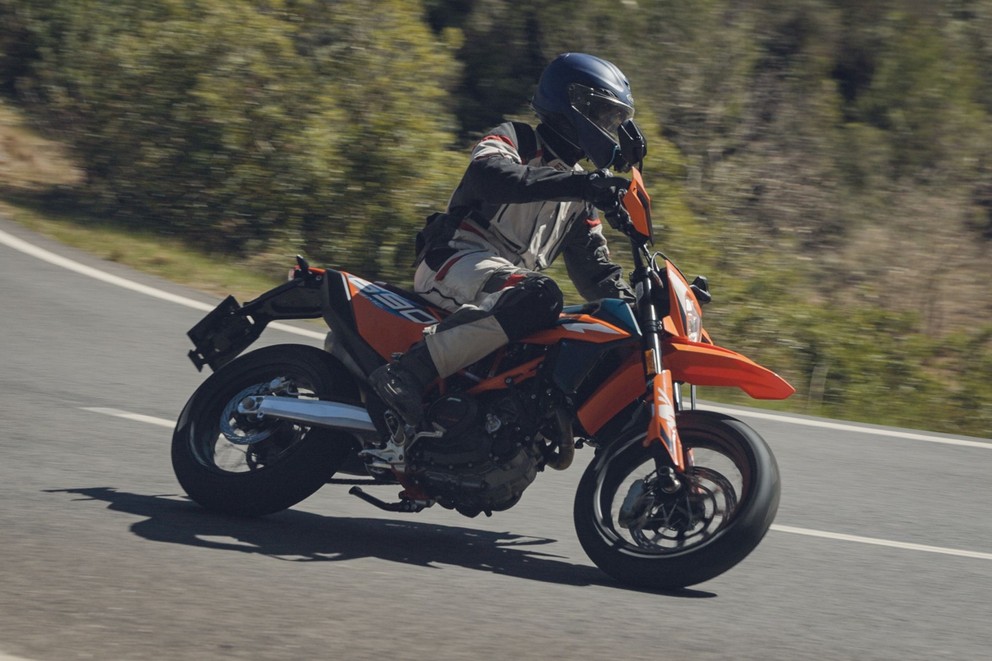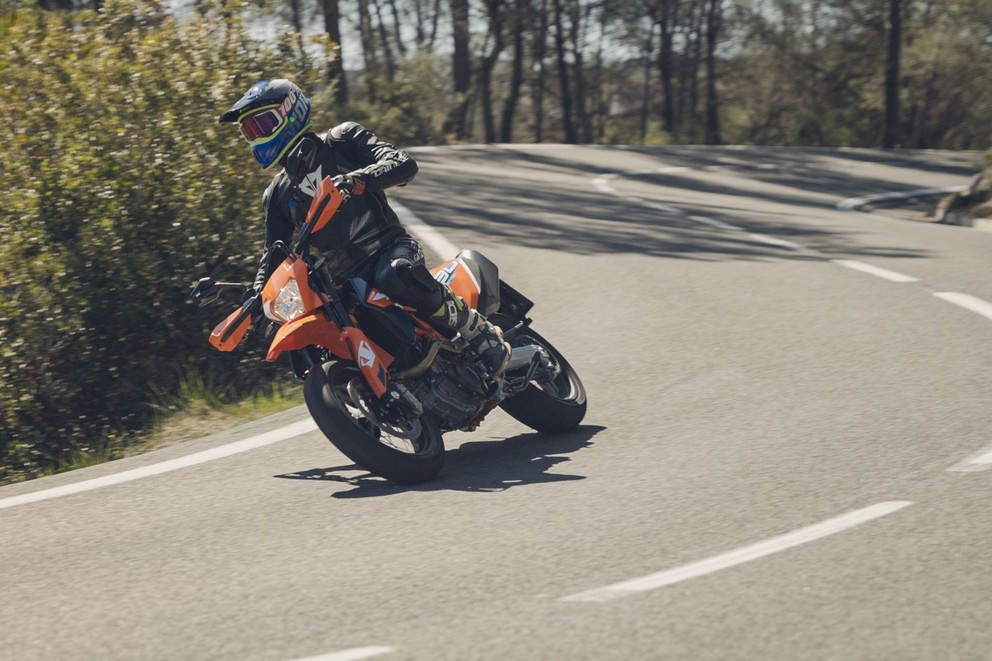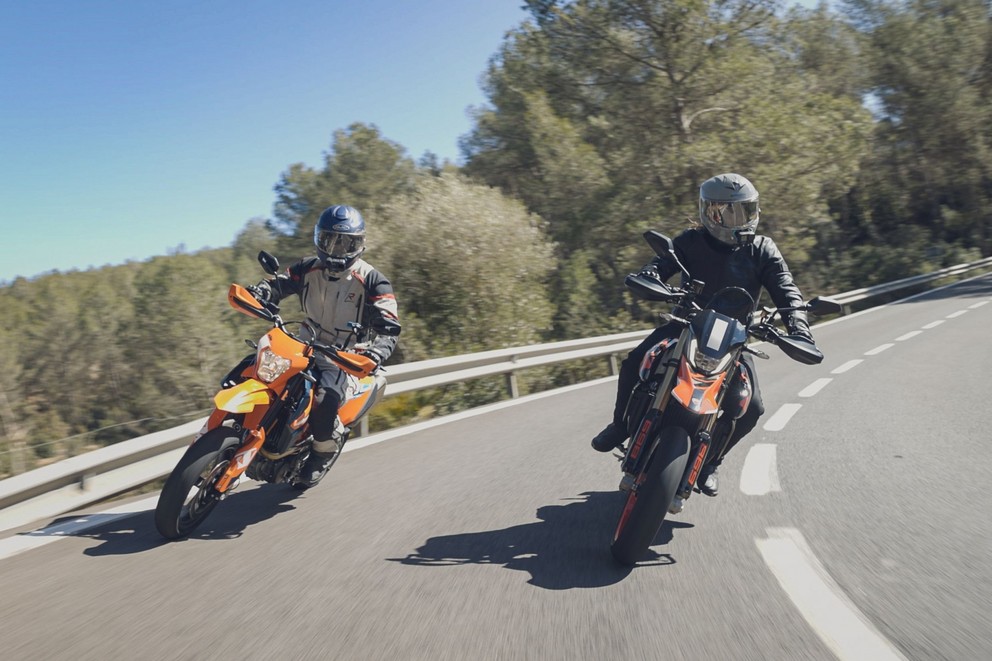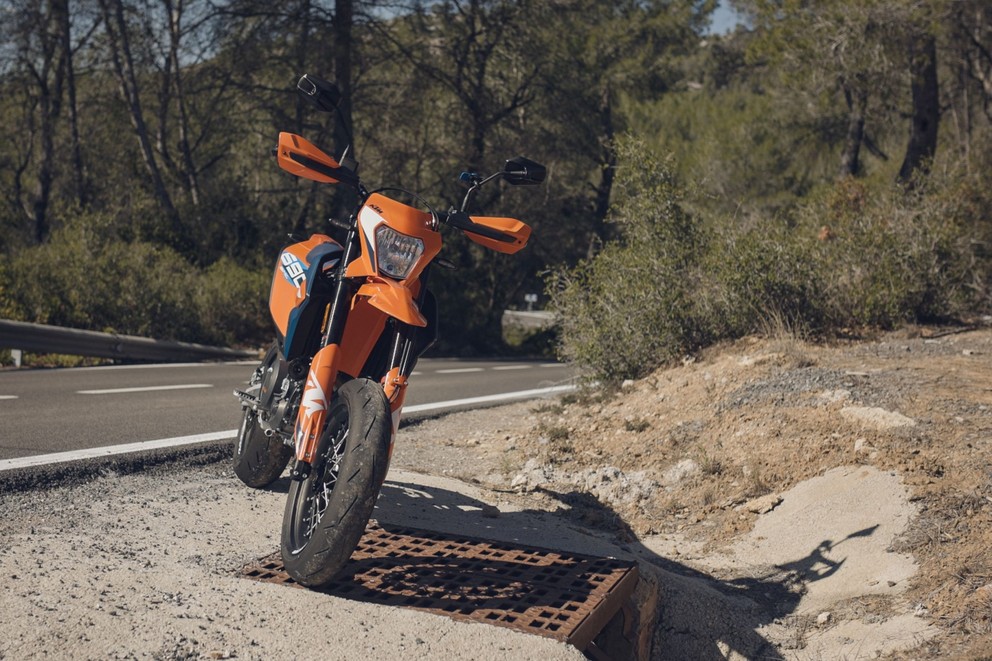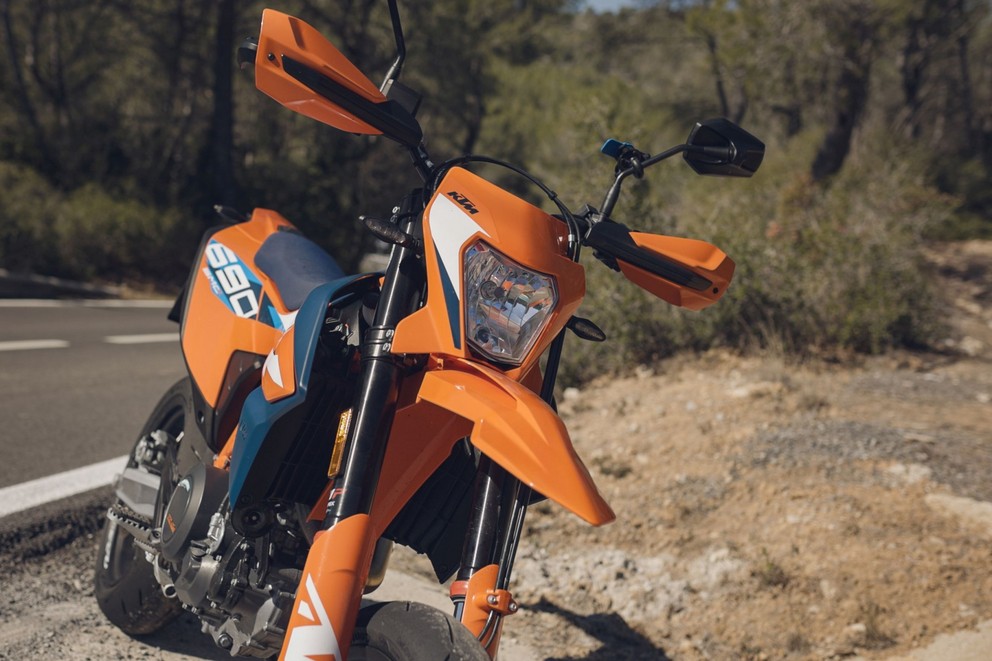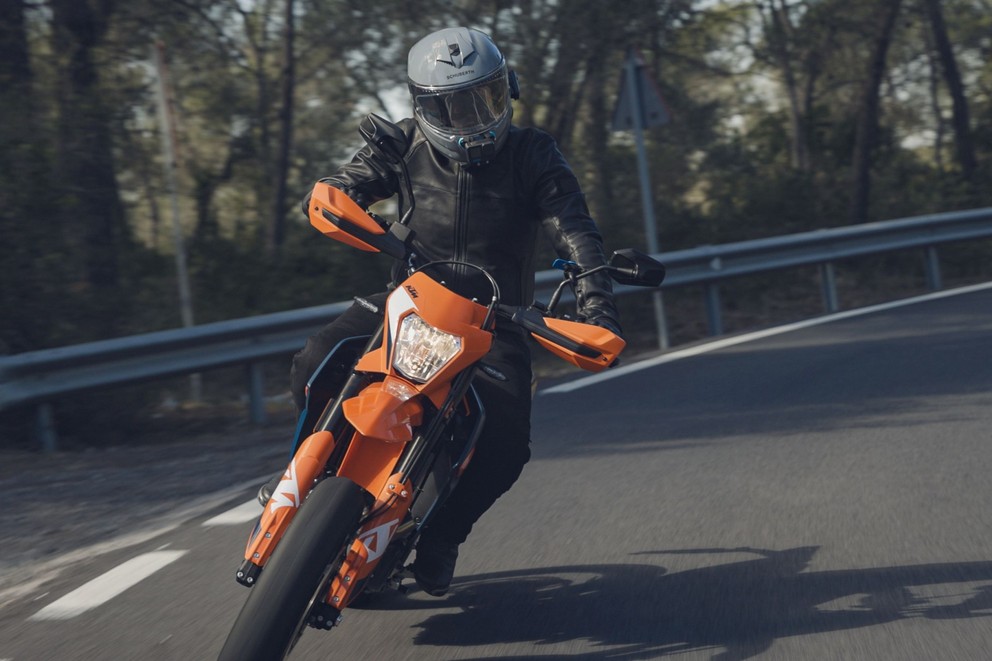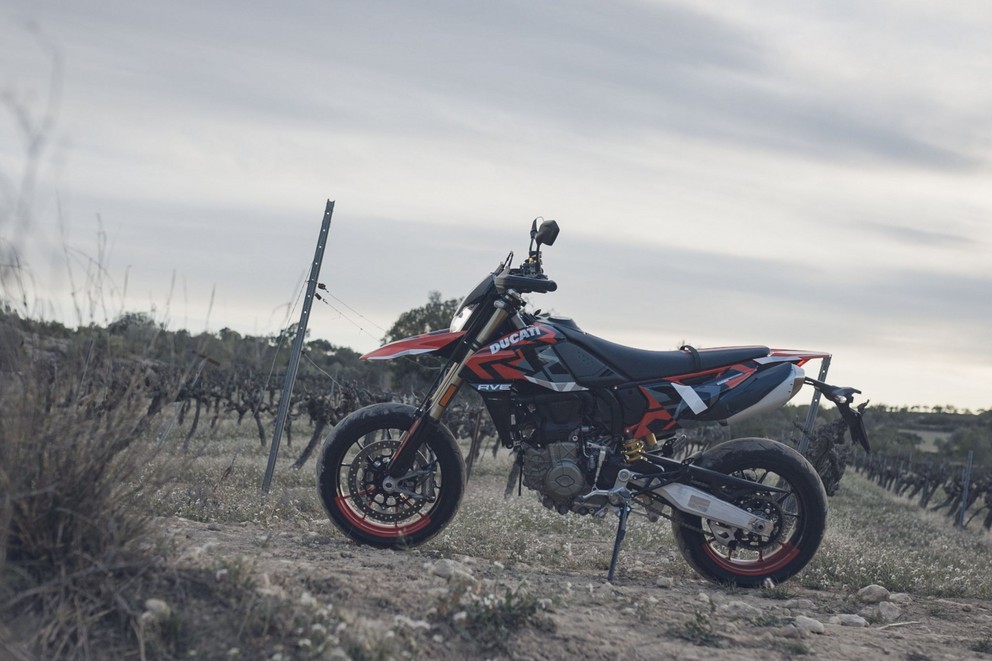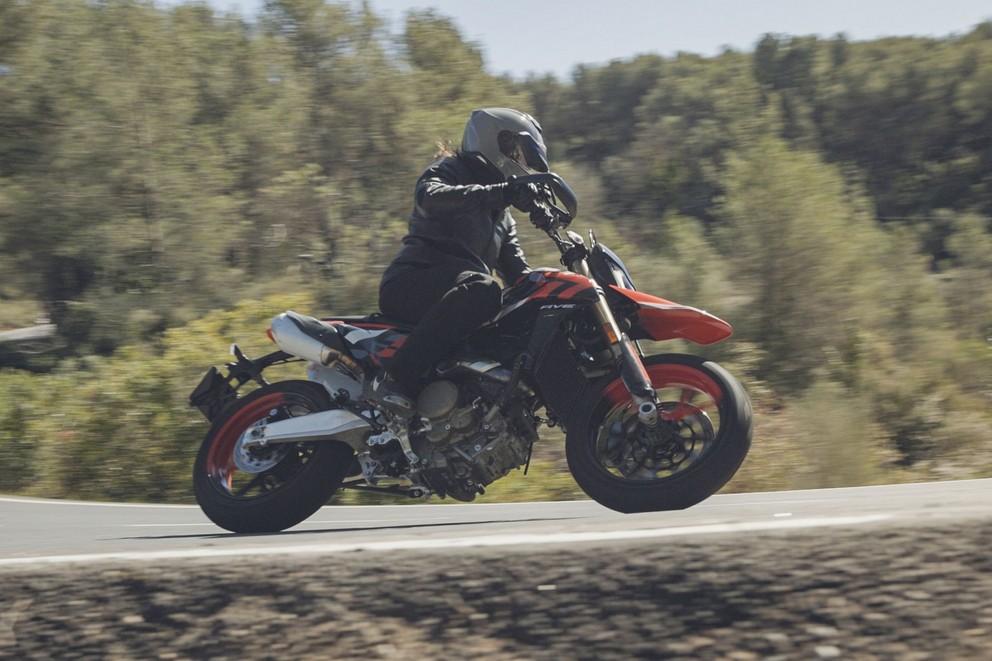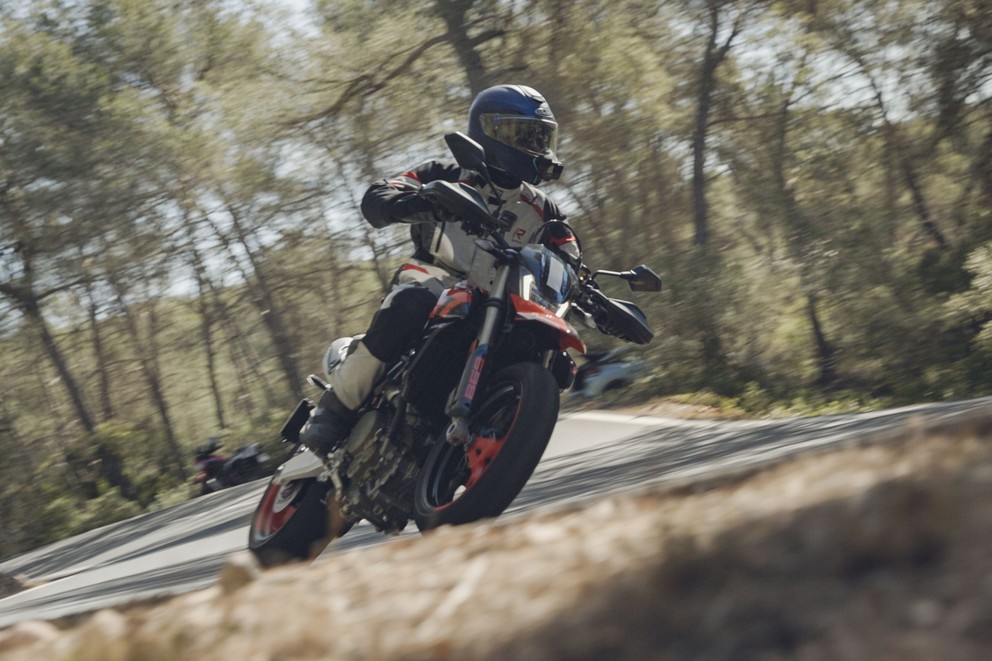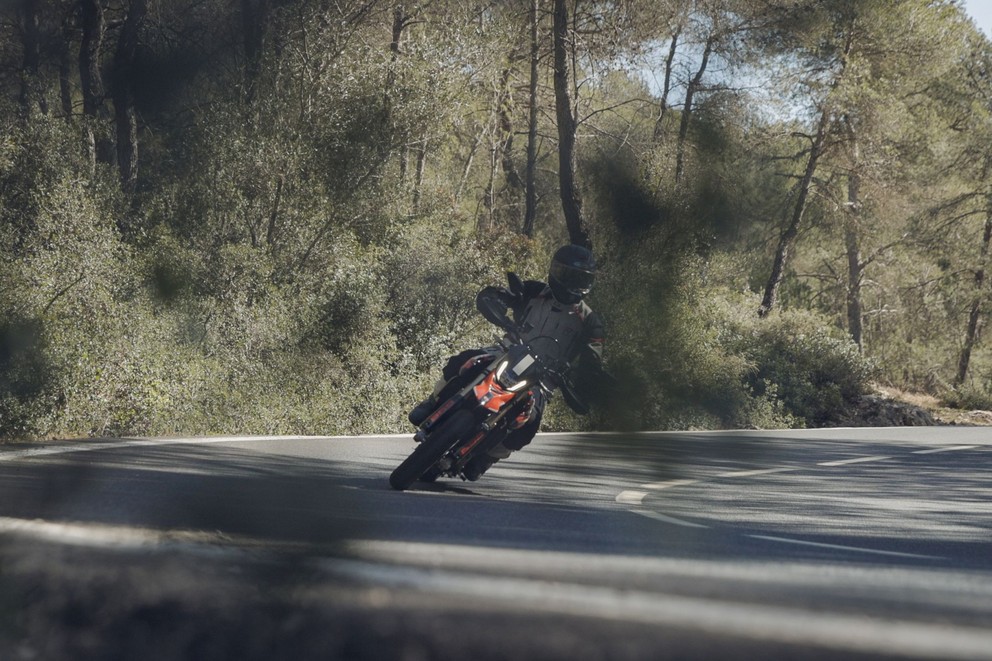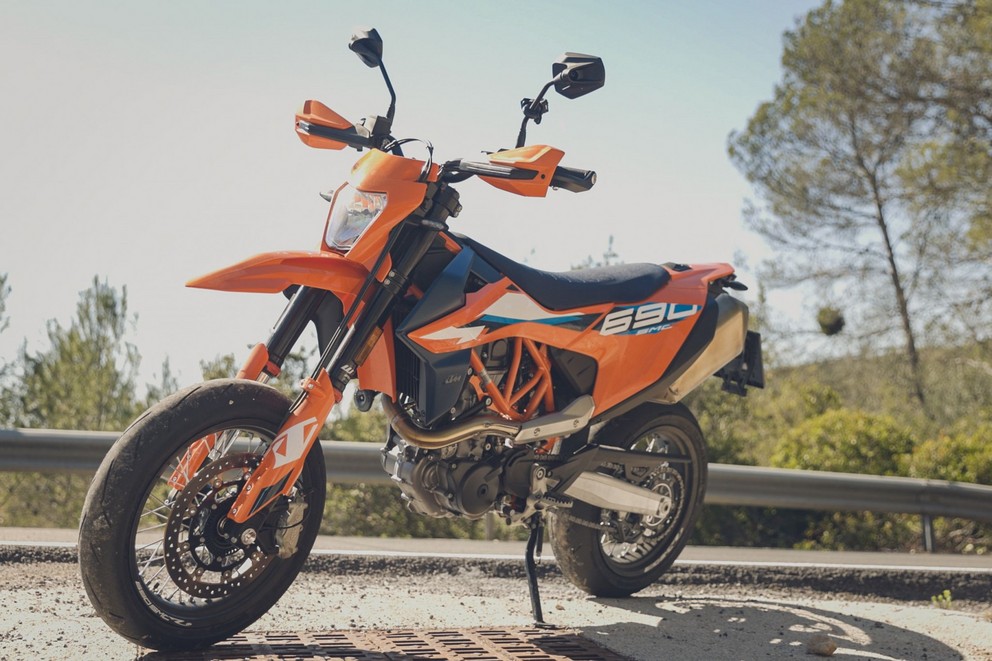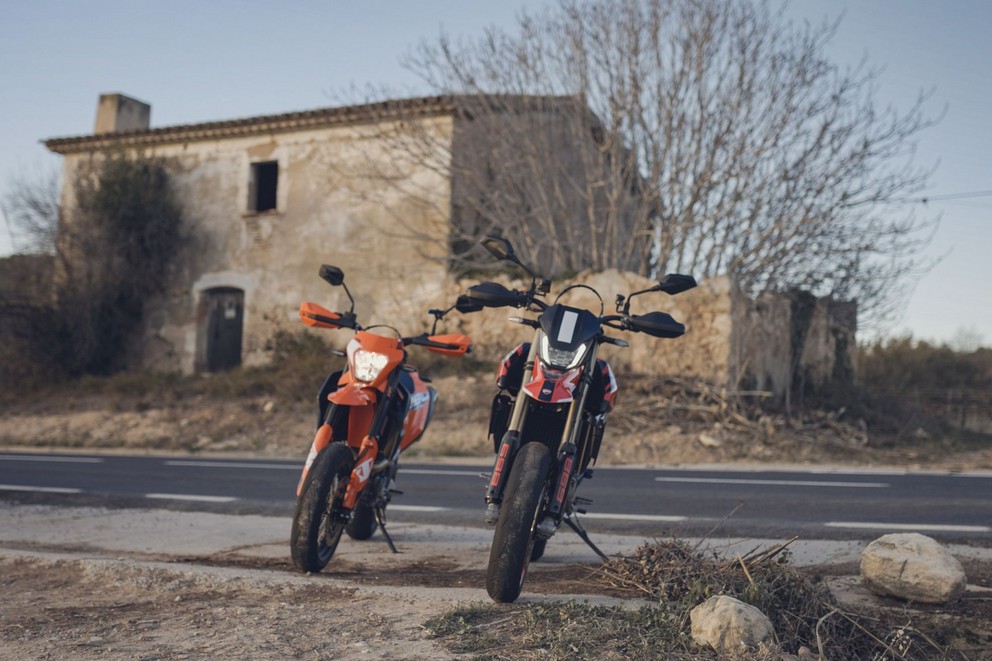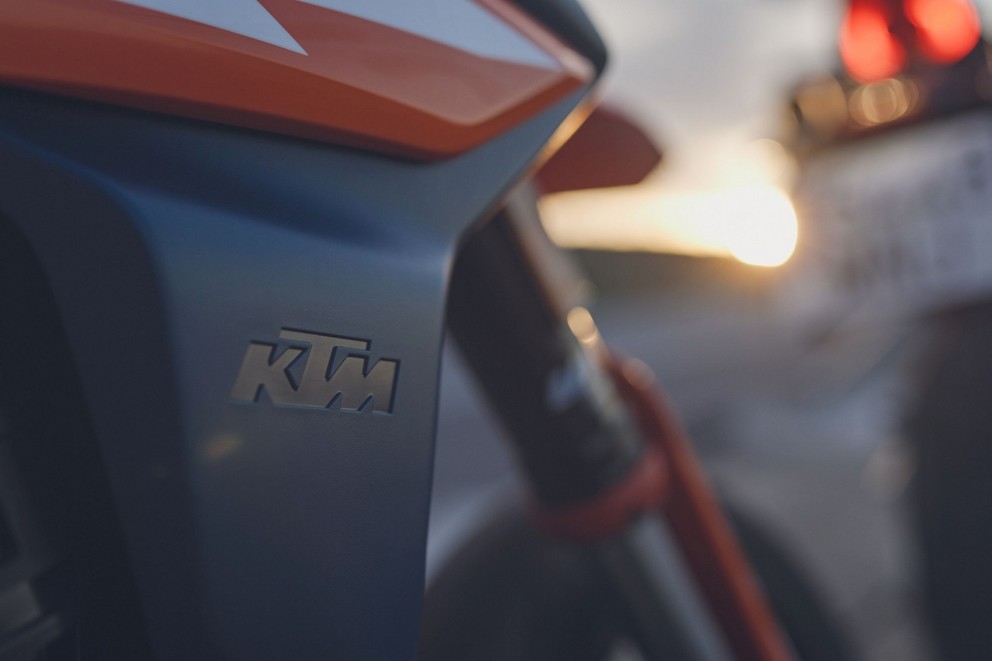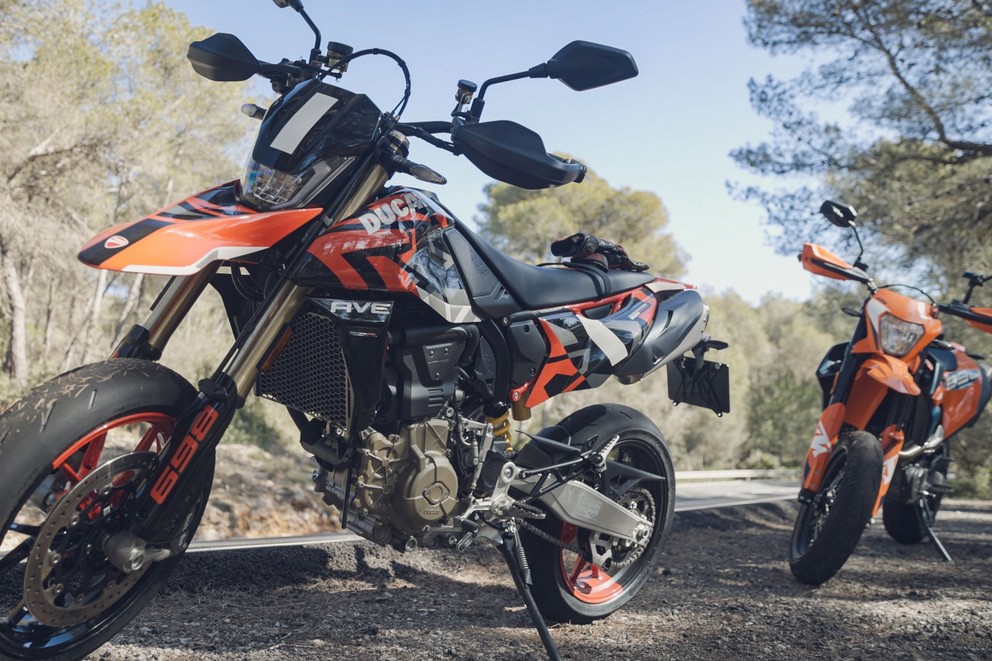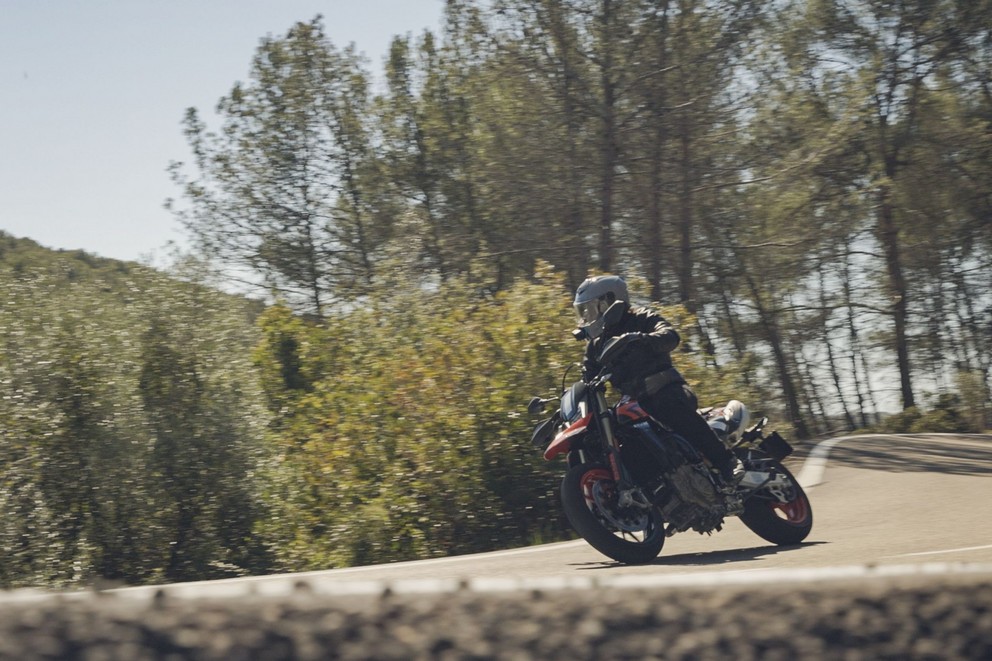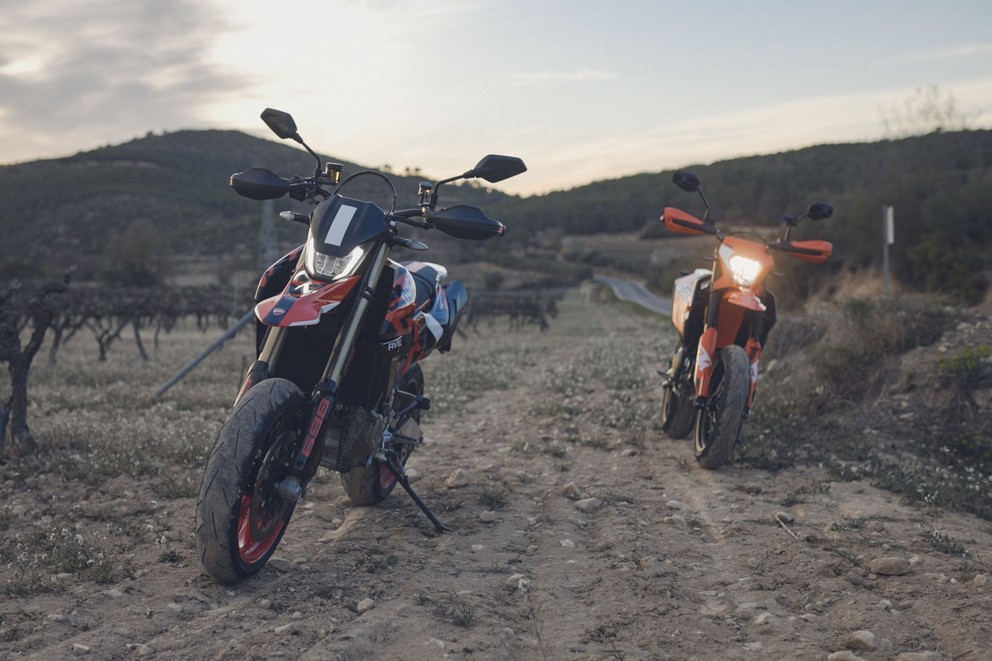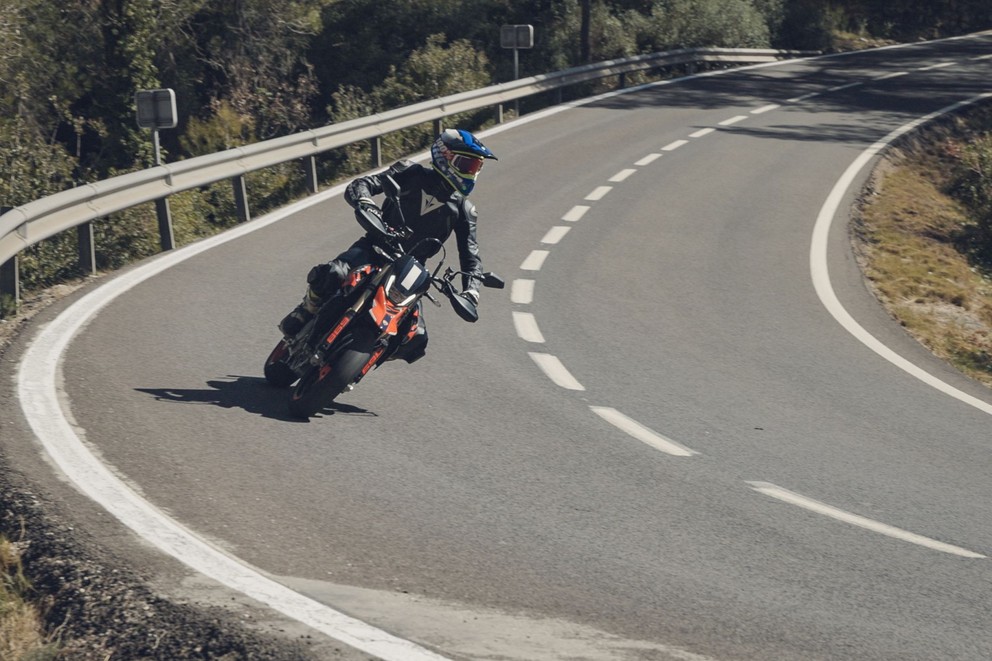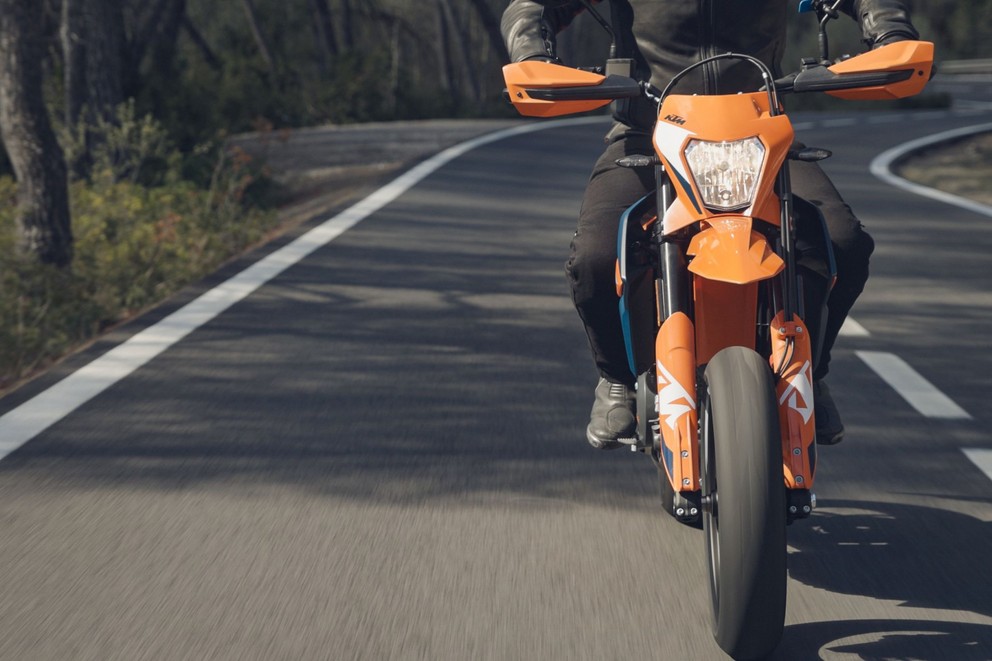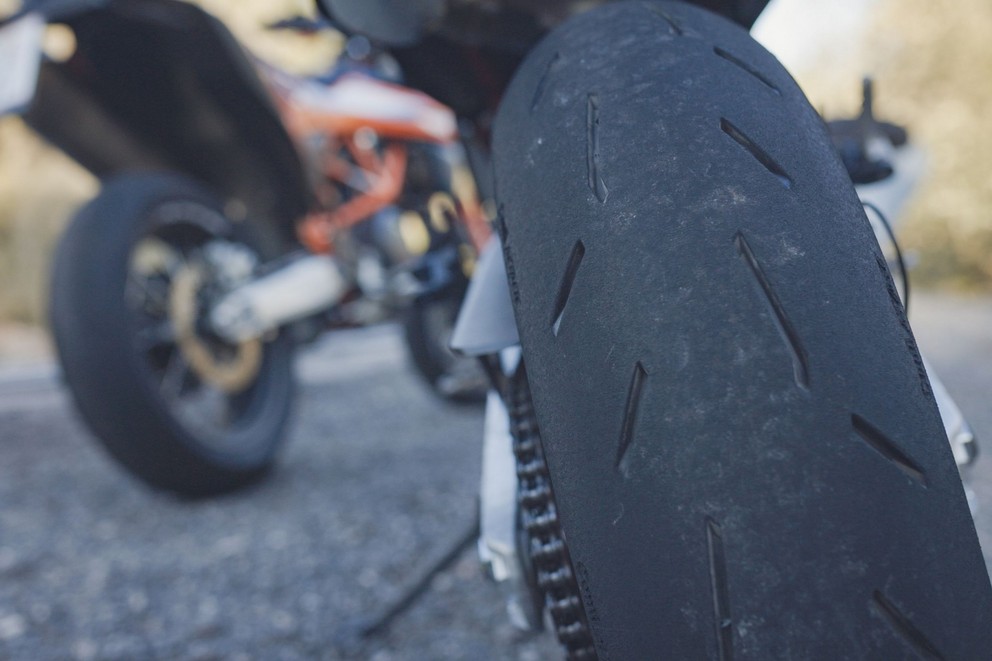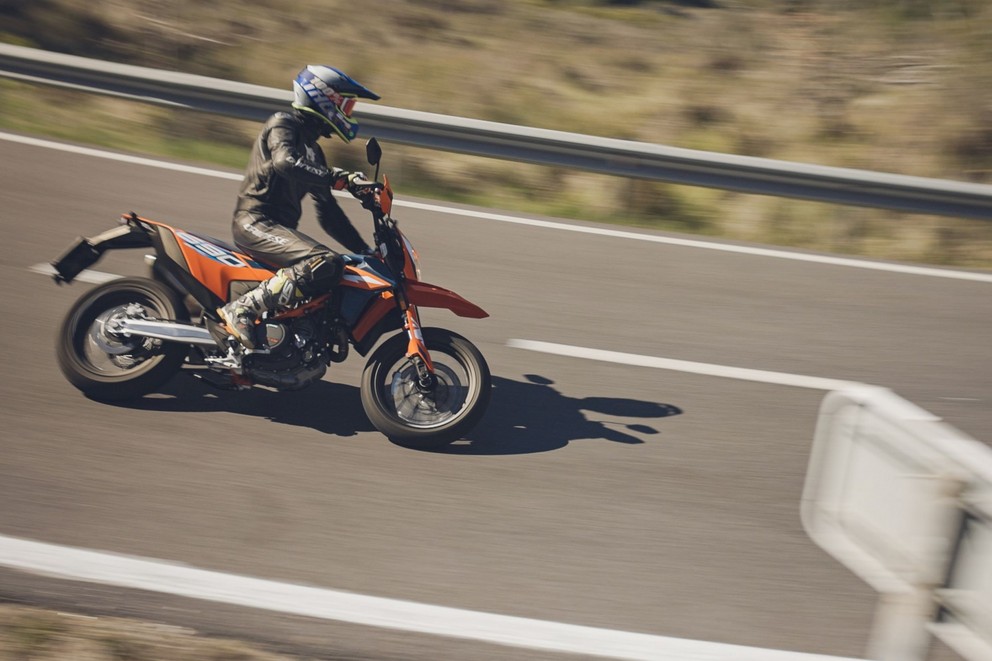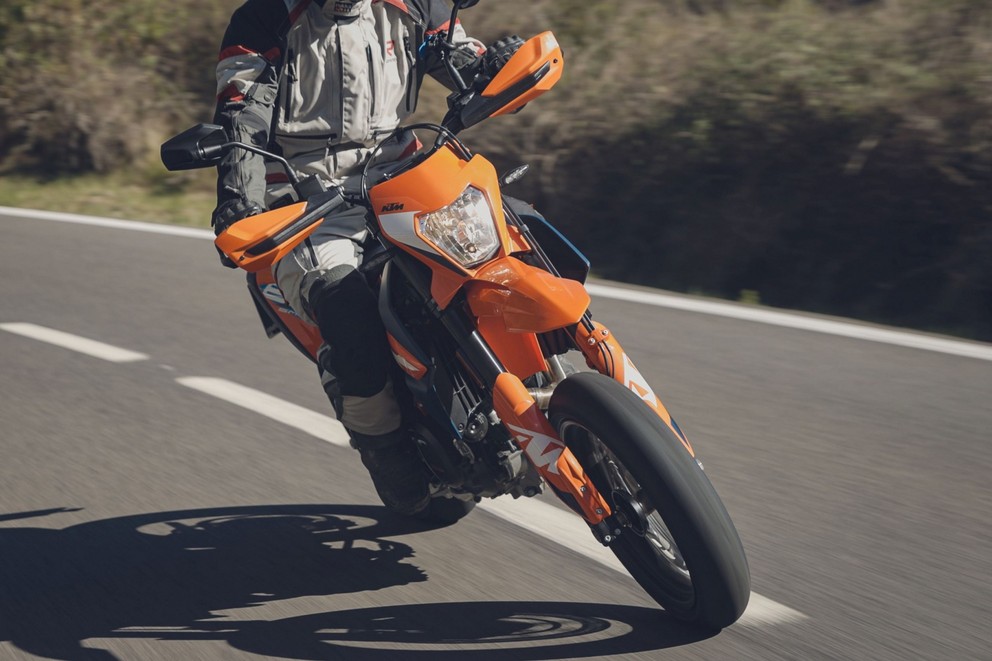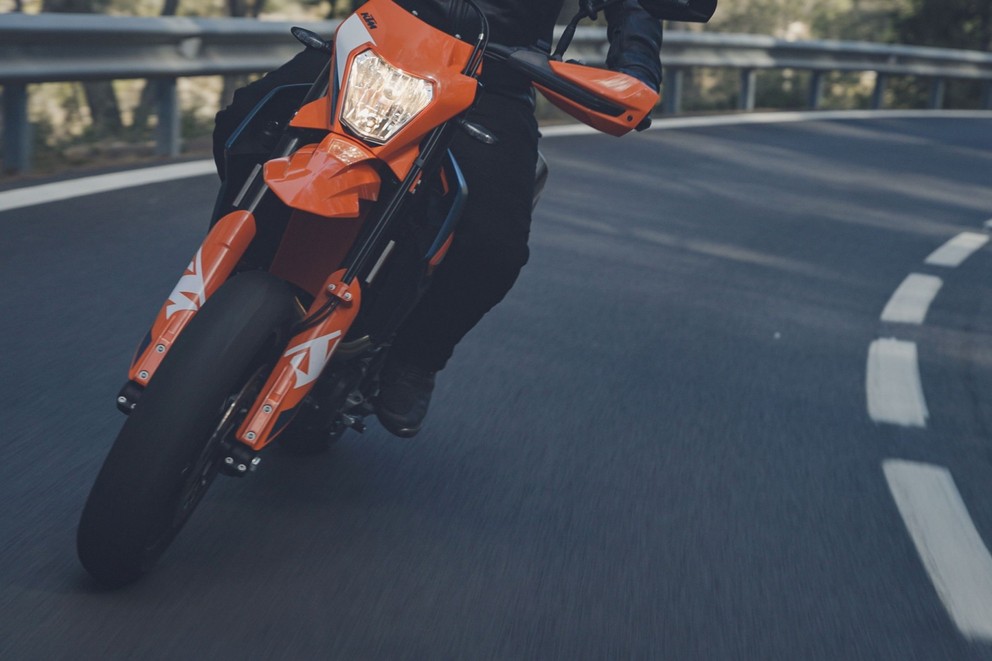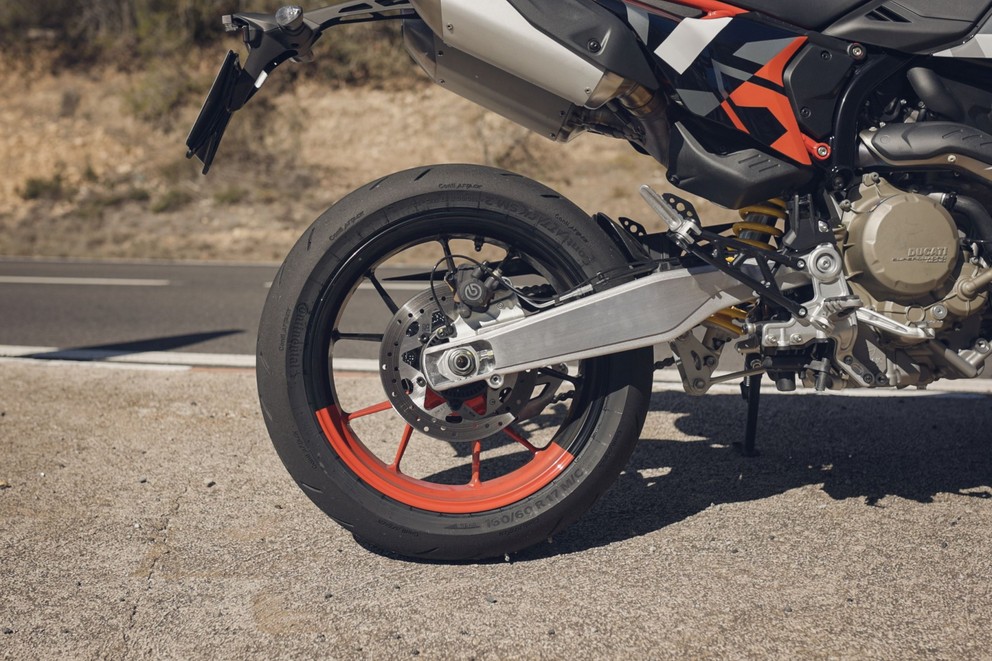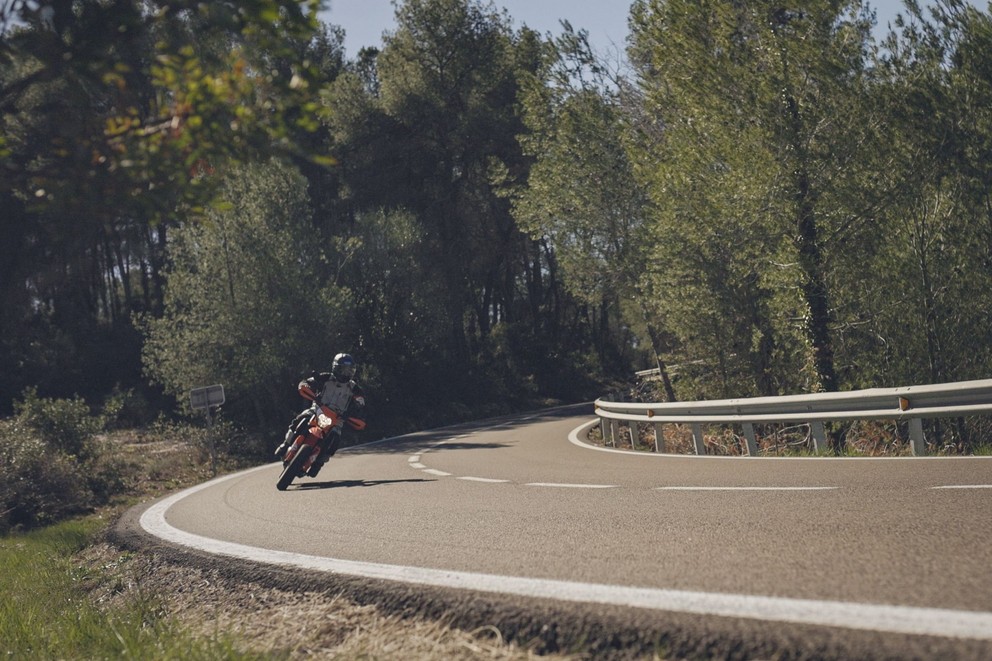The Supermoto Queen title might not sit well with fans of high-legged road racers, considering the variety of models available beyond the KTM 690 SMC-R and the new Ducati Hypermotard 698 Mono. However, these are mostly conversions of enduro bikes or older supermotos. Besides dedicated racing supermotos like the Husqvarna FS 450, the only new options have been the GasGas SM 700, Husqvarna 701 Supermoto, and the KTM 690 SMC-R, which could be seen as the top choice among the three similar siblings. Ducati is now stepping into this KTM-dominated market, aiming to claim the throne with the Hypermotard 698 Mono and the all-new Desmo single cylinder engine, a first for Ducati. Will they succeed?
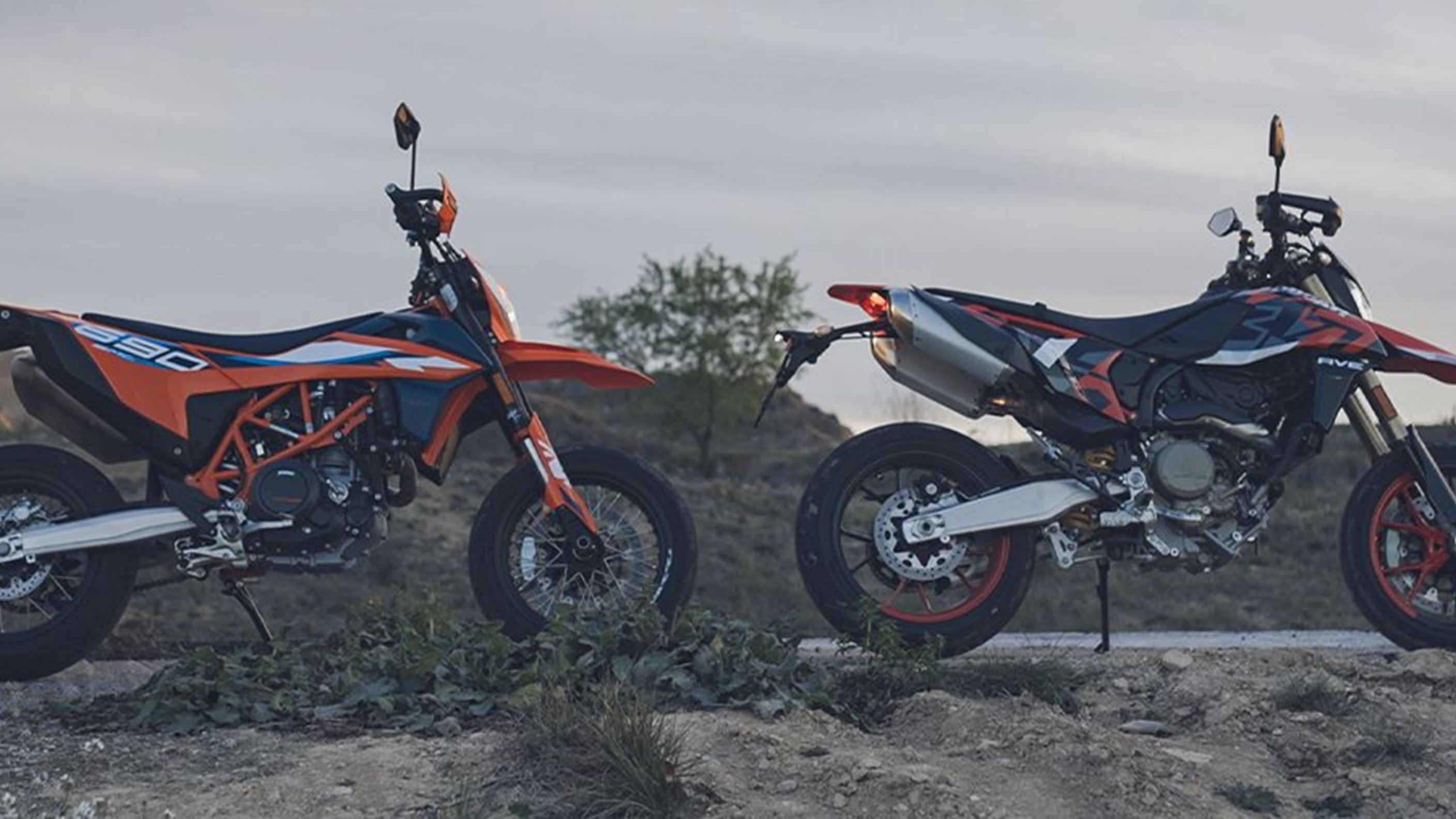
Ducati Hypermotard 698 Mono vs. KTM 690 SMC-R Test & Comparison
Juicy slap for the top dog - Supermoto Duel 2024
It's getting tight for the previous supermoto top dog, the KTM 690 SMC-R. Ducati has launched a hot competitor on the market in 2024 with the Hypermotard 698 Mono. We went to Spain to find out which one can call itself the queen of supermotos this year.
&width=72&height=72&bgcolor=rgba_39_42_44_0&mode=crop)
Gregor
published on 19/04/2024
Technical comparison of the Ducati Hypermotard 698 Mono & KTM 690 SMC-R 2024
Let's dive into the engines of these two supermotos. Both bikes feature single-cylinder engines with four valves. The Ducati utilizes the well-known desmodromic system to control its valves, while the KTM has a displacement of 692 cc compared to the Ducati's slightly smaller 659 cc. In terms of power and torque, the Ducati edges out slightly ahead. It delivers 77.5 hp at 9,750 rpm and 63 Nm of torque at 8,000 rpm, whereas the KTM offers 75 hp at 7,500 rpm and 73.5 Nm of torque at 5,600 rpm. However, the Ducati's power kicks in later, which may pose a challenge in supermoto riding. Both bikes feature high-quality Brembo components with single-disc brakes front and rear. The Ducati boasts larger brake discs at 330 mm front and 245 mm rear, while the KTM has 320 mm front and 240 mm rear. Radially mounted four-piston brake calipers adorn the front of both bikes. In terms of suspension, both models sport long travel of 215 mm front and 240 mm rear, with fully adjustable elements. WP handles the suspension on the KTM, while Ducati opts for Marzocchi for the upside-down fork and Sachs for the monoshock. Both bikes roll on typical supermoto tire sizes, 120/70-17 front and 160/60-17 rear. These lightweight machines stand almost eye to eye, with the KTM at 147 kg dry weight and the Ducati at 151 kg. The KTM does have a larger fuel tank at 13.5 liters compared to the Ducati's 12 liters, evening out the weight difference when fully fueled. On our 1000PS scales, the 690 SMC-R tipped the scales at 161 kg with a full tank. Unfortunately, the new Ducati was not available for testing in our region. But enough about the specs, let's get to the test ride impressions. For the tech-savvy who crave all the details, click here.
Everyday suitability of the Ducati Hypermotard 698 Mono & KTM 690 SMC-R 2024 in comparison
There are numerous skilled supermoto riders who effortlessly perform wheelies, drift around corners, and achieve extreme lean angles with their legs extended - but neither I nor my co-tester Horvath fall into that category. However, this doesn't diminish our ability to evaluate the performance of the two supermotos in other key areas, as we are generalists. Additionally, we were accompanied by an expert who will share his insights later on. Before we delved into the realm of supermotos on the asphalt, we had to navigate our way out of Barcelona, where we had both bikes. The journey out of the bustling metropolitan area also allowed us to assess the practicality of the two supermotos for everyday use. After all, many supermoto riders frequent urban areas and rely on these nimble, lightweight machines for their daily commute.
When riding a Supermoto in the city with numerous traffic lights and frequent stops, having the ability to easily reach the ground is a definite advantage. While the tall seat heights of these Supermotos may seem daunting to riders with shorter legs, in reality, it is not as problematic as one might think. The KTM, in particular, allows for easy ground reach with its slim waist. This streamlined design is largely attributed to the tank being positioned behind the seat. On the other hand, the Ducati, with its tank located behind the handlebars, is not as narrow and has a higher seat height of 904 mm. This may pose a slight challenge for shorter riders on the Italian bike. However, even our shortest colleague Alessio, standing at just under 1.70 m, can handle both bikes effortlessly. The lightweight build of these Supermotos enables easy leaning and supporting the bike with just one leg. Once in motion, both motorcycles provide ample freedom of movement with their long seat benches. The knee angle is sporty yet not overly aggressive, allowing for a comfortably upright and relaxed riding position. The KTM features slightly higher handlebars, along with mirrors positioned higher as well, which can make maneuvering through traffic a bit more challenging due to their height aligning with most vans and small truck side mirrors. Conversely, the Ducati has lower handlebars and mirrors, reducing this issue.
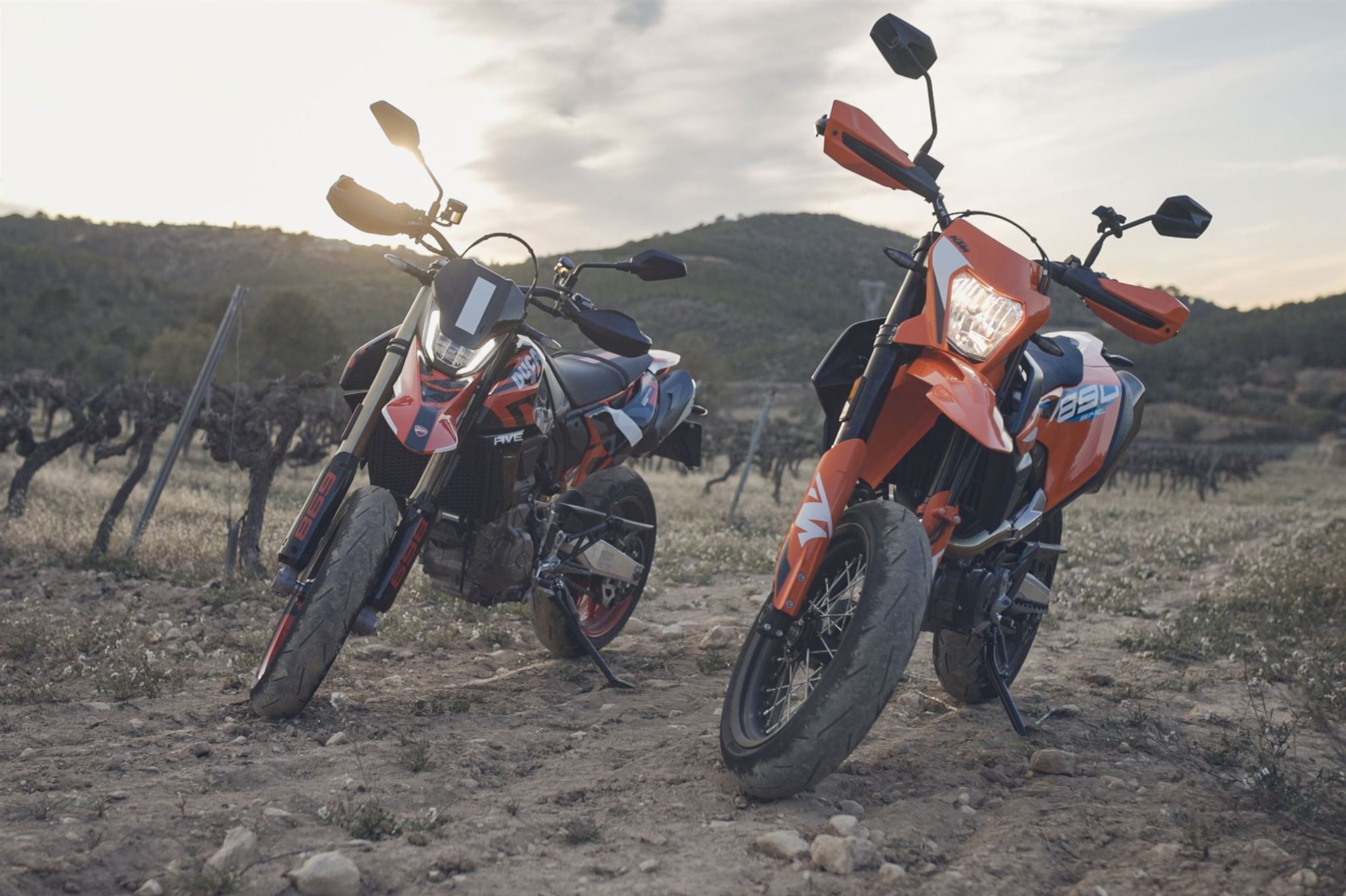
The handlebars and mirrors on the KTM 690 SMC-R go further up. Some may find this more ergonomic, but it also has some minor disadvantages in city traffic.
However, both Supermotos are designed for urban riding. This is not only due to their lightweight and agility, but also to the engine. Both engines accelerate smoothly and cleanly from low RPMs, starting at around 2,500 rpm, thanks to the modern engine management system. In 2024, even such large and powerful single cylinders can effortlessly navigate stop-and-go traffic. The clutches are smooth and finely controllable, the vibrations are noticeable but not bothersome, and the heat development is also kept in check. You may feel some heat on your right leg with the Ducati, as the exhaust manifold runs quite high there. The main challenge in city traffic is actually sticking to the speed limits, as the nimble bikes are quick to exceed the 50 km/h limit with their eager engines. Additionally, the turn signals on both motorcycles are positioned quite low and not easily visible. It's not uncommon for us to find ourselves suddenly hitting 70 km/h after a spirited start at the traffic lights and having to quickly slow down again.
Comfort on the long haul - Ducati Hypermotard 698 Mono versus KTM 690 SMC-R 2024 in test & comparison
The urban jungle is quickly left behind as we hit the main roads and highways, with no easy routes waiting for us right outside of town. This is a common scenario for many riders, highlighting the importance of long-distance capability even for supermotos. Of course, neither of these bikes offer any wind protection. However, at highway speeds, you can shift back on the seat and lean into the wind to conserve energy and cover more ground. The engines handle high speeds with ease, effortlessly reaching 130 km/h. The smooth operation of the single-cylinder engine is impressive, although the KTM does exhibit some high-frequency vibrations in the mid-range. While not overly bothersome, they are noticeable. In contrast, the Ducati vibrates in tune with the single cylinder, creating a more harmonious experience. Both bikes have sporty, firm seats and chassis, but with a key difference. Despite their long suspension travel and light weight, both offer stability. Whether it's rough roads, bumps, or truck-induced turbulence, the SMC-R and Hypermotard remain composed and steady. However, there is a variance in suspension quality over bumps. The WP suspension on the KTM struggles to absorb small bumps as effectively as the Ducati's suspension, which feels more responsive and smoother, thanks to higher-quality components. On the flip side, the KTM excels in fuel efficiency, consuming 4.1 L/100km compared to the Ducati's 4.8 L/100km. Coupled with a larger tank, this gives the KTM a significantly longer range per tank of fuel.
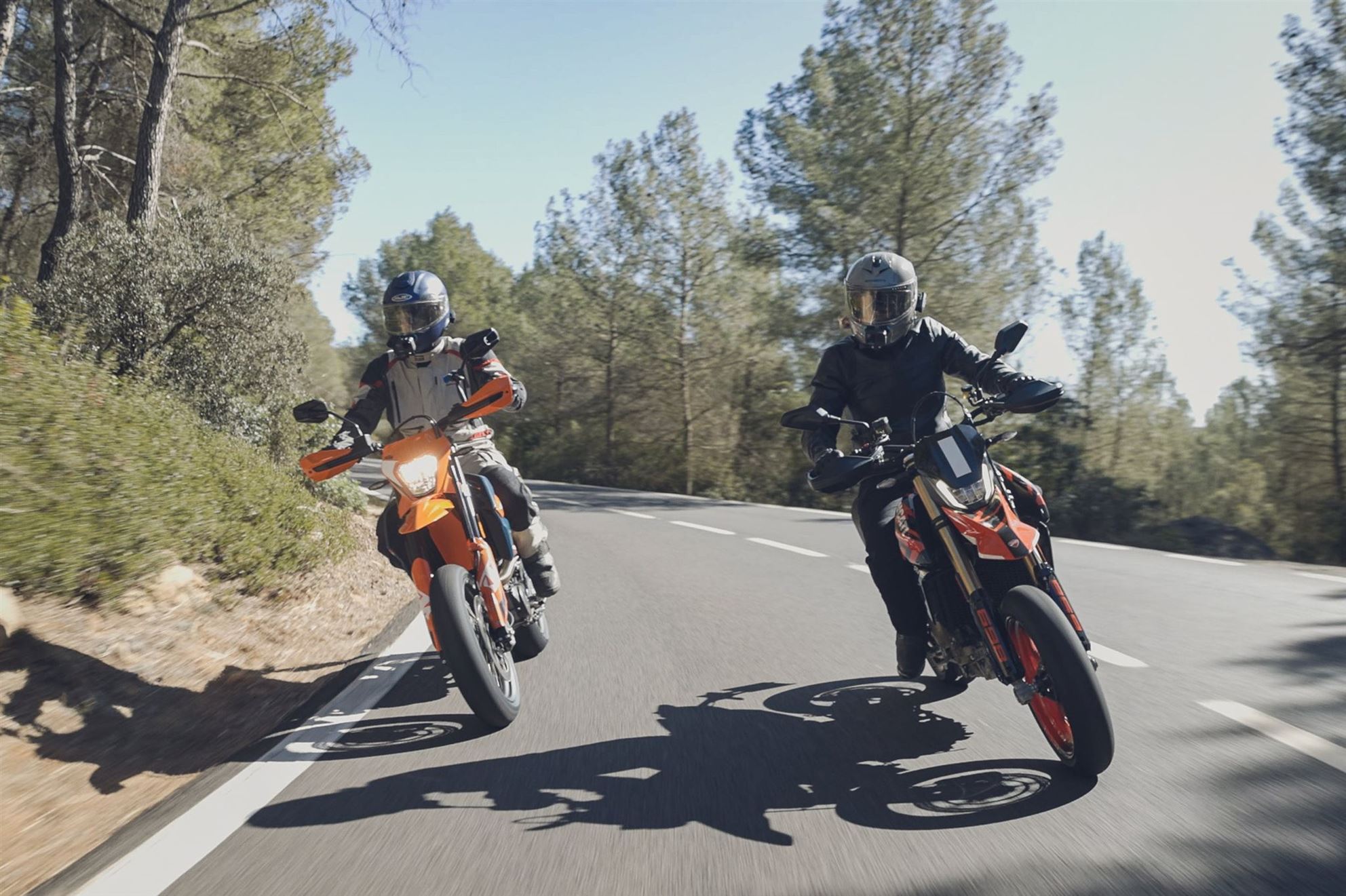
Even on approach stages, you don't have to suffer on the modern supermotos. The Ducati scores with its finely responsive chassis and good vibes, the KTM with its low fuel consumption and stability.
Which wins in the acceleration zone? - Ducati Hypermotard 698 Mono versus KTM 690 SMC-R 2024 in test & comparison
Before we delve into the driving dynamics, let's address the burning question: Who comes out on top in the acceleration department? The KTM not only boasts an extra 10 Nm of torque, but also delivers a maximum of 73.5 Nm to the rear wheel much earlier at 5,600 rpm. Additionally, it is lighter, which should give it an advantage off the line. But does it really? To settle this once and for all, we conducted traction tests. Which bike accelerates quicker from third gear at 50 km/h to 100 km/h and beyond? The results can be viewed in the video linked below. Well, actually, you can't see them, as there was no clear winner. In a standstill start with two equally skilled and heavy riders, the KTM might have a slight edge, but in real-world scenarios, you often accelerate while already in motion, such as exiting a town or a corner. Even after multiple runs and rider changes, the SMC-R and Hypermotard are neck and neck in our traction tests, with only a fraction of a second separating them at the finish line. Therefore, despite what the spec sheet may suggest, these two supermotos are evenly matched in practical terms.
Sporty performance of the Ducati Hypermotard 698 Mono & KTM 690 SMC-R 2024 in test & comparison
We have finally arrived at the Winkelwerk near Olesa de Bonevalls. Here, the EU has covered almost 20 km of the road with an experimental asphalt mixture for testing purposes. This provides racetrack-like grip and makes navigating through the tight bends very quick, inclined, and enjoyable. Both the Ducati Hypermotard 698 Mono and the KTM 690 SMC-R feel right at home here. The flat, elongated seats are fantastic for shifting your weight and maneuvering the lightweight bikes through corners using your body and the wide handlebars. The KTM requires a bit more effort to initiate a turn, but once it does, it leans willingly into the corner, although it may feel slightly twitchy when leaned over, it remains fundamentally stable. The Ducati requires less effort to corner and smoothly powers through the turn when leaning. For this comparison, both bikes were equipped with the new Conti SM 2 tires, specially designed for supermotos, offering extremely agile handling and excellent grip. Therefore, any differences in handling cannot be attributed to the tires. Instead, the likely culprit is the WP suspension, which lacks the high-quality response of the Ducati suspension with its delicate, sensitive spring movements at high lean angles. This is also noticeable when braking into corners. The Marzocchi fork provides clearer feedback, instilling more confidence in the front wheel. Furthermore, the top performer also has to yield in the braking zone. The Ducati's front brake stands out for its sharp bite and precise modulation, delivering impressive deceleration power. While the KTM's brakes, also Brembo products of similar dimensions, can decelerate effectively, they require significantly more manual force, feel less responsive due to the spongy bite point, and lack the same level of precision. Instead of gradually increasing brake pressure like on the Ducati, the brake calipers on the SMC-R bite more aggressively and abruptly, making fine adjustments more challenging.
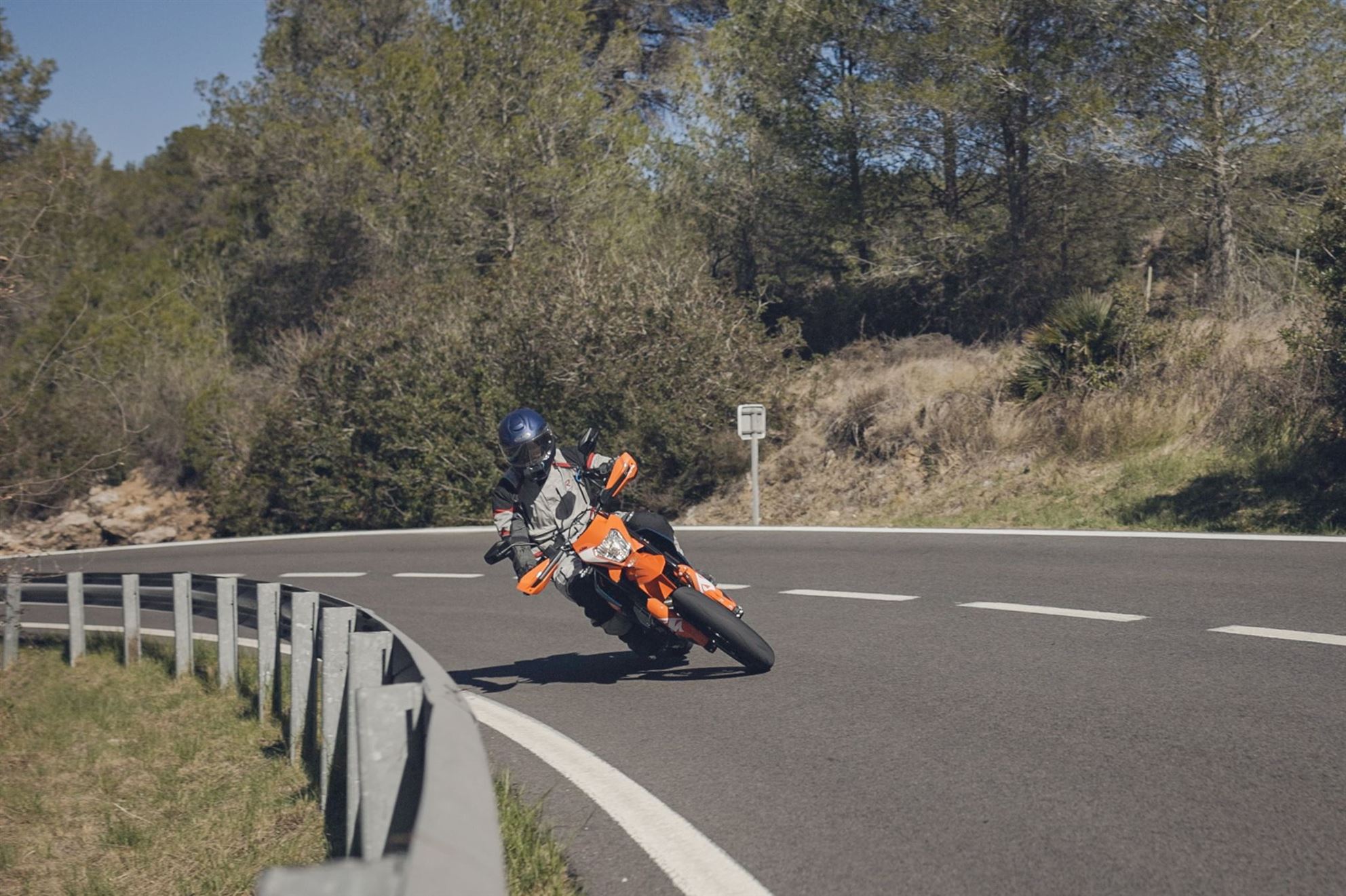
The KTM wags cleanly through the corners, but can't keep up with the Ducati in terms of suspension, brakes and sound.
- How much does a KTM 690 SMC R cost?
- Here you will find an overview of the price level of new and used motorbikes!
Despite the mentioned drawbacks, it is important to clarify that the KTM is not suddenly a poor motorcycle. There is a good reason why it has been the top choice for supermotos so far, as it also demonstrates in tight corners. The single cylinder engine roars, quickly lifts the front wheel, and remains easy to handle. The performance difference indicated on the spec sheet is not noticeable here either. Both single cylinders require some revs to really get going, but then deliver powerfully and dynamically throughout the rev range from around 3,500 rpm. Both the KTM 690 SMC-R and the Ducati Hypermotard 698 Mono put a big smile on our faces under our helmets. The grin on the Ducati may be even wider because it also provides an excellent sound experience. The KTM sounds somewhat metallic, while the Ducati constantly crackles and pops from the twin exhaust system. A real delight in the era of Euro 5+ emission standards. But we supermoto enthusiasts are probably easily thrilled. What does the pro think of the comparison?
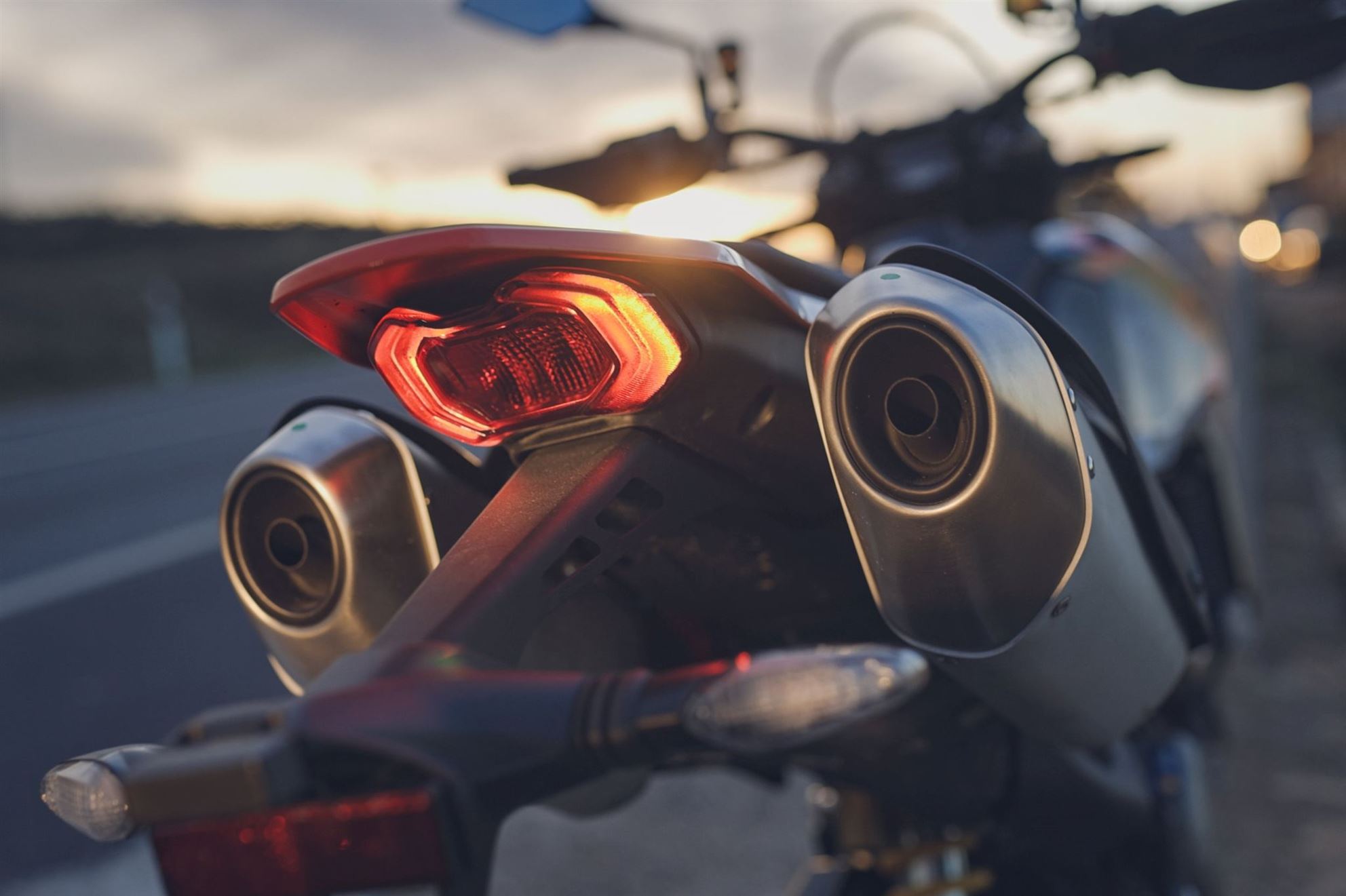
Bangs, sputters & shoots - The superb sound experience on the Hypermotard 698 Mono alone could be a reason to buy for audiophile customers.
Supermoto racer tests Ducati Hypermotard 698 Mono & KTM 690 SMC-R 2024
Raphael Michels, Continental's Product Manager, not only oversees product development but also competes in supermoto racing. The Hessian rider recently joined us in Spain for the initial test of the Conti SM 2 supermoto tires and had the opportunity to test ride two new supermotos. Here is the assessment of a supermoto expert on the comparison between the KTM 690 SMC-R and the Ducati Hypermotard 698 Mono:

Supermoto racer Raphael is impressed by both bikes, but finds the Hypermotard more harmonious overall.
"When it comes to riding, these two supermotos are completely different in my opinion. The KTM offers great stability in terms of handling and braking, while the Ducati has a more consistent turning behavior and is more agile in corners. I would compare the Ducati more to my FS 450 competition bike than the KTM. Performing supermoto maneuvers like wheelies and stoppies is effortless for me on the SMC-R. I also find it easier to handle the electronics on the SMC-R compared to the Ducati. It took me some time to get used to it on the Ducati. The engine performance is a thrilling match between the two. The SMC-R has a slightly rougher running engine, typical of KTM, whereas the Ducati runs very smoothly. Despite the data suggesting the KTM's superiority, it doesn't feel that way when riding. The Ducati accelerates smoothly out of corners and enjoys lifting the rear wheel."
Modern electronics in comparison - Ducati Hypermotard 698 Mono versus KTM 690 SMC-R 2024 test
In 2024, even on minimalist motorcycles like supermotos, the focus is on modern electronic systems. Both bikes come with lean angle-dependent assistance systems, although the KTM has them to a lesser extent. The SMC-R offers two riding modes: a safe mode for the road, where ABS and traction control ensure safety based on lean angle, and a Supermoto mode with a smoother throttle response that disregards lean angle and disables rear wheel ABS. The traction control allows for slippage and wheelies, and can be turned off if desired. These modes are controlled through a separate switch with a backlit display on the handlebars, as the small LC display only provides basic information.
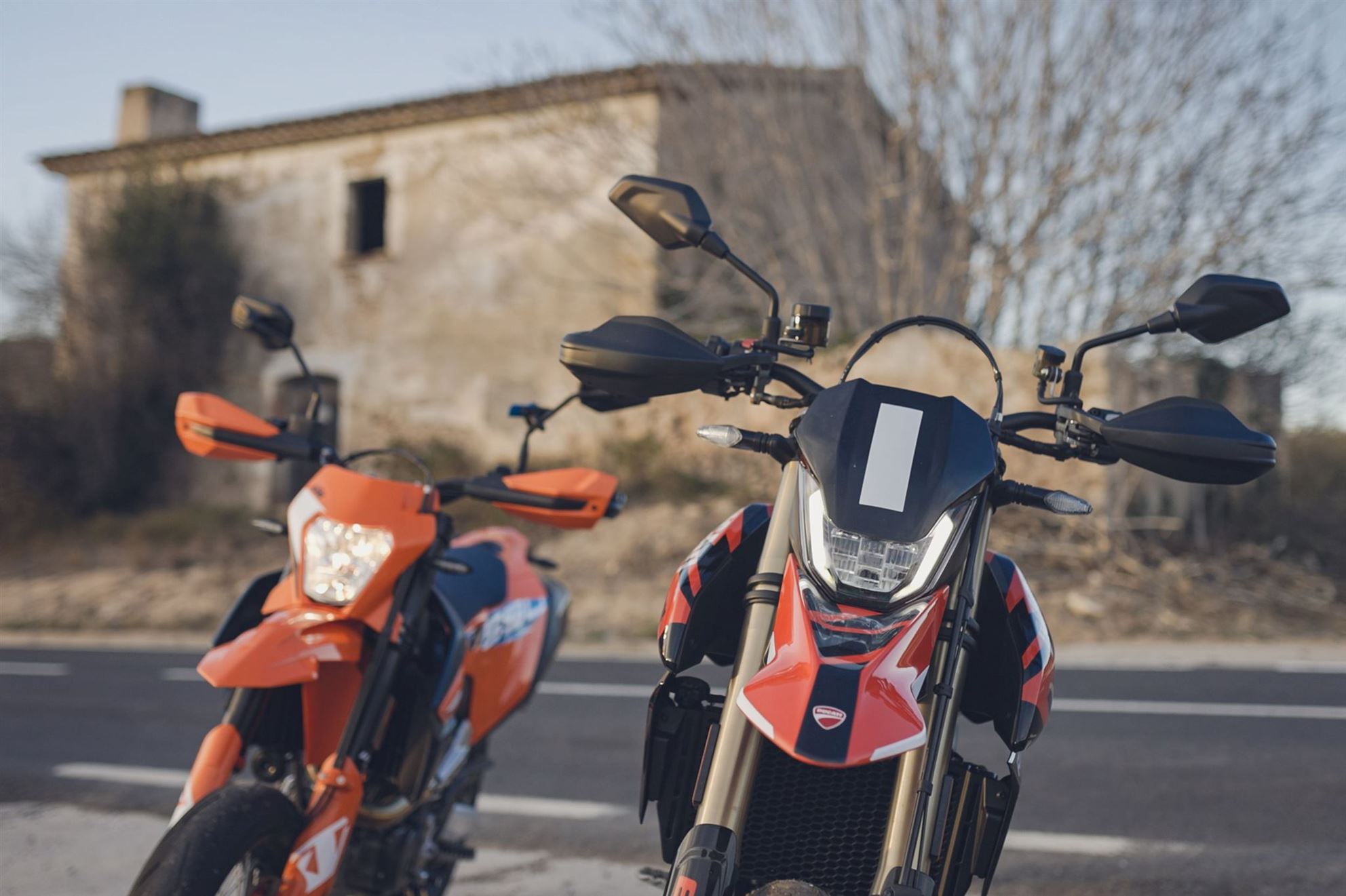
Halogen versus LED - The headlights show that the electronics of the SMC-R are no longer quite up to date.
When compared, the Hypermotard 698 Mono is truly hypermodern. It provides four riding modes (Sport, Road, City, and Wet), allowing for individual adjustment of the 4-stage ABS, three power modes, traction control, engine brake control, and wheelie control in multiple stages. This is achieved through the familiar operating concept found in other Ducati models and the 3.8-inch LC display, which is more aesthetically pleasing than its counterpart on the KTM. The high level of customization not only enables precise settings tailored to the rider's preferences but also bridges the gap between supermoto beginners and experts. Traction control and ABS gradually allow for more slip and slides, allowing even inexperienced riders to experiment and approach supermoto maneuvers. Unlike the KTM, there is no gradual decrease in the safety net of electronics. Both bikes offer fast-shifting, highly functional quickshifters with a blipper function. Shifting is incredibly precise on both, but the tactile feedback from the gearbox and shift lever is much more distinct and accurate on the Hypermotard.
The dominance of KTM in the supermoto segment is evident in the superior electronic systems compared to other brands. The outdated halogen headlight on the SMC-R stands in stark contrast to the modern LED light elements on the Hypermotard 698 Mono, showcasing KTM's technological advantage in the industry.
Price comparison Ducati Hypermotard 698 Mono & KTM 690 SMC-R 2024
In Germany, the KTM 690 SMC-R is facing tough competition. When comparing the different aspects of this supermoto test, it falls short in many areas compared to the new Hypermotard. For the best supermoto value in 2024, the choice is clear: the Hypermotard 698 Mono. The standard version in Germany is priced at €12,390, which is €100 less than the KTM SMC-R priced at €12,499. The RVE version of the Hypermotard, featuring a stylish design and quickshifter as standard, costs €13,390. In Austria, the decision is more complex due to the price advantage of the KTM thanks to the NoVA. With lower fuel consumption, the SMC-R is only subject to 10% NoVA, while the Ducati faces 15%. This results in the 690 SMC-R costing €13,549, the Ducati Hypermotard 698 Mono €14,595, and the RVE-Hypermotard €15,595. As a buyer, the challenge lies in determining whether the advantages of the Ducati justify the higher price. Check out the Swiss prices for KTM 690 SMC-R and Ducati Hypermotard 698 Mono here.
Conclusion on the comparison test of the Ducati Hypermotard 698 Mono & KTM 690 SMC-R 2024
The KTM 690 SMC-R remains a top choice in the supermoto category, boasting nimble handling and a powerful engine. However, over the years, it has faced tough competition, particularly from the Ducati Hypermotard 698 Mono. Despite similar engine performance, the Hypermotard 698 Mono outshines the KTM in terms of chassis, brakes, sound, gearbox, and electronics. While the KTM offers a wide range of accessories and customization options, it is also more affordable, at least in Austria. Choosing between the 690 SMC-R and the Hypermotard 698 Mono is no easy task, but KTM may need to step up its game in response to Ducati's impressive offering. Riders can expect exciting showdowns between these two supermotos in the future.
- How much does a Ducati Hypermotard 698 Mono cost?
- Here you will find an overview of the price level of new and used motorbikes!
&width=60&height=60&bgcolor=rgba_39_42_44_0&mode=crop)
KTM 690 SMC R 2024 - Experiences and Expert Review
Gregor
A large, powerful single cylinder, a sturdy chassis, just over 160 kg of tractive weight and modern electronics for support - the key data alone suggests a lot of riding fun. In 2024, the SMC-R may be a little dusty in some respects and is no longer the undisputed queen of road-legal supermotos, but it can still offer a lot of supermoto fun and performance.
&width=60&height=60&bgcolor=rgba_39_42_44_0&mode=crop)
Ducati Hypermotard 698 Mono 2024 - Experiences and Expert Review
Gregor
With the Hypermotard 698 Mono, Ducati has produced an incredibly good debut model! The bike takes all the qualities you look for in a road-legal supermoto and raises them to a highly modern and sophisticated level. You won't find a comparable single-cylinder engine these days, while the electronics package rounds off the concept. Nevertheless, it looks pure, unreasonable and playful - like a real hooligan bike.
Ducati Hypermotard 698 Mono vs. KTM 690 SMC-R Test & Comparison Images
Source: 1000PS
